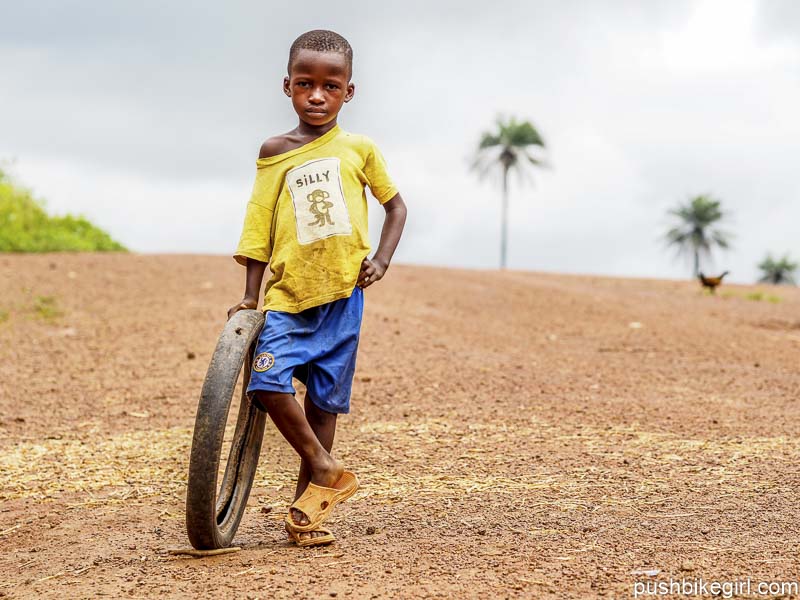
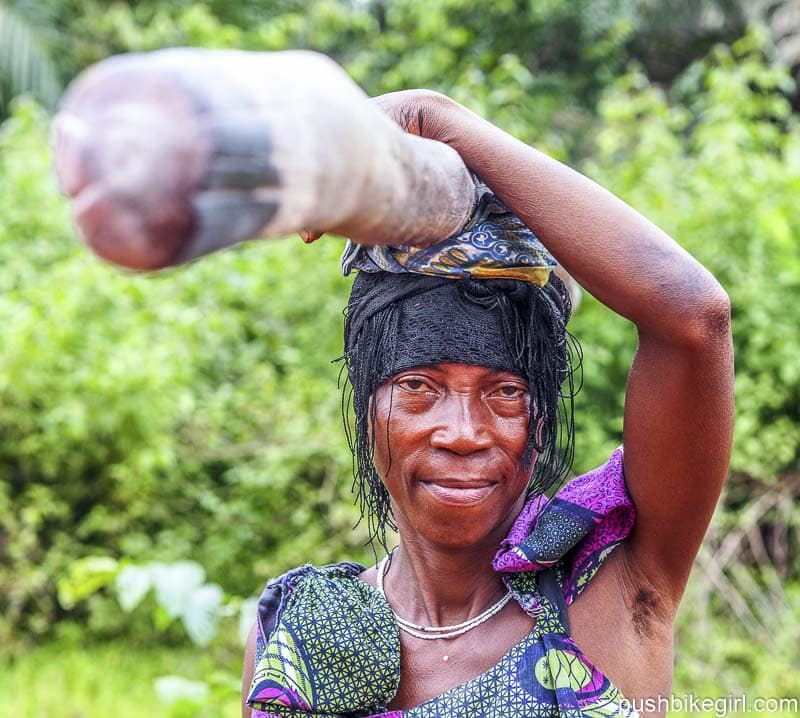
To act for oneself:
How do I write about such a poverty-stricken country? How can I report objectively about a country without stepping on the toes of the local population and treating them unfairly?
They are people who became dear to my heart.
I don’t want to be criticized for telling the truth about my personal experiences, and yet, I know that such criticism could only come from people who were never in my shoes themselves.
Writing about Africa is a very sensitive issue. West Africa is a part of the world that is rarely visited and few people know anything about it. It is a corner of the world that makes me feel sometimes like I shouldn’t even write at all about what I have experienced
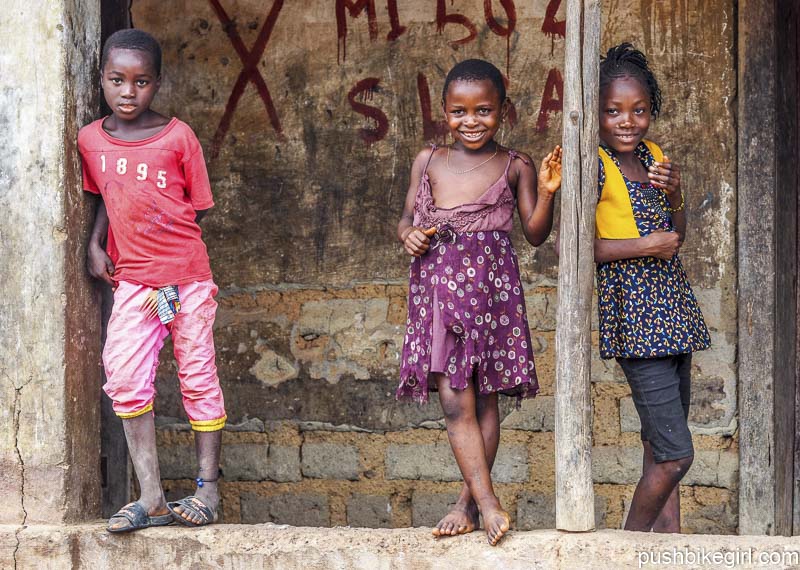
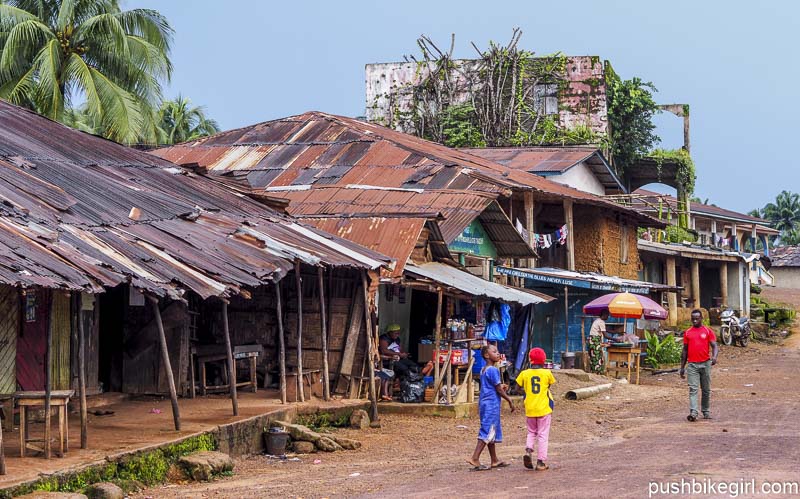
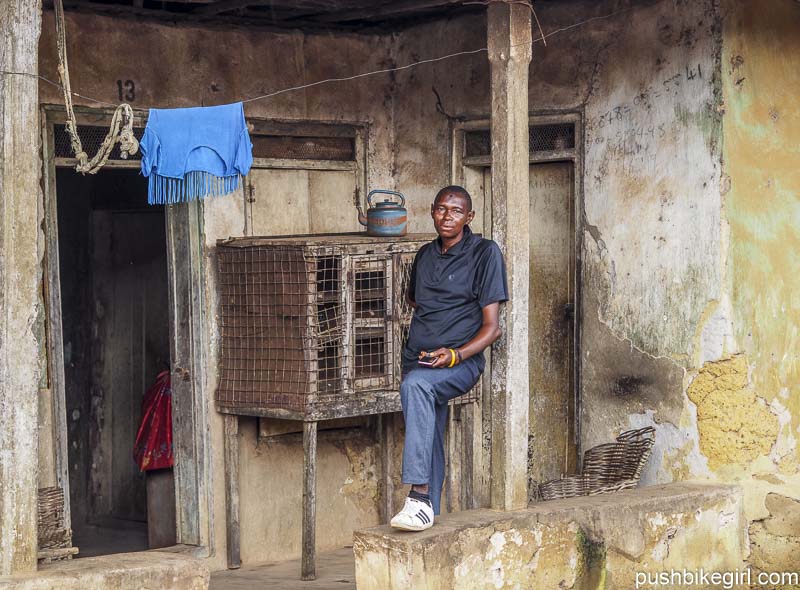
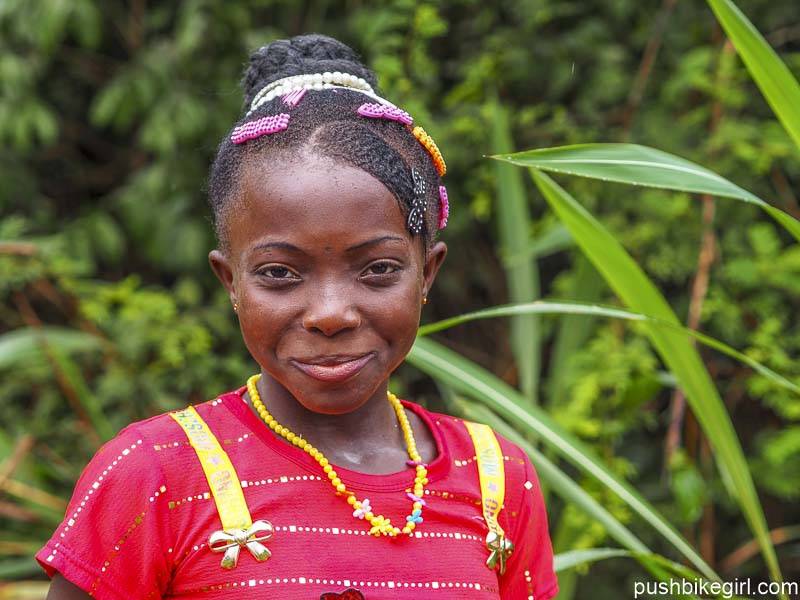
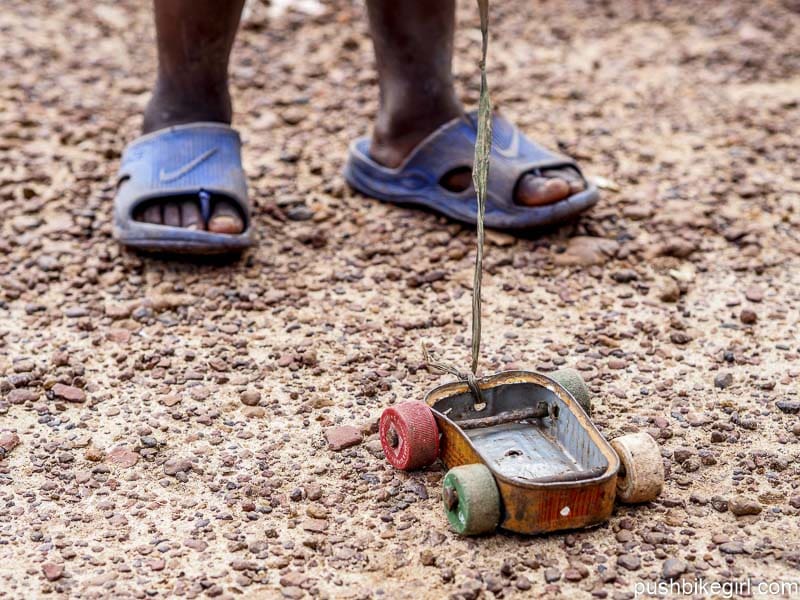
There are people, especially on social media, who somehow feel attacked, know-it-alls who feel obligated to spout their opinion, even though they have never been there themselves. And if they have been there, then most likely in the better-developed areas of those countries where only tourists go.
There is also the radical difference between the typical tourist visitor, how long you’ve been on the road and how you were traveling. Riding a bicycle is far different from riding in a safari jeep. And the impressions are completely different for people who arrive there, relaxed and well-fed from Europe, who then return home again after three weeks.
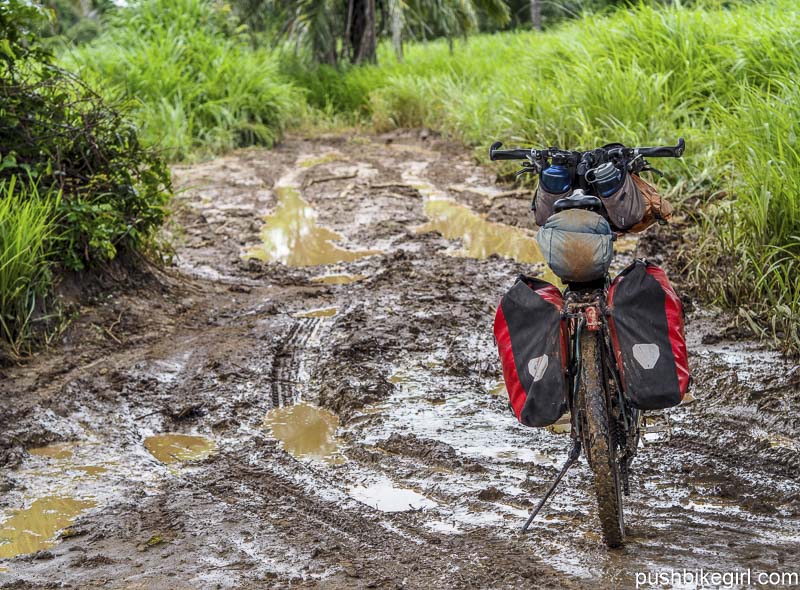
Of course, I also have only a little insight as to what people go through here every day and what goes through their minds. I can only watch and try to understand them.
One thing is clear. West Africa is extremely complex and difficult to grasp.
There are Africans who called me a “white savior” and there are Westerners who unfairly read racism into my lines. And there are others who think I am taking advantage of the locals and their generosity to travel cheaply.
Unfortunately, there are radical right-wing websites that linked my reports on their pages and use them to support their twisted racist arguments. However, that is quite the opposite of what I want to achieve when I write about my travels.
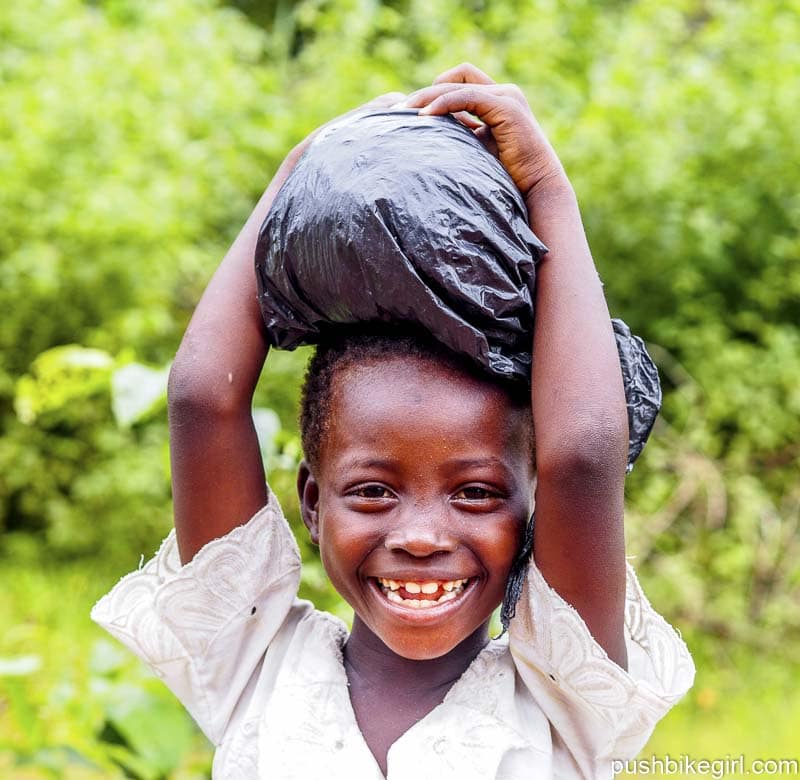
That makes it incredibly difficult for me to formulate my thoughts in such a way that I don’t hurt anyone and still present the world with a fair picture of what I have experienced and seen.
In many travel reports, including those from long-term travelers, I usually only find information about their positive experiences. Few seem to dare to convey a true picture because negative articles are simply much more difficult to write.
Who wants to read about how poor and chaotic things are in some regions of the world? And which writers want to have to justify themselves and reap criticism from their readers?
And more importantly, who wants to admit that they had difficulties with the local conditions and chose to travel in a region that not only provides colorful pictures, fun and great landscapes.
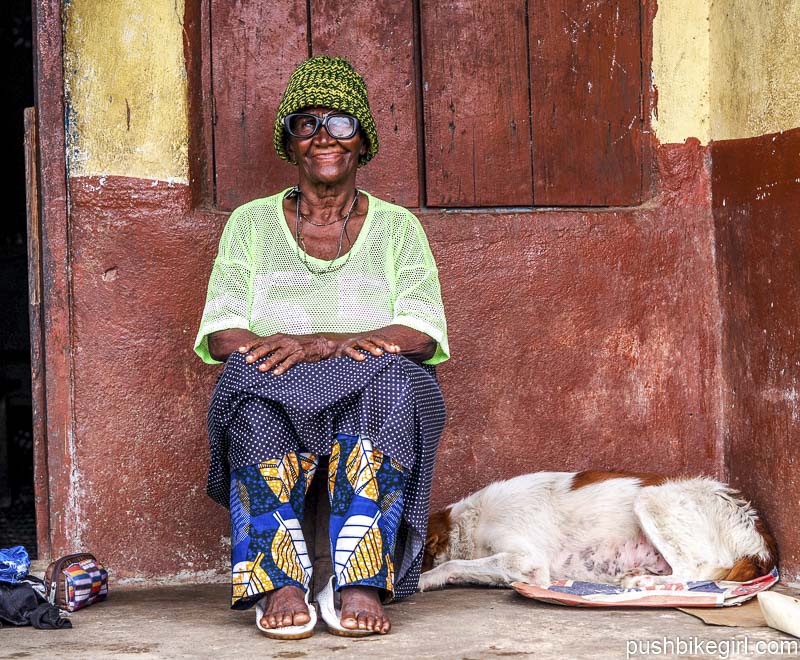
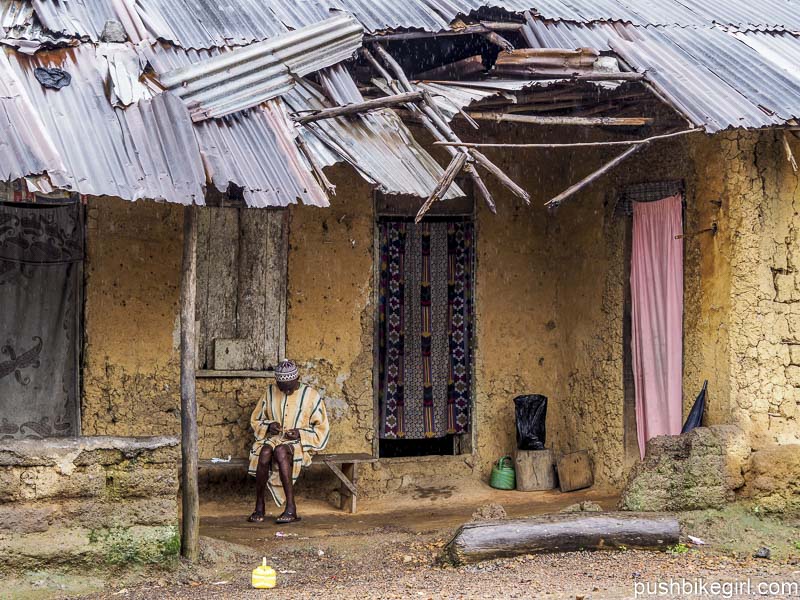
I decided to stay true to myself and to portray the countries as I experienced them. West Africa is a world that got under my skin, a world that I didn’t expect.
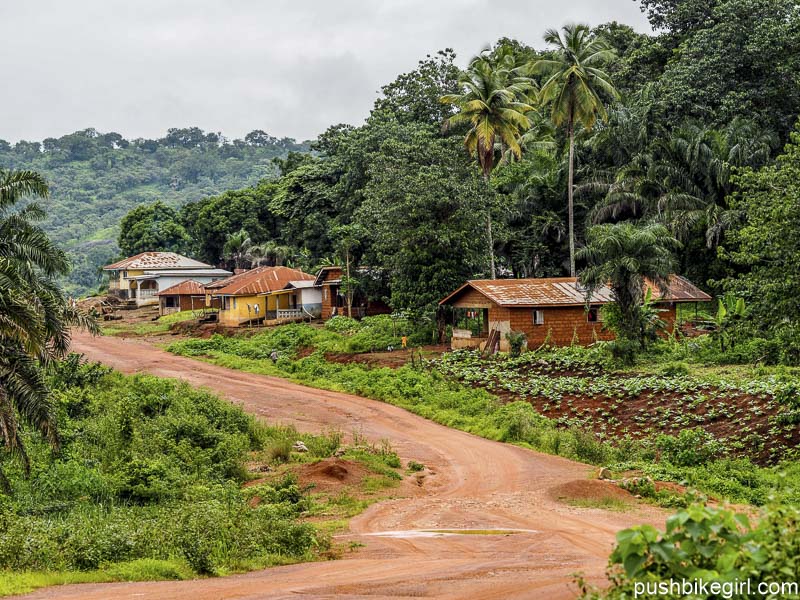
By the way, what I read and hear again and again is the word “Africa”. And with “Africa” the whole continent is presented as a single “country”. Not everyone seems to realize that Africa consists of 54 countries and is a huge, multifaceted continent.
That is especially significant since the southern regions of Africa and parts of East Africa have developed very differently than West and Central Africa.
There is a huge difference if you only visit the main streets of a city or take your time and go out into the very remote areas. The secluded corners of West Africa are by far the most exhausting I have ever experienced on my travels on a bicycle.
The monsoon made it even worse, and traveling alone here makes the trip all the more difficult.
But now, let’s talk about Sierra Leone itself.
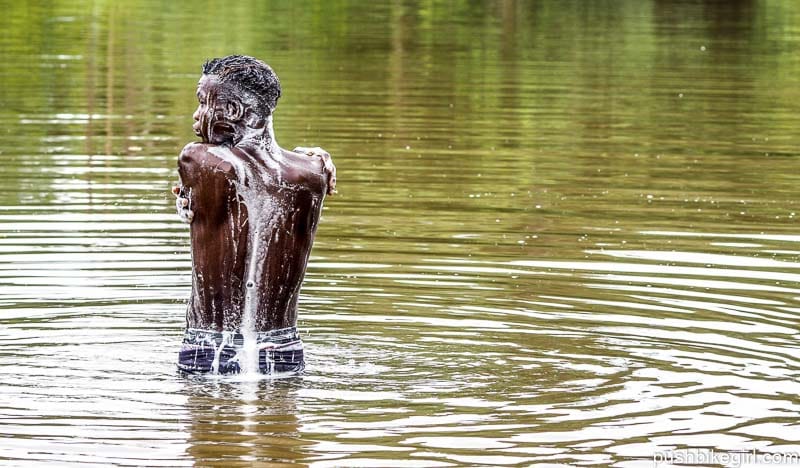
At the remote border post in Madina-Oula, (MAP) I had, as always, no problems. My online visa was accepted without hesitation by the officials who welcomed me in a very friendly manner.
Sierra Leone was once a British colony. In recent years the country has been traumatized by civil war and outbreaks of Ebola.
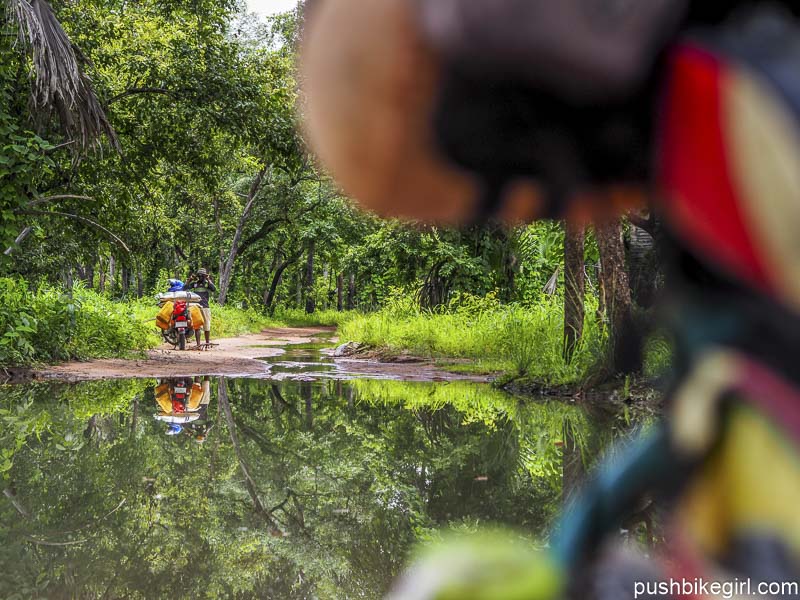
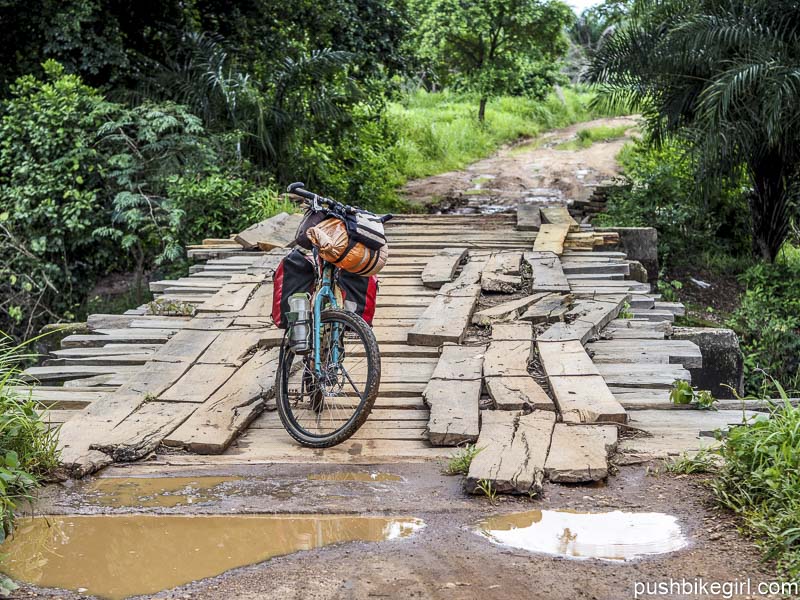
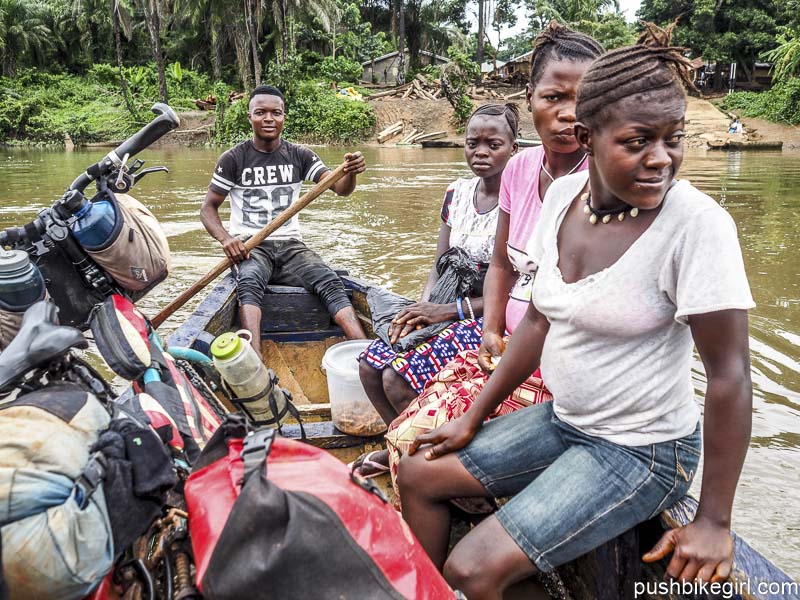
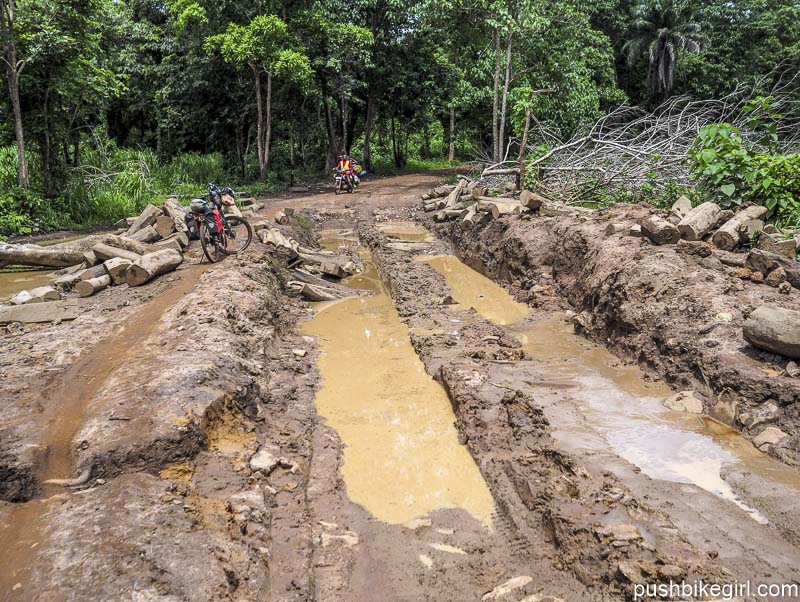
In the first village, I met Mohammed, a studied young man from the capital Freetown, who was visiting his family. It was one of the very few conversations I was able to have with locals in Sierra Leone.
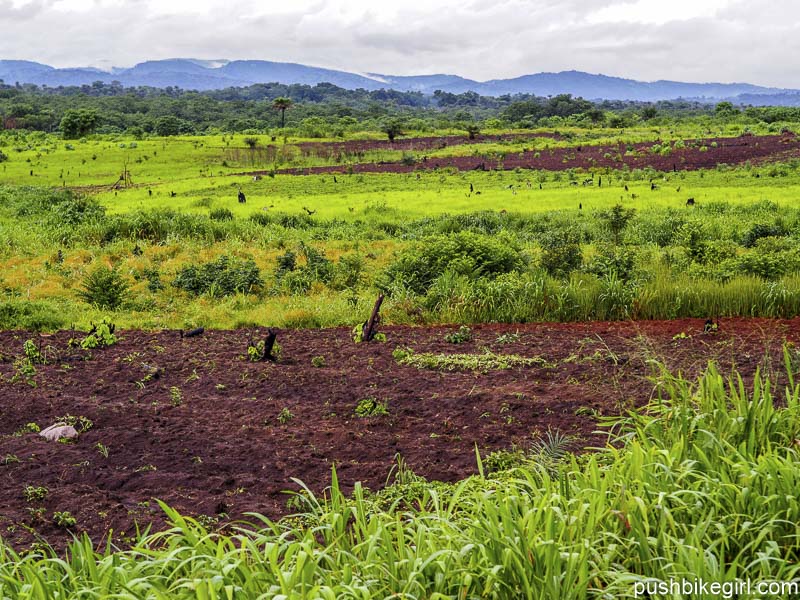
“We are poor, very poor. During the rainy season, our village is cut off from the outside world. The road is so bad that there is no more trading of goods, we don’t have much except rice.
Our district leader has 11 women and 32 children. Many men have several wives because there are many more women than men in the world. But we have no work. It is difficult to sit around all day and do nothing. Time does not pass. When we buy rice, we buy it on credit and hope to pay back the money next year or even the year after next.
Malaria is a big problem, but the government pays for medicines for every child and every pregnant woman. In almost every village there is a small clinic. If we have just recovered from a malaria disease, we soon fall ill again. It is really bad.”
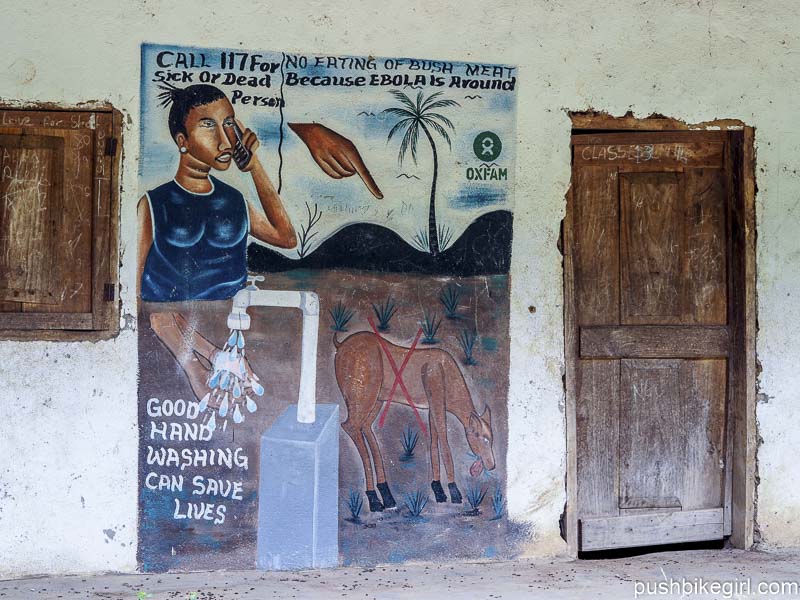
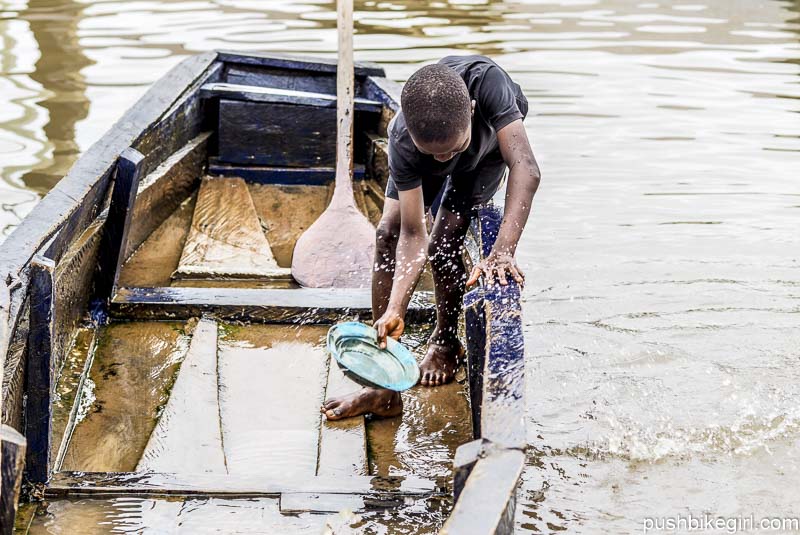
The village chief and elders welcomed me warmly, as did everyone else in this Muslim area. As usual, I slept in the school.
The roads were a disaster, with August being the rainiest month in Sierra Leone, exactly the month I arrived. Rainfall in August can be as much as 800mm, which is more than Germany gets in a whole year. So, it rained almost non-stop, although it would be better to say it poured non-stop.
The main reason for riding to this remote area was to visit the Outamba Kilimi National Park.
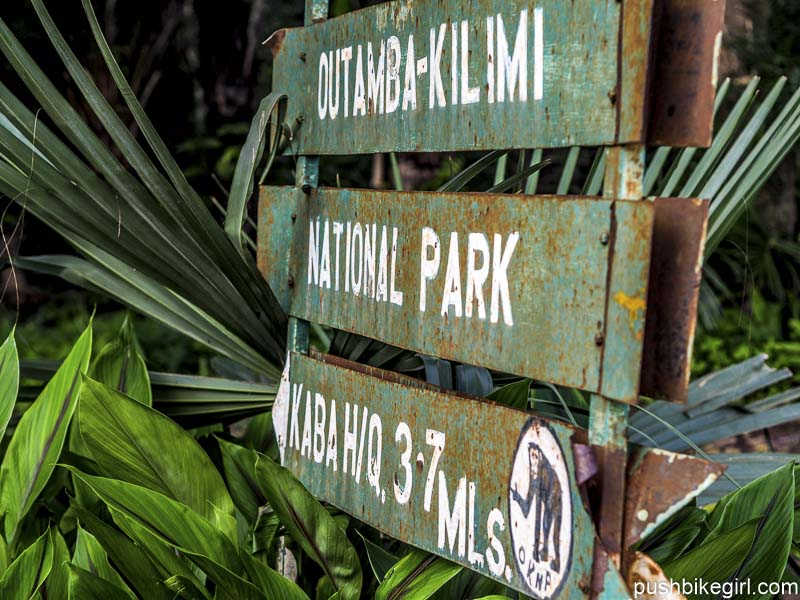
Having been built with American foreign aid, the park facilities were elaborate for this out of the way place but had definitely seen better days. In the jungle nearby chainsaws roared, the valuable tropical wood was headed for China according to the locals.
Like so many other things, the water pump at the ranger station was broken, only rainwater was provided in a lidless bucket in front of the office. No doubt the cats, monkeys, and birds roaming the station drank from the bucket from which I was forced to fill my bottles.
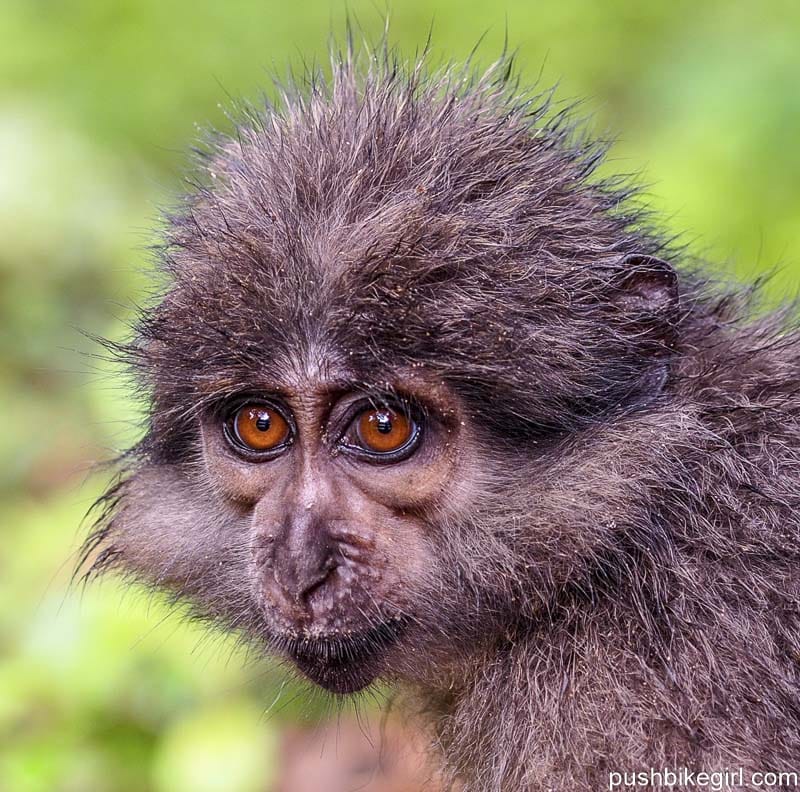
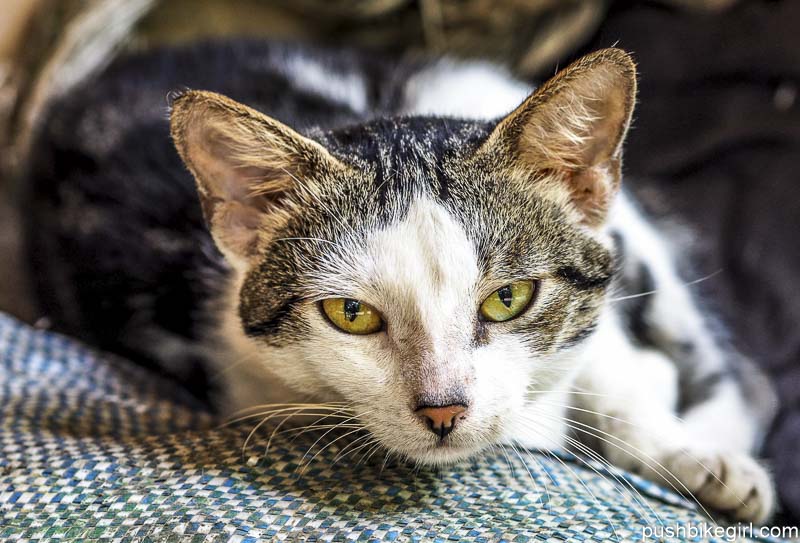
Soon after arriving, I offered to pay for food; if one of the rangers would go and buy some, they seemed to have already taken this for granted and lethargically accepted. While one ranger went back to sleep in front of the office, the other walked to the next village where he bought what was available, rice, tomato paste, and a tin of sardines.
It was at this point, sharing this meager meal with these two rangers that I realized how very hungry they were, my food began to stick in my throat, and my appetite vanished. But offering them my share was of no avail, they both refused vehemently.
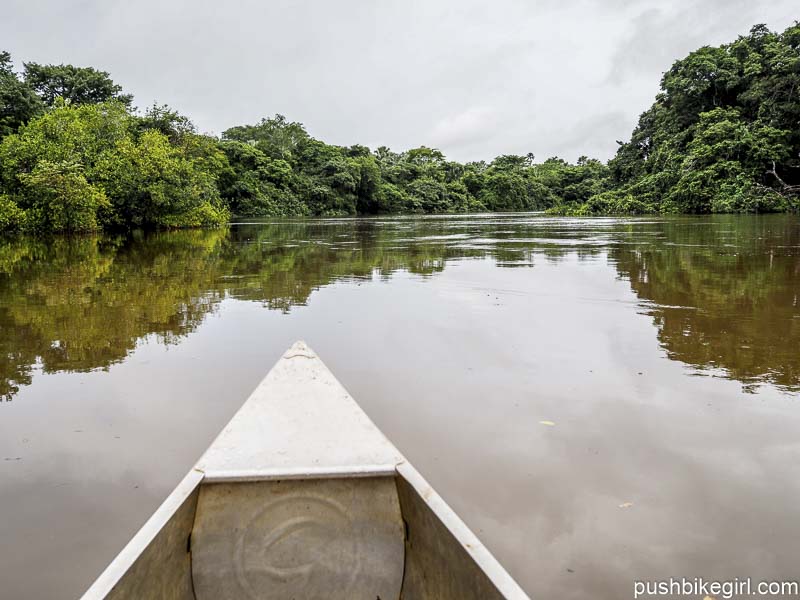
Having eaten it seemed their needs and interests in the day had been met, leaving me with the impression they had no interest in showing me the park. On par for the day, I soon found myself also paddling the canoe on our way out to find hippos, something which isn’t usually asked from a paying tourist but of course, I didn’t mind.
My ranger guide seemed to have had no connection or interest in the nature and animals around him, and he would have loved to have turned around after five minutes.
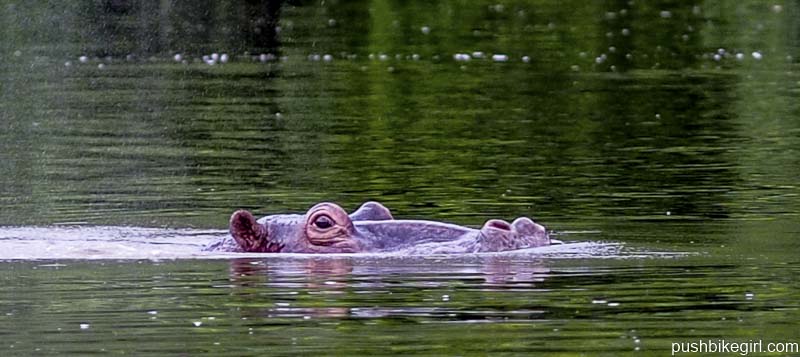
The so-called “walking safari” was a run through high grass, never stopping to look at anything, it became apparent I was keeping him from his afternoon nap back at the station.
Of course, it had been great to see the hippos up close, but the circumstances had been anything but positive — nothing I would expect of a national park.
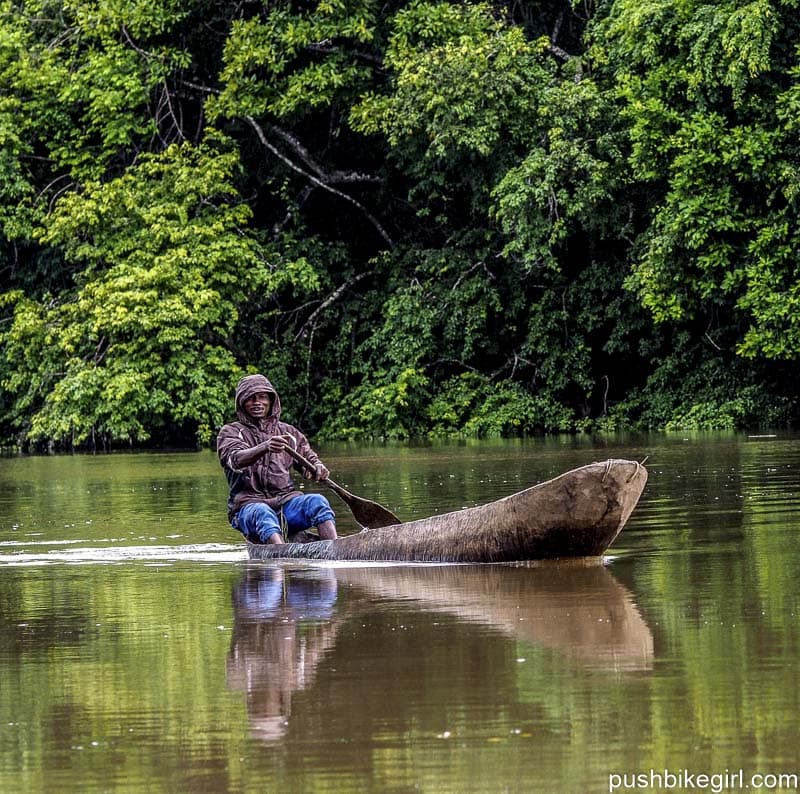
When I asked them how they imagine their future when the trees are all in China, and the facilities have fallen to the ground, they only answered: “Only God can help us.”
It seems to be all about where to get something to eat today and how to get through the day? But also, how can they get the best out of it with the least amount of effort? And tomorrow? I don’t think anyone here thinks about tomorrow.
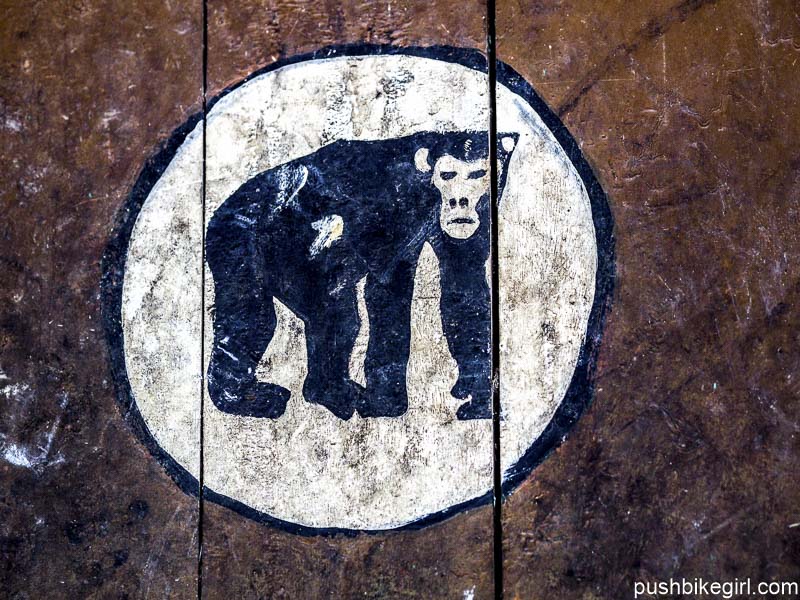
Here were extravagantly built facilities, financed by Americans, who certainly thought once their dollars had worked their magic and facilities were in place, man & nature alike would benefit, but this place seemed to be a perfect example of failure.
Americans who donated their money to help others and end up not seeing what was done with it.
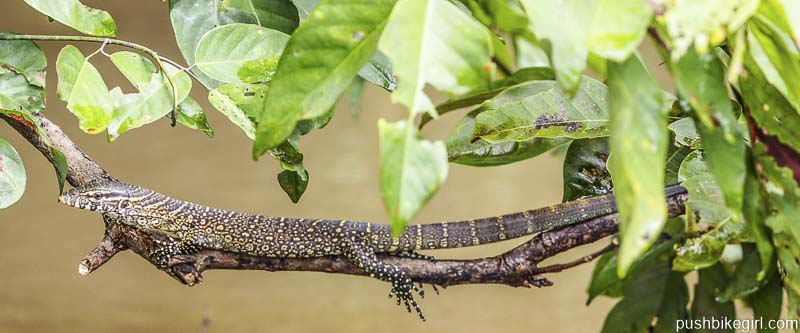
We Westerners always seem to forget that in such regions, world views, life structures and circumstances universes away from ours dominate. Just building a few facilities, and then it will work is the wrong approach. It does not work.
But what is the right way? Many came to help; few seem to have been successful. I don’t have solutions myself, and I admire those who try to achieve something here, and I also have understanding and sympathy for those who have left frustrated
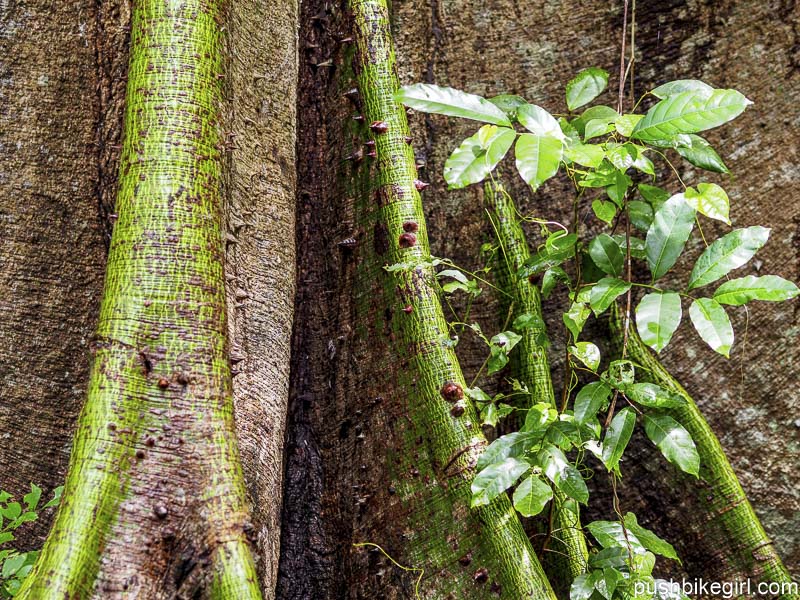
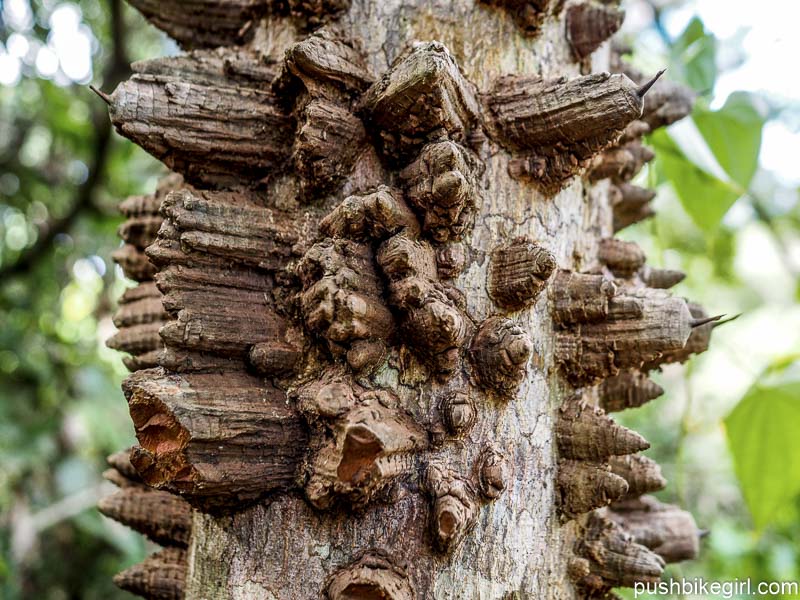
Schools are also being built everywhere. Many of them with foreign aid, but there seem to be few skilled teachers teaching. Either because they are extremely poorly paid or because nobody checks whether they come to class at all. So why does someone build a school and not provide capable teachers?
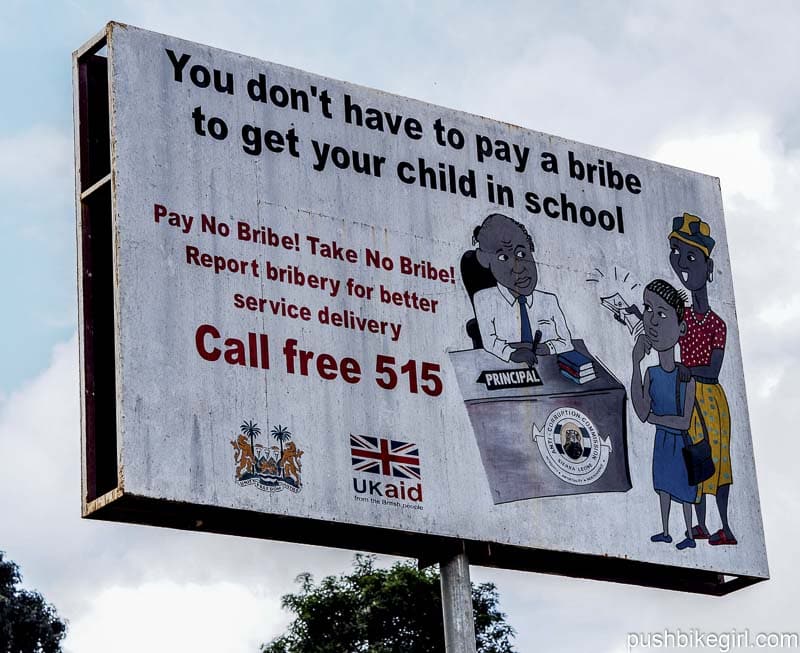
With all the people with whom I was able to have a conversation – unfortunately, there were too few of them so far – who were somewhat better off, the argument that they had to feed their family members came up again and again.
Whether uncle, brother or cousin, they all knock on their door and want money because they believe that the one who has something must give them something. It’s a tradition, and it has to be.
I’ve been told directly to me, “You’re white; you got money; you got to give some of it to me.”
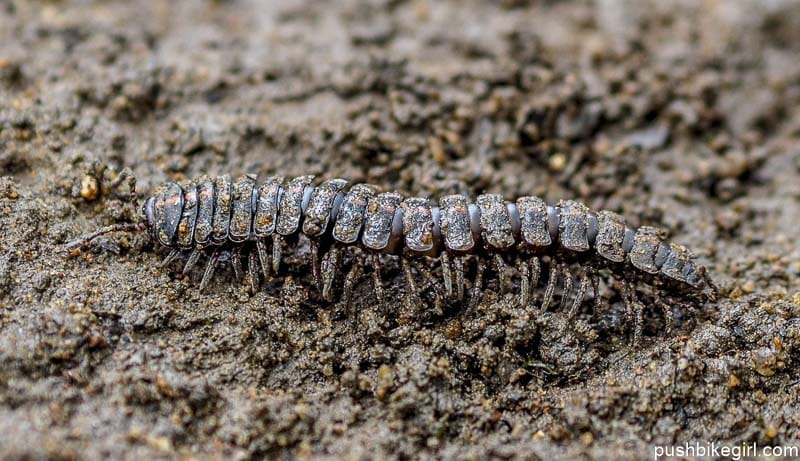
So, as a white person, I am in a world where I am understandably considered rich, as a financier and savior for people in need, because all white people here in this area seem to be saviors because they only come here to do development projects or missionary work. There is almost no tourism in West African countries, if so, only at the beaches.
“What is your mission? Are you a man or a woman?” because nobody seems to understand how a woman can ride through West Africa alone on a bicycle and is doing so voluntarily without any ulterior motives.
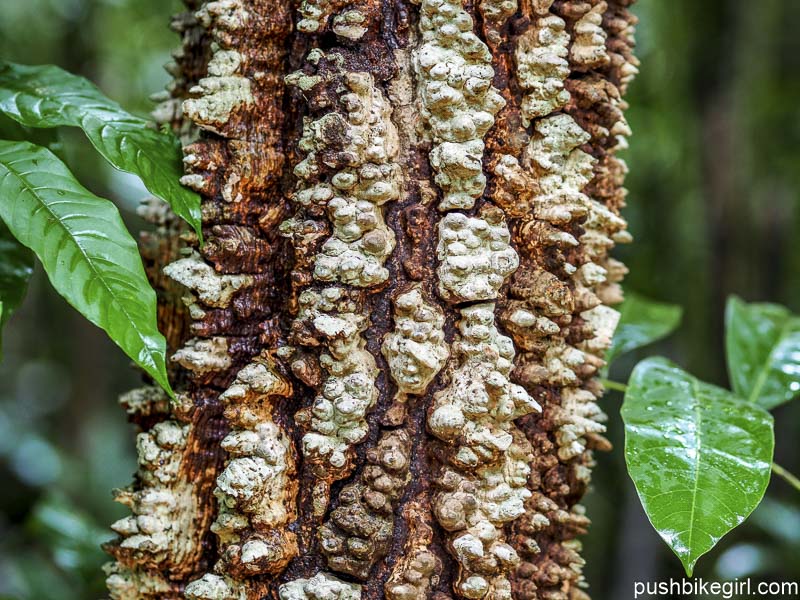
In principle, we want to calm our consciences with development aid. But in the end, no one sees whether development aid causes any benefit or even rather damage. We also cannot see to what extent we are exploiting the continent and taking away everything people have.
A friend once said to me: “I do not want to see the misery.”
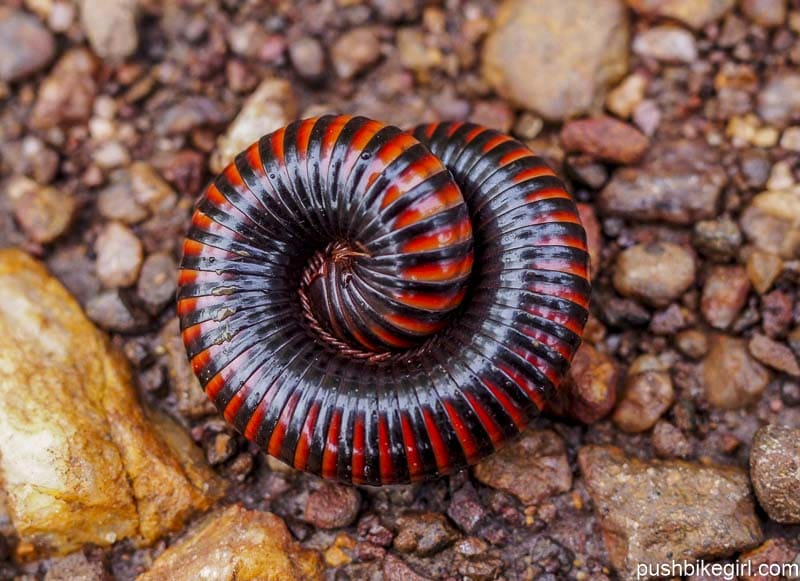
What also goes through my mind often is that other countries beyond the African continent were also colonized and exploited. There were wars in other countries too. Most of Asia suffered in these ways, and yet, so much has improved there in recent decades. People picked themselves up, have fought for their rights, created stable forms of governments, worked hard and put their countries back on a forward-moving path – but why not here?
For sure, the people here suffered a lot during the war and Ebola crisis – so much more than I can ever imagine, because I was born in the right place at the right time.
But in my opinion, the issues here are not only due to the intense exploitation by the rich nations but also come from deeply rooted African cultures. Cultures and world views, Westerners haven’t been able to understand and may never understand.
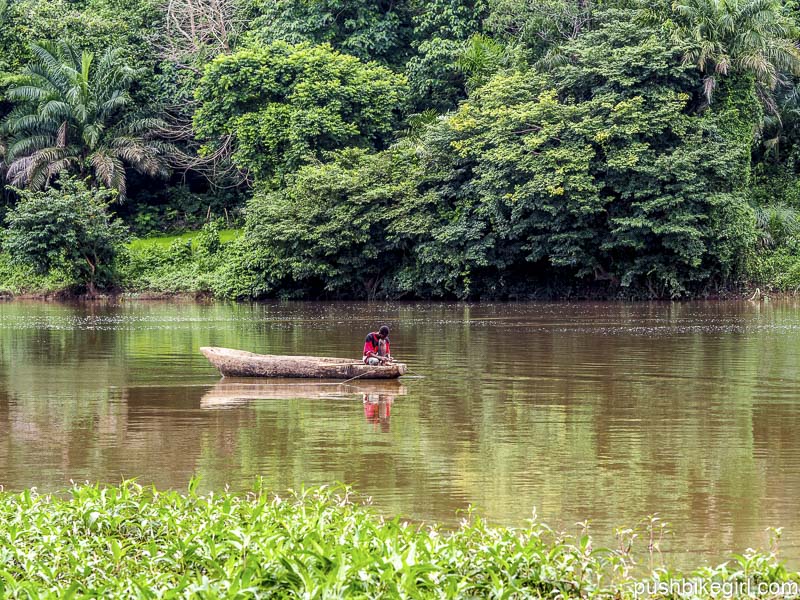
I would love to help everyone here, but in reality, I can only hope they understand one day that neither God, nor the white man, nor the big brother, nor the corrupt president can finance or improve their lives. They must take their fate into their own hands.
As the one Ranger put it: “Only God can help us.” Afterward, he turned around and went back to sleep.

Still seeing him there in my mind’s eye, I wonder, did he continue to sleep because he has lost the meaning, motivation, and power in his life, and no longer cares? Or because he has been weakened by lack of food? Was he perhaps sick? Or is it far simpler, and he is enjoying his life the way it is?
Was he so underpaid? Were park entrance fees ending up in the pockets of corrupt politicians? It certainly does not go into the maintenance of the buildings and the national park, that is quite obvious.
Maybe he simply did not feel like providing the only tourist of the month with information and nature experiences to earn some more money if he had made a little effort?
From my point of view, it makes no sense to pay money for something for which there is nothing in return. I don’t want to support the “white man pays for everything” philosophy of life. It’s counterproductive. It does not help people, quite the contrary.
But how can I, as a visitor, interpret something like this? I see the circumstances, but I do not see what’s behind them, at least not in enough detail.
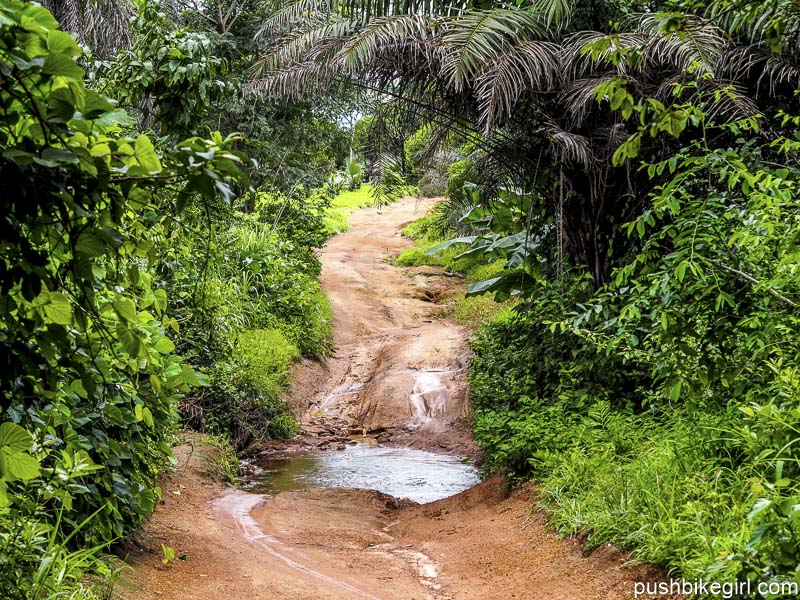
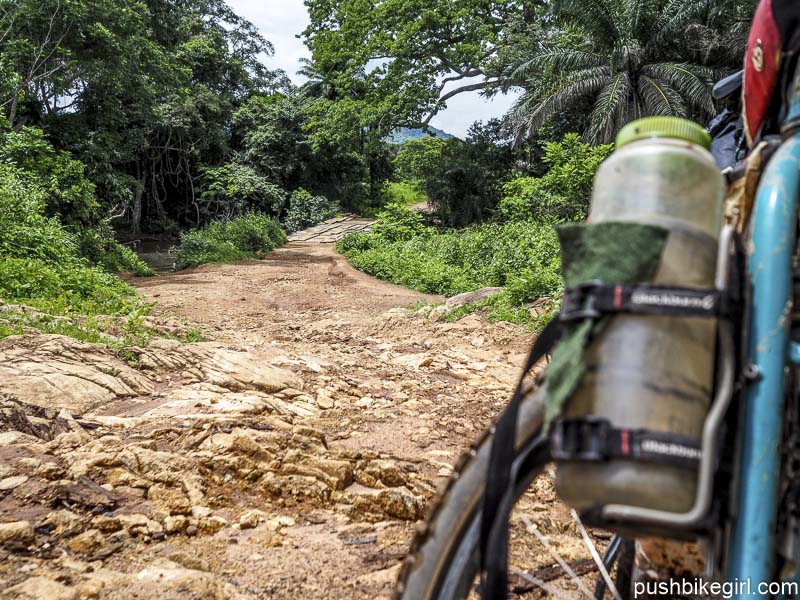
When I rode away from the national park, I sat down on the side of the road for the first time and started crying. I cried about the injustices of the world, for the fact that I had no one to talk to, for the seeming senselessness of my trip and the hopelessness of the people here in Sierra Leone.
I cried because we are destroying this world out of greed and selfishness. And I cried for a tropical rain forest that is slowly but surely disappearing into thin air and with it, every living creature which calls it their home.
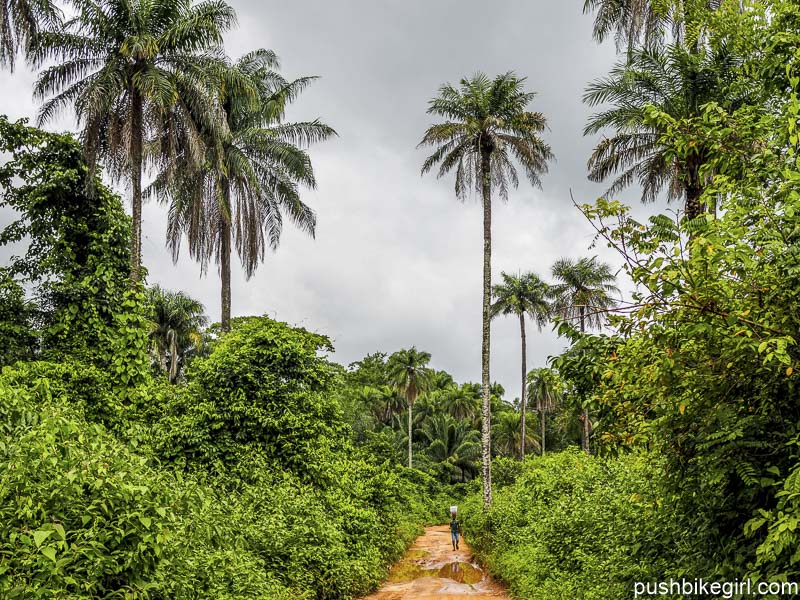
Was I out of my depth? Probably. Did I feel alone? Nowhere more than here in West Africa.
As I have often said, I never feel lonely in remote areas while in nature. But I feel brutally alone when I am surrounded by people with whom I cannot communicate in the way I would like to.
The level of education in the remote corners of Sierra Leone was a disaster. It was rarely possible to communicate in a meaningful way, and no, it was not only the language.
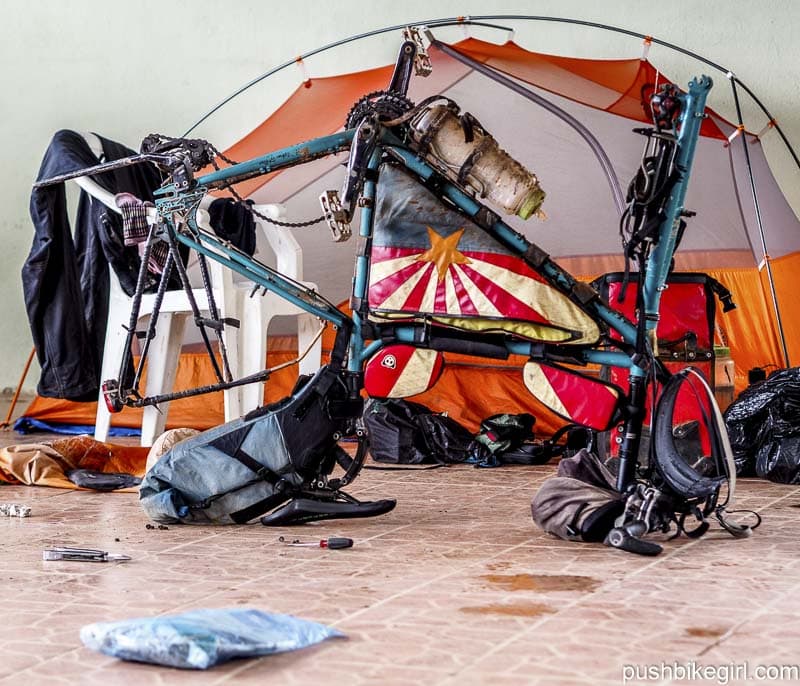
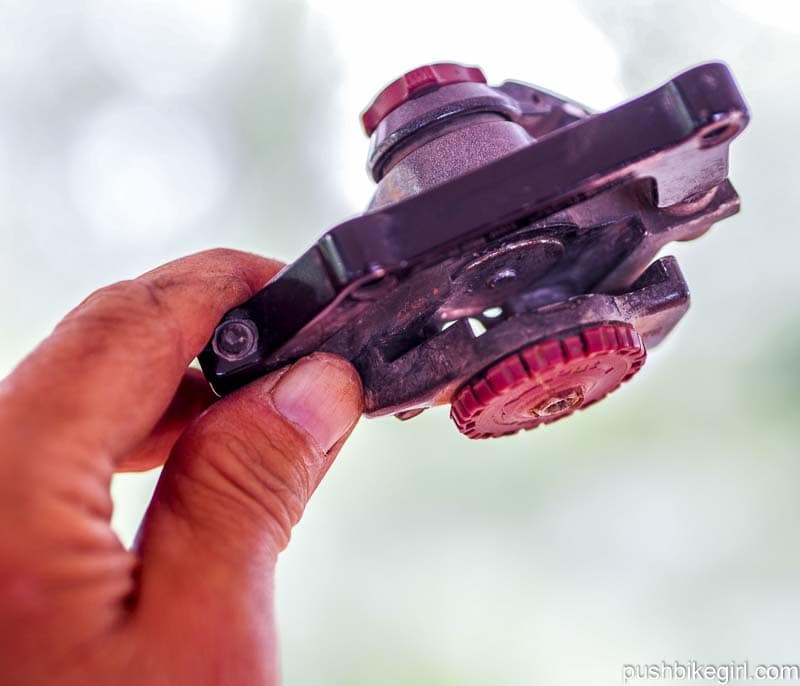
Exchanges with friends had become more and more important to me. I spoke to God and the world via WhatsApp and just wanted to talk. I wanted to get my thoughts out, and I wanted to understand, but nobody understandably knew the answers to my thoughts. And yet I was happy for those who listened to me.
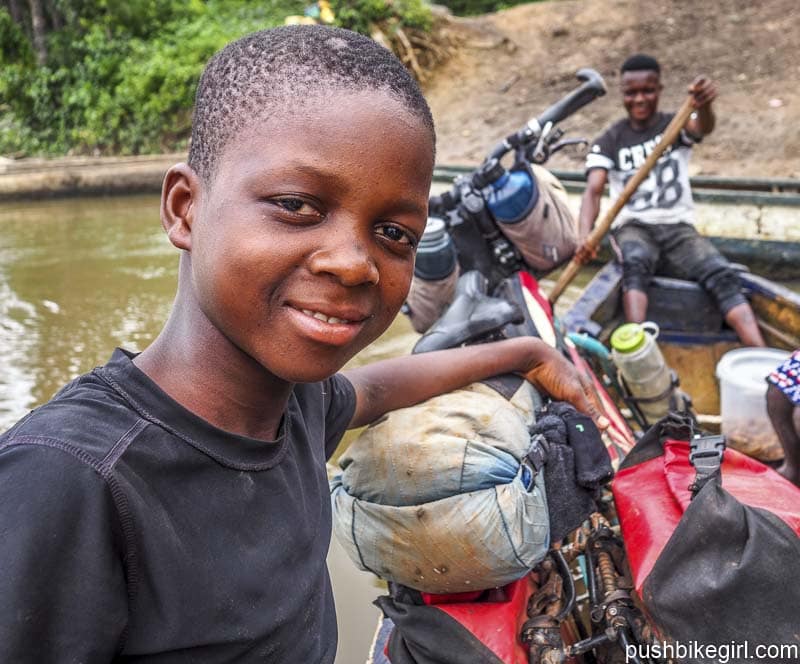
As I rode on toward the first city, I passed through small villages whereas usual people were very friendly, but here in this northwestern corner of Sierra Leone, I had the feeling for the first time people weren’t happy, they left a sad impression.
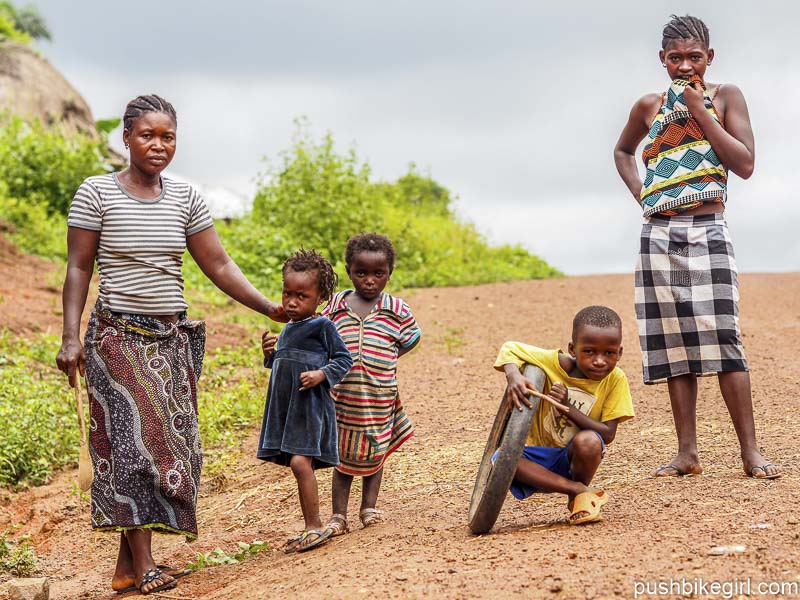
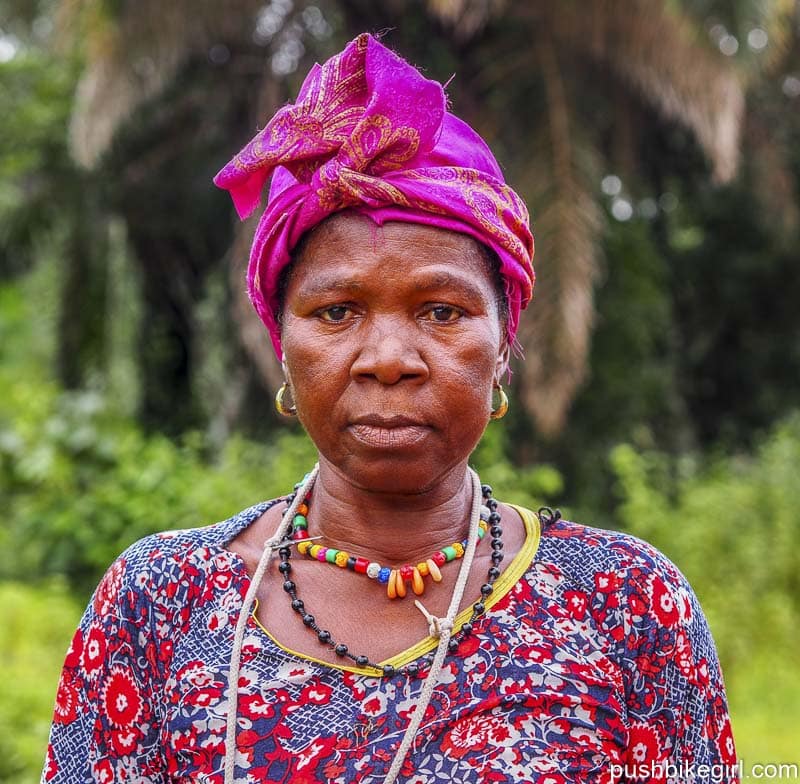
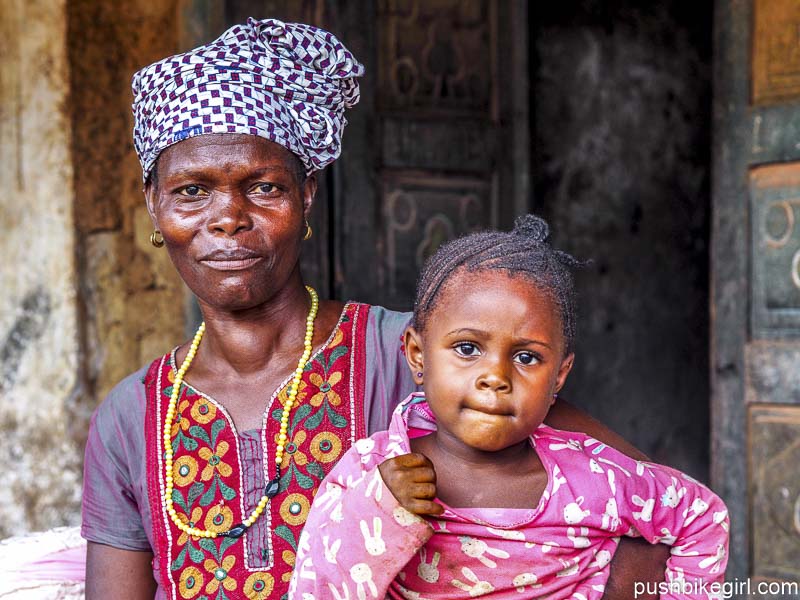
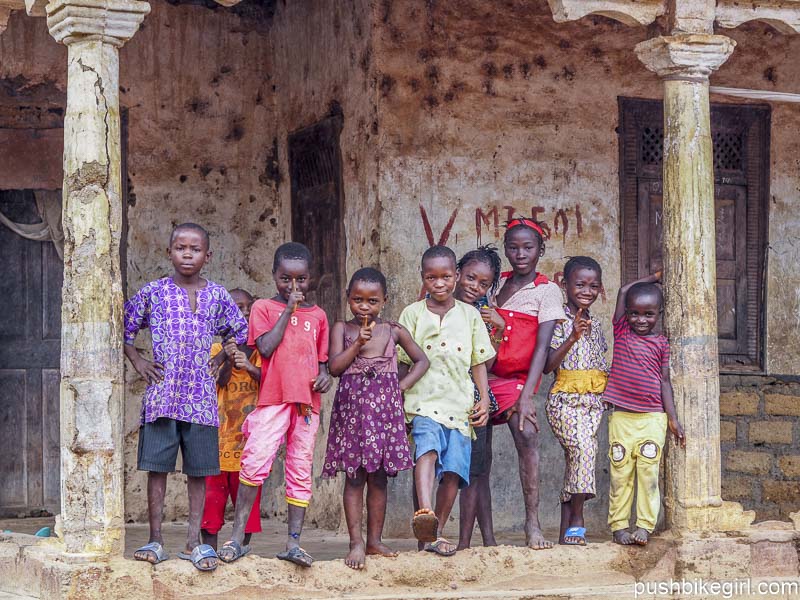
Up to this point, I had always been deeply impressed and thrilled that people were so cheerful despite the difficult conditions in which they lived. Here it was different.
In a small telephone-shop I bought a sim-card and wanted to charge it to use the internet, but the shop owner did not know how to charge the card. He did not know the three-digit combination, which was needed and which is different from country to country, and I had no way of knowing them.
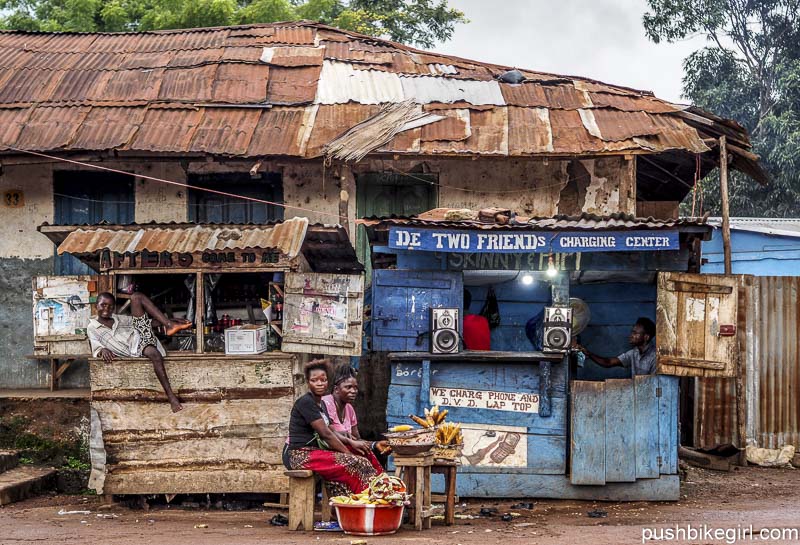
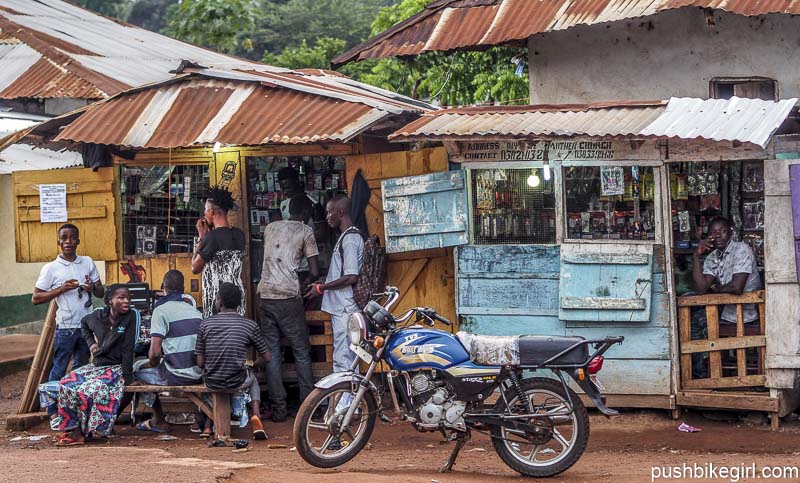
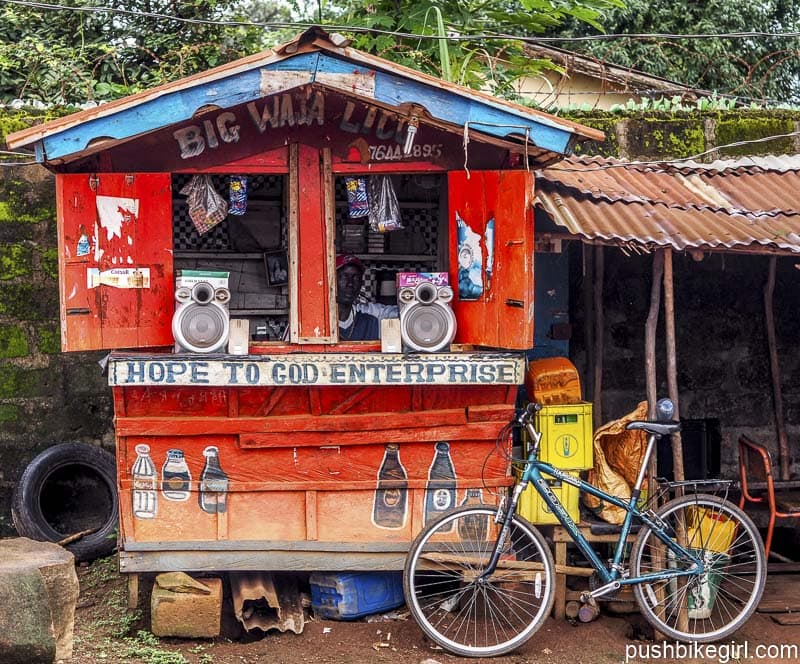
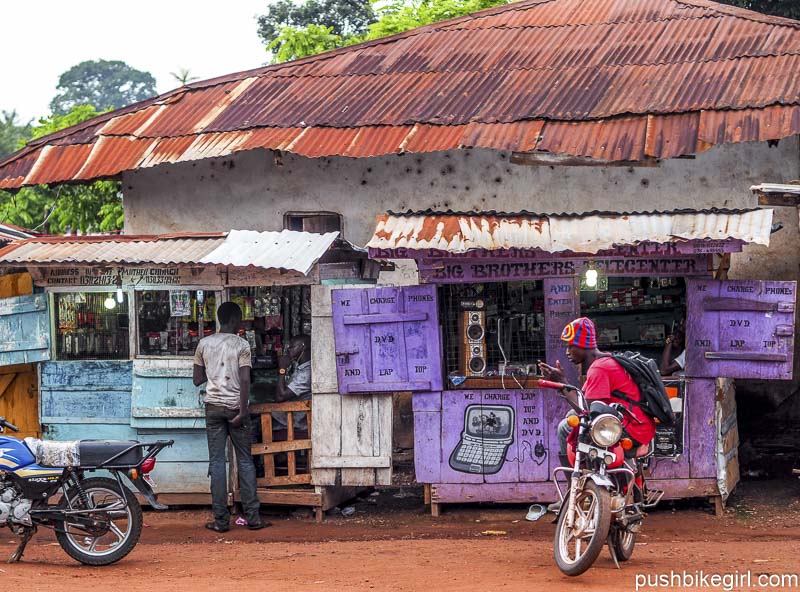
My trousers had a hole in the knee, so I stopped at one of the many tailors, “I’ve been doing this for 20 years – I’m the best”. I didn’t get far before the newly sewn seam burst.
The next tailor began mending the cuff instead of the hole at the knee, as I had asked, then he did zig-zag stitches around the hole without closing it.
The third tailor was not a charm and accidentally cut into the pants, so I threw the trousers away and was forced to wear my slightly warmer pants again until I found a replacement.
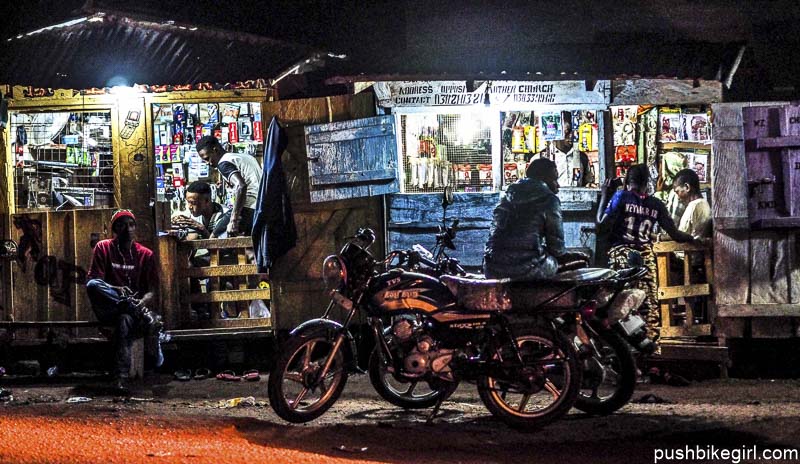
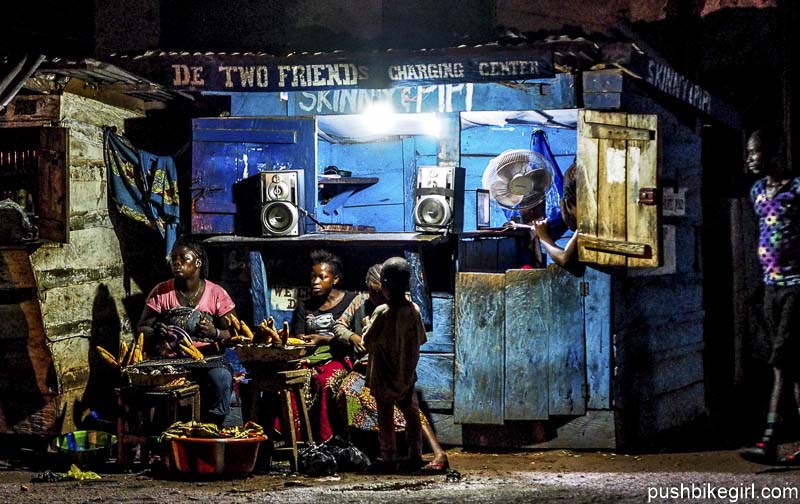
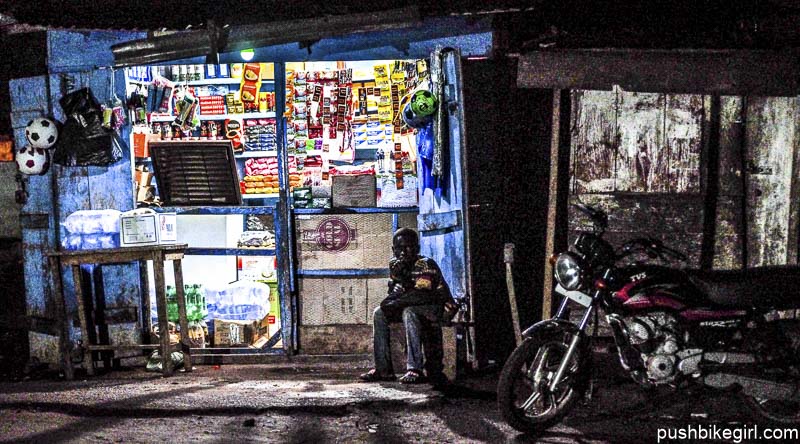
And yet as the kilometers passed, I was more and more aware of how so many of the negative thoughts and fears we have of West Africa weren’t showing up in my journey.
West Africans proved to be consistently super friendly, willing to share the shirts off their backs if need be. But as already explained, this also has its dark sides.
I had not had a single encounter to this point that had turned ugly or gave me a reason to be fearful.
As a woman traveling alone, I hadn’t experienced any disadvantages. Alone, of course, was intense, no easy conversations for months took its toll.
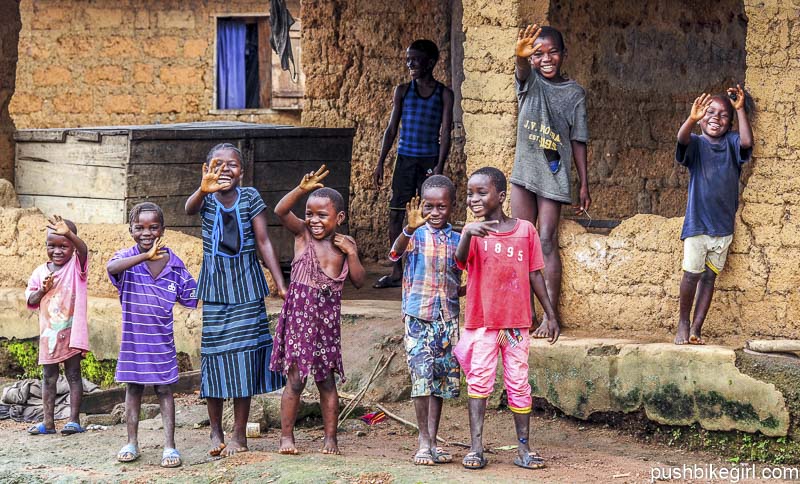
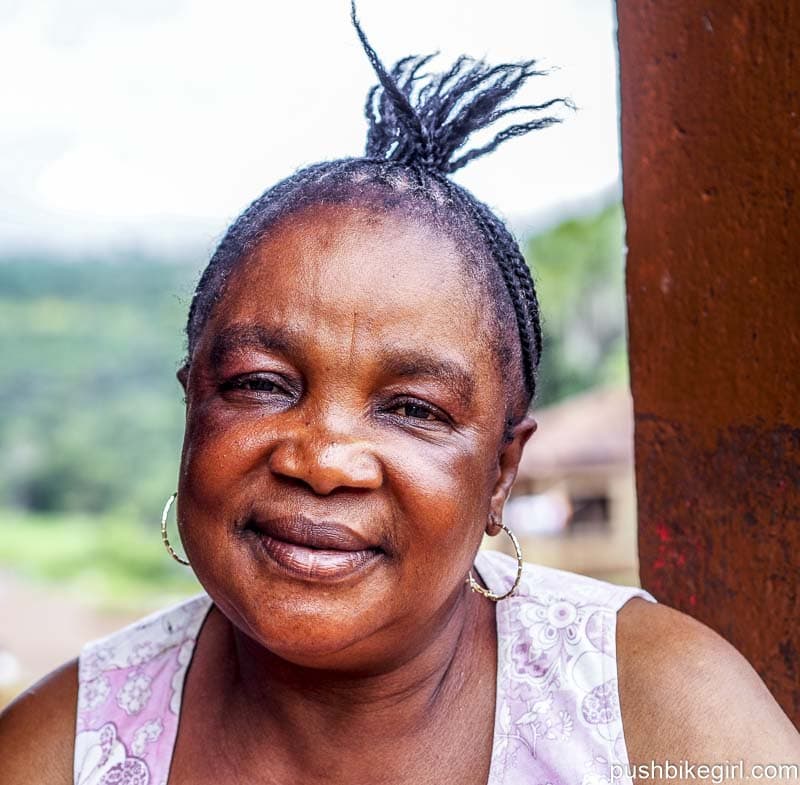
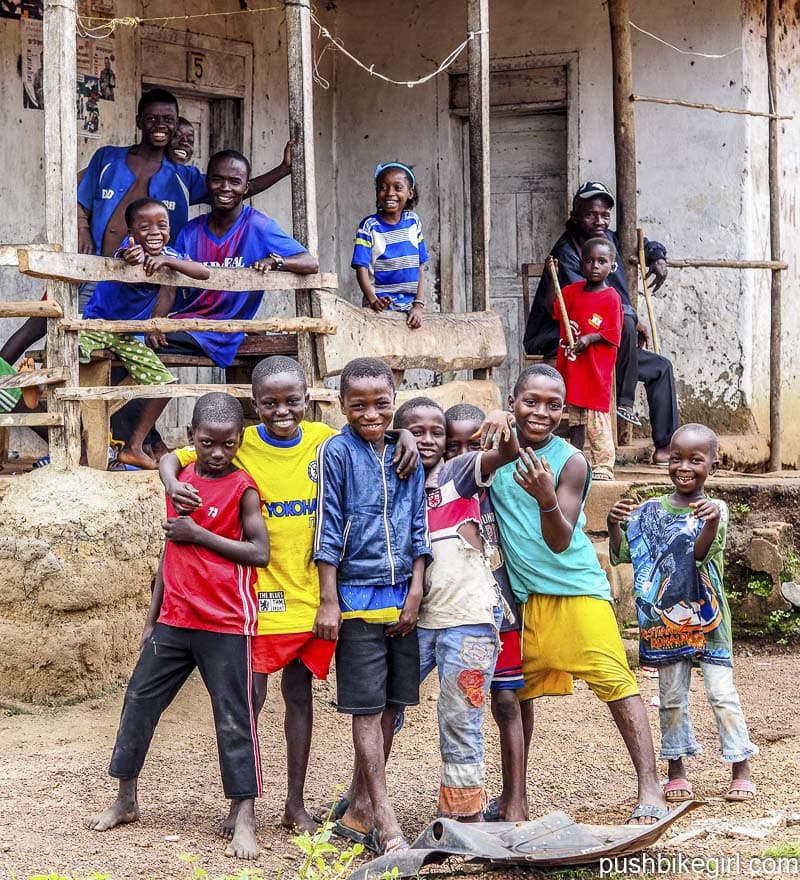
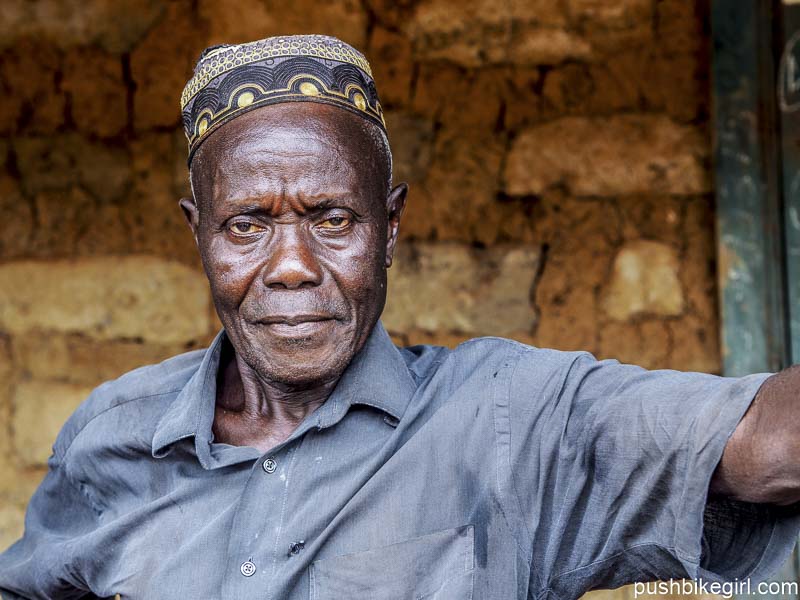
Even after riding through all those remote areas during the rainy season, the season diseases thrive, and I hadn’t contracted malaria or been seriously sick. I was certainly happy about that.
Perhaps my habit of downing my rain pants and windbreaker, clothing impervious to mosquitoes in the evening, wasn’t as crazy as it was uncomfortable.
I was also able to buy Coartem along the way, which is supposed to be the treatment of choice and better than what’s available in the West. I was also carrying and making use of quick tests, although these are controversial.
For the locals, it is a disease they endure many times, and in the course of their lives, they may develop some immunity. West Africa is the most infested region worldwide.
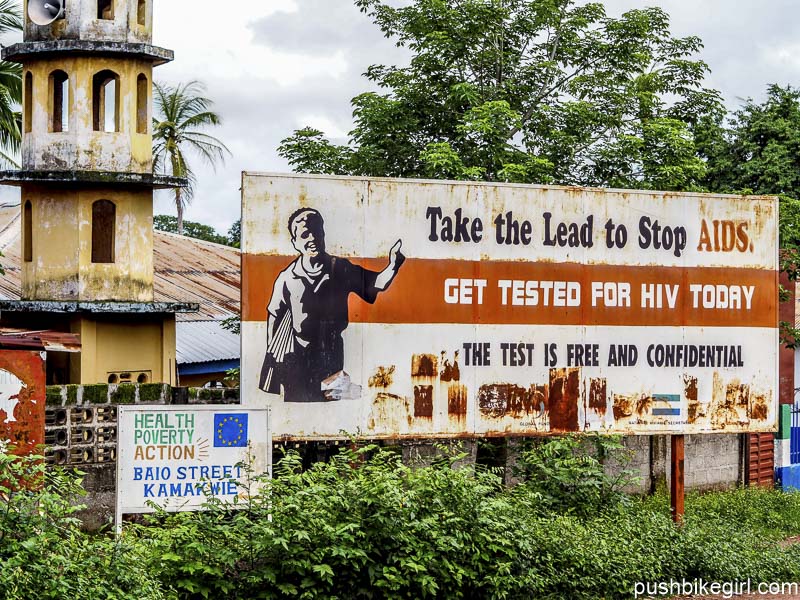
“White man, White man, give me money.” I sometimes answer with, “By the way, I am a woman,” after which comes “oh yes, white woman, white woman give me money.”
Sometimes I’ll say, “Black man, what’s up?”
As usual, begging was mainly in the regions where UNICEF and Co had left their mark. Outside of these areas begging wasn’t usually an issue.
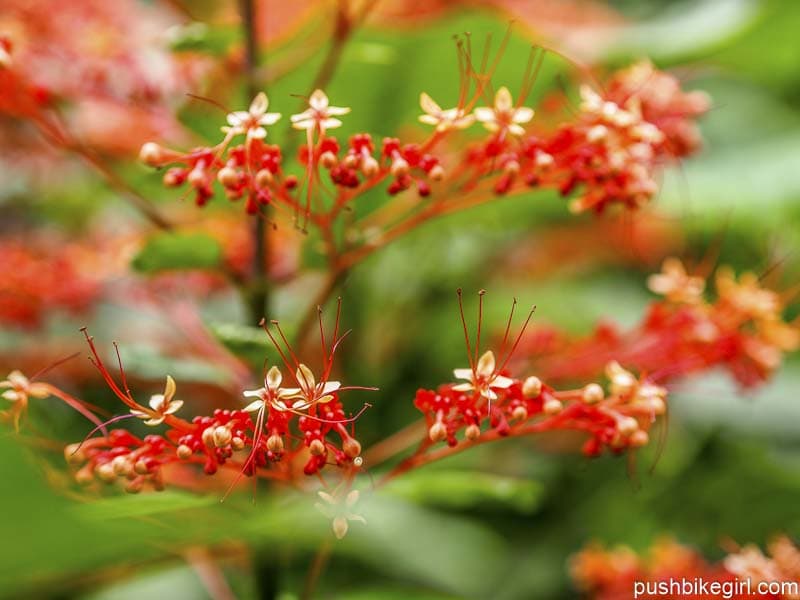
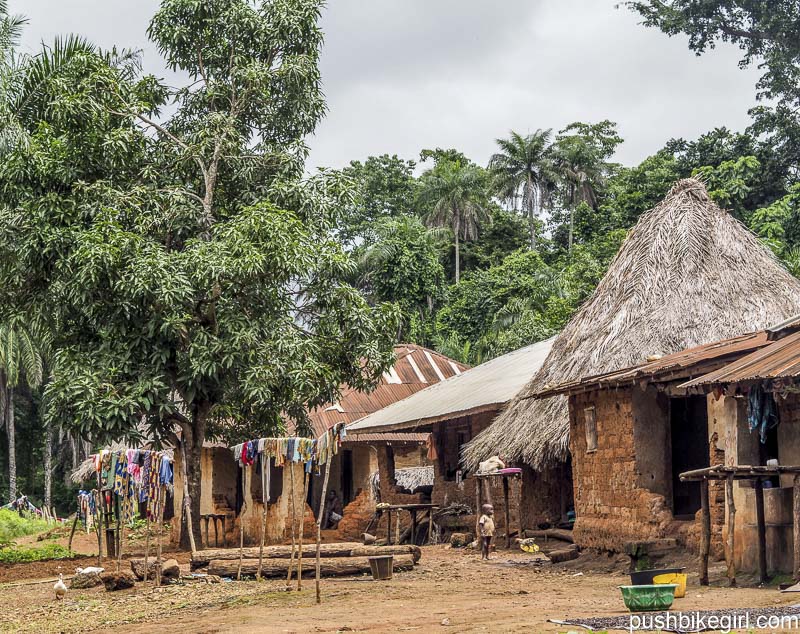
As always, I found a connection to the children. Many travelers seem to be most annoyed by the little ones, but I must say that I am more annoyed by the adults who send the children away and then ask me the same questions again and again. Playing with children is often much more fun.
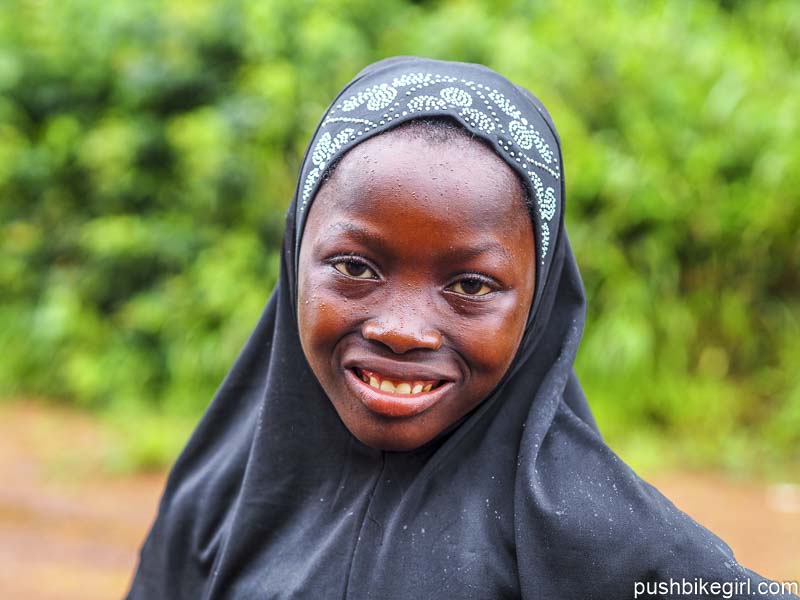
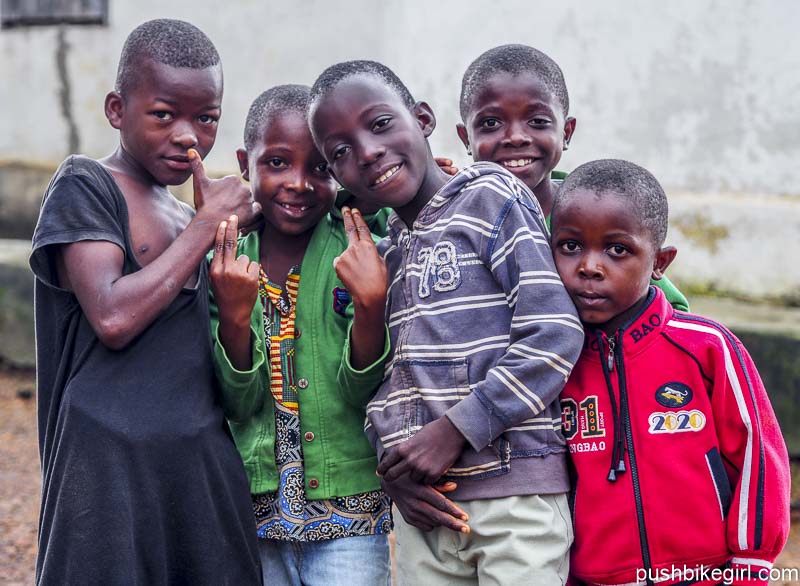
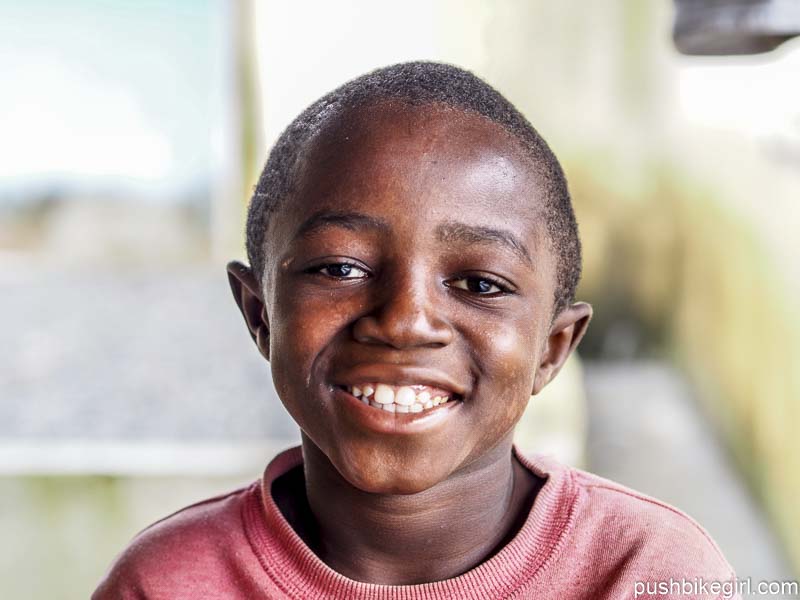
Kamakwie was the first town of consequence on my route, and I found it attractive. The architectural style was different, there was interesting street life, and the people were pleasant and colorful.
I was allowed to pitch my tent in the church, where I talked a little with the priest. Priests are usually far better-educated people and therefore worth seeking out.
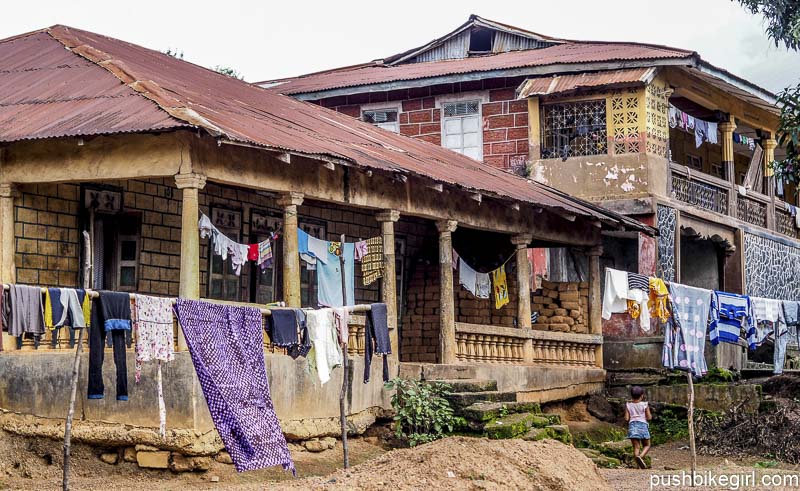
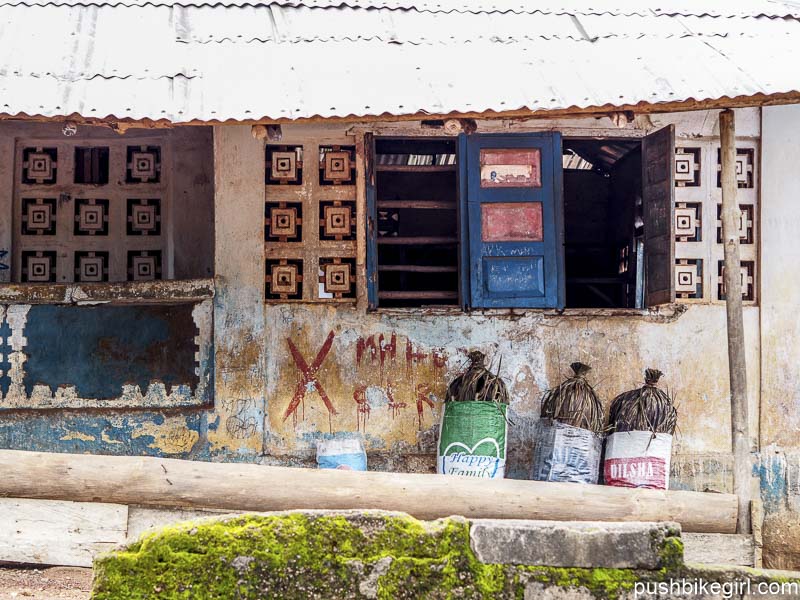
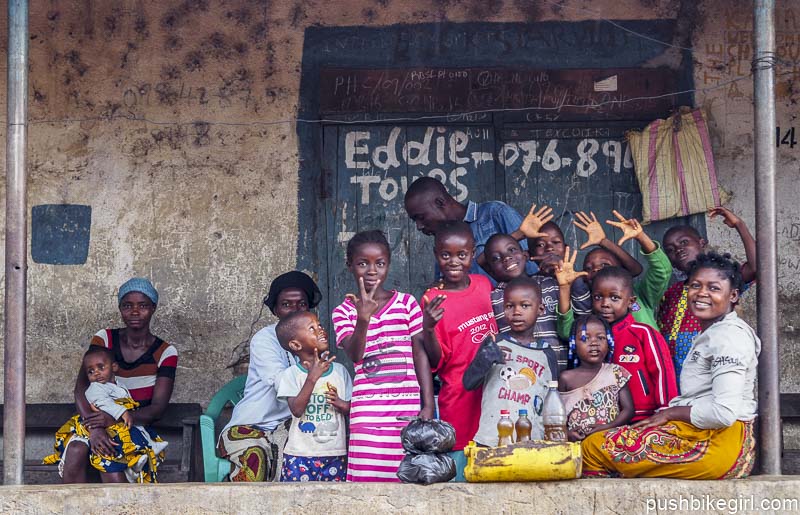
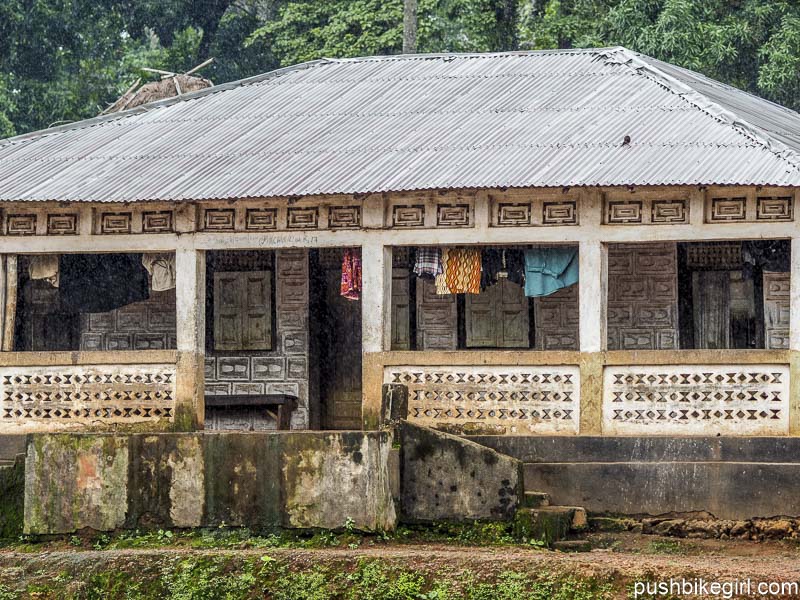
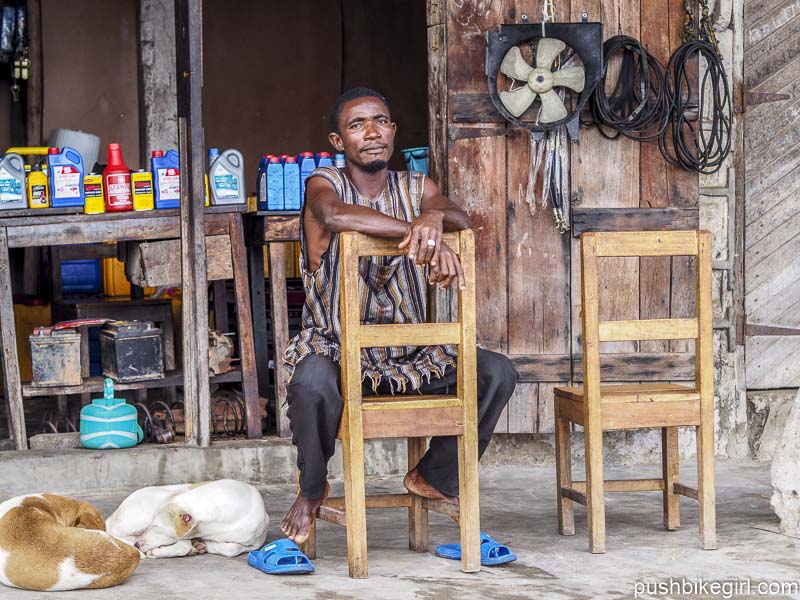
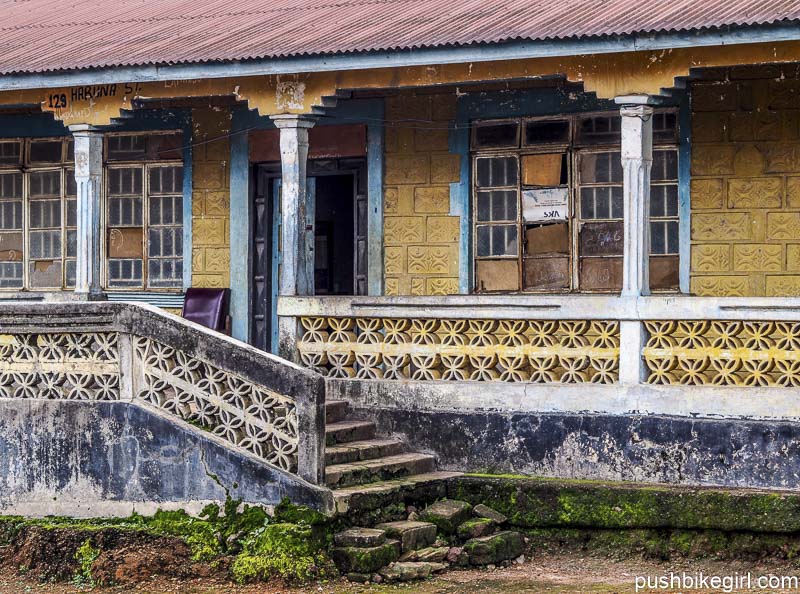
Ingenuity is a necessity in West Africa but, I was still impressed watching the priest’s son trying to solder the wires on his MP3 player, keeping the coals heating his iron glowing by using a small fan attached to a speaker.
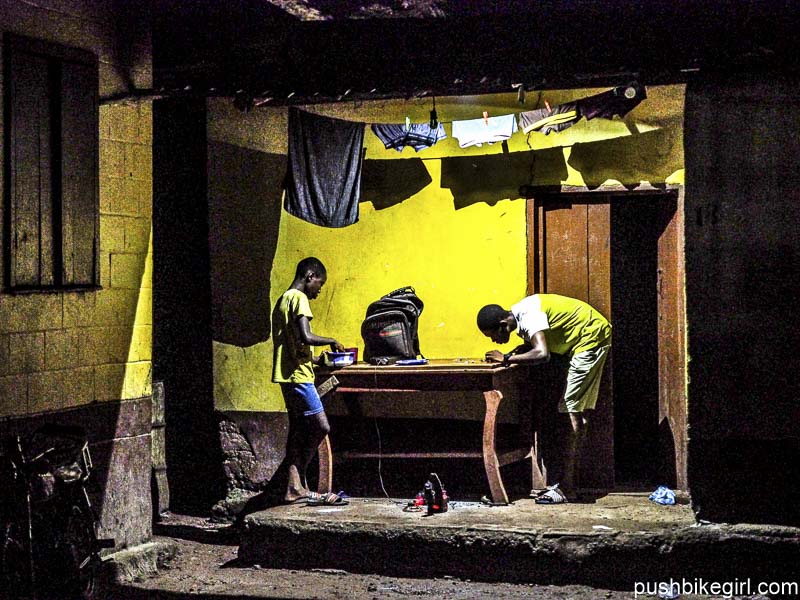
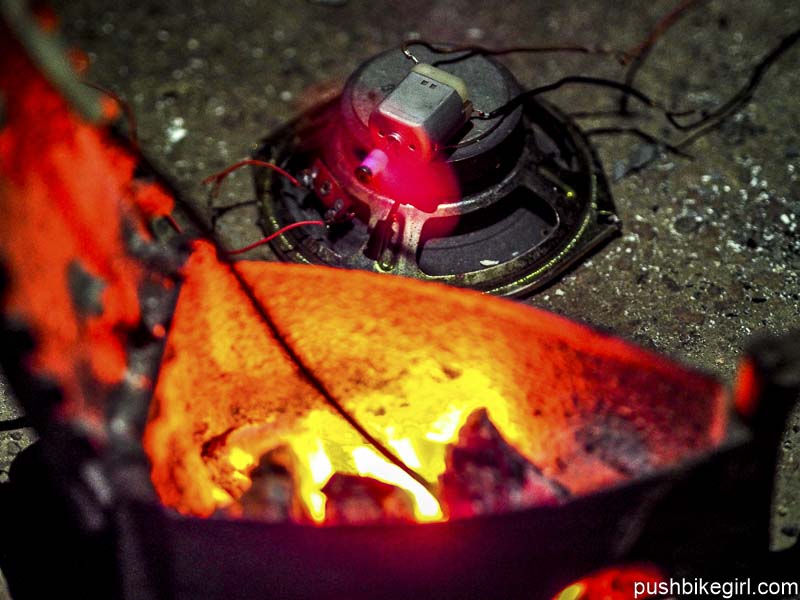
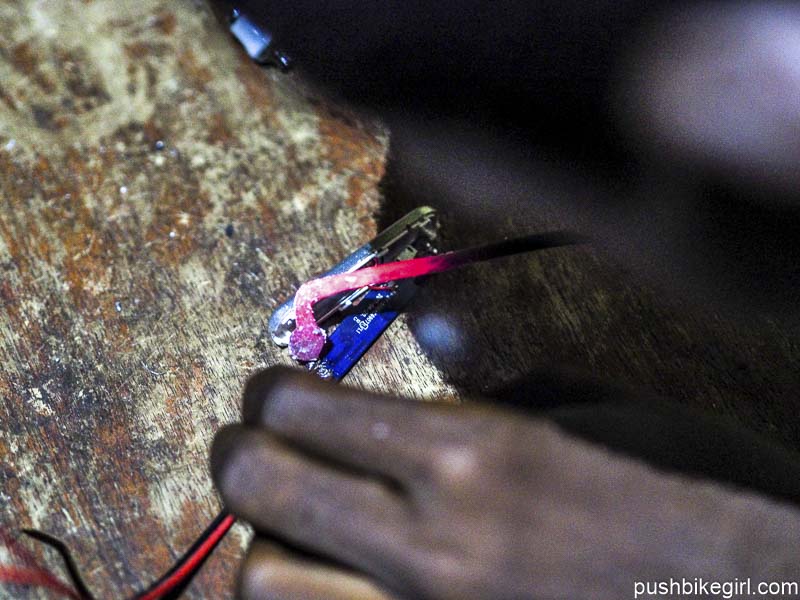
I also like the toy cars the children build from garbage.
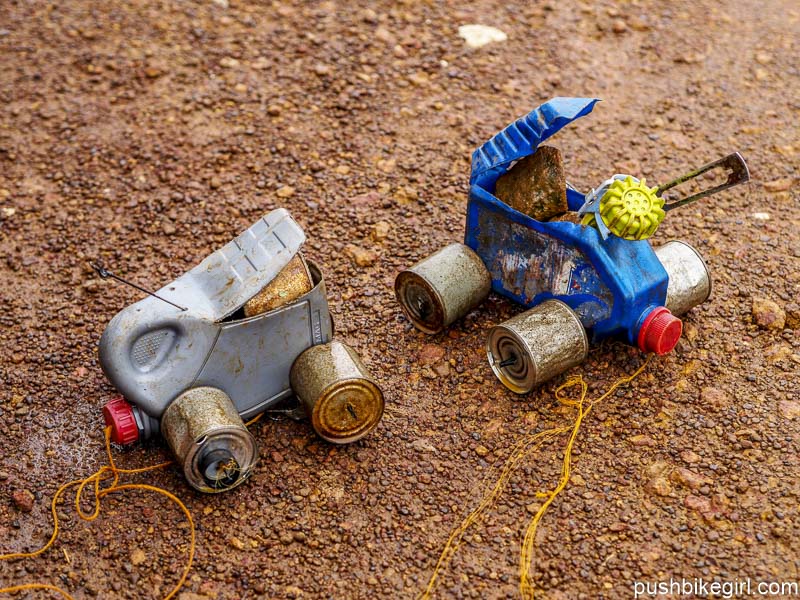
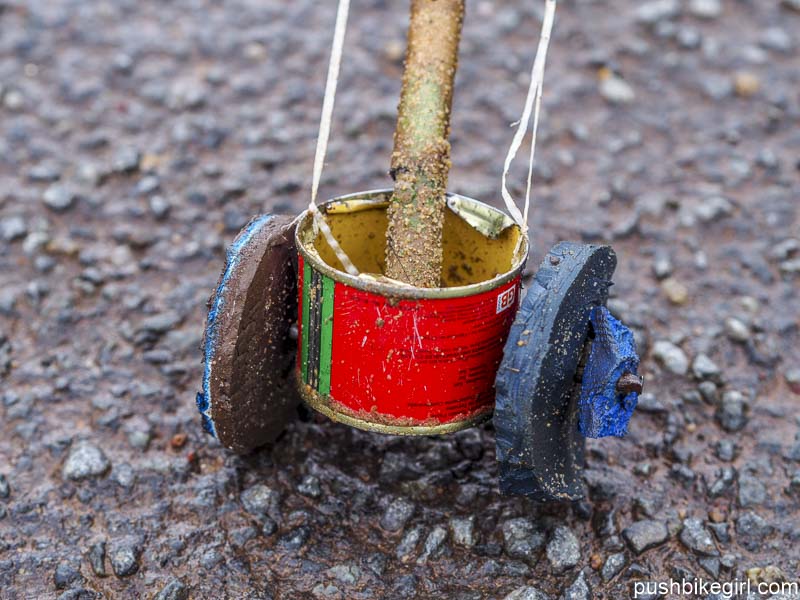
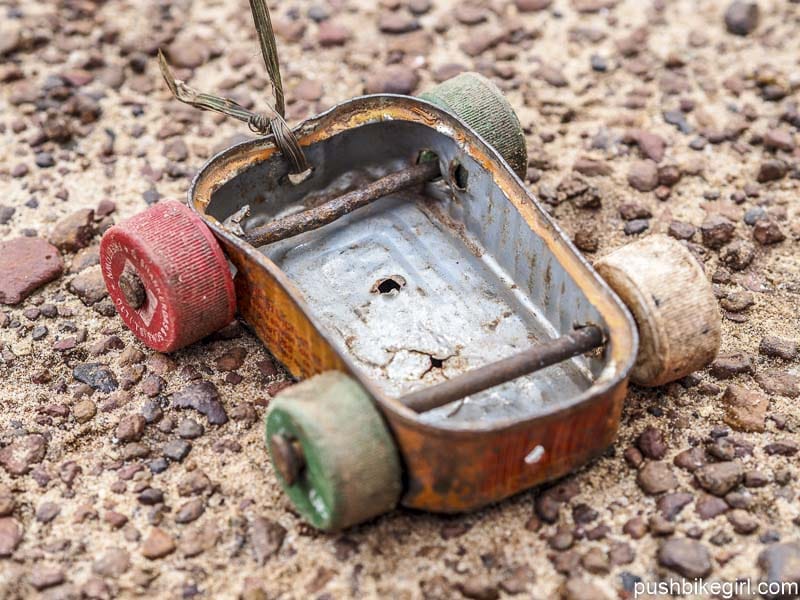
It poured every day. Everything was always wet, nothing dried. Luckily it was never cold, but it was certainly no fun.
On the way to Makeni, I slept in another church. The village celebrated something until 5 a.m., as always at full volume. Curious people were already peering through the windows of the church at sunrise to see what I was doing.
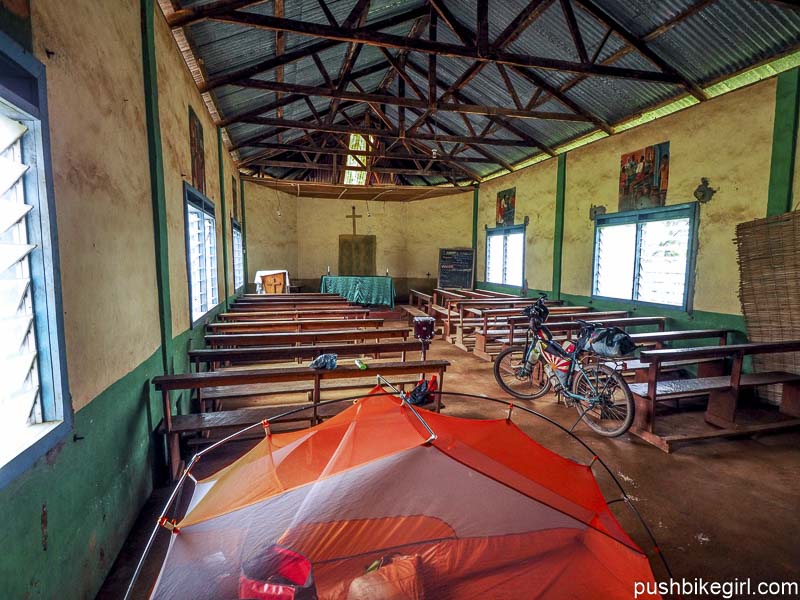
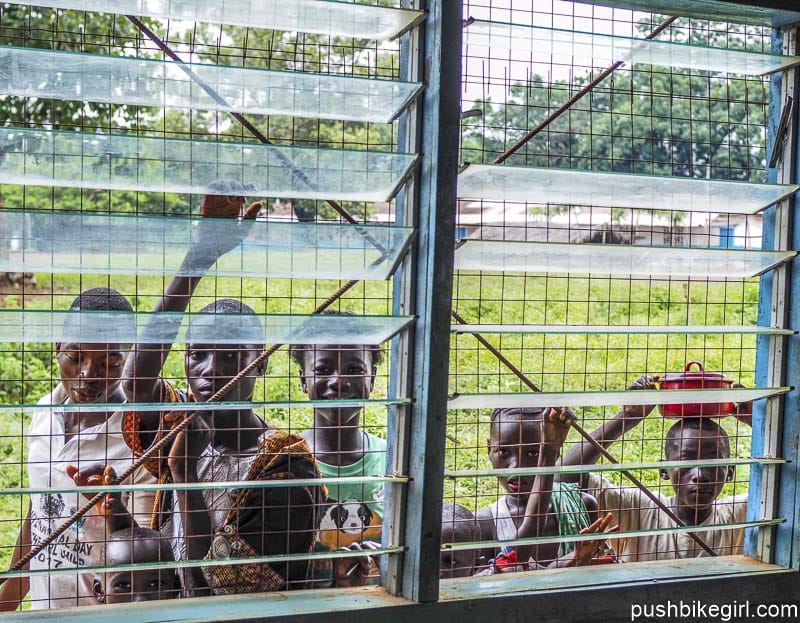
Hardly having slept, it took some extra effort to smile and wish everybody a friendly, good morning. The first thought in this situation is often, where do I go to pee without everybody watching me?
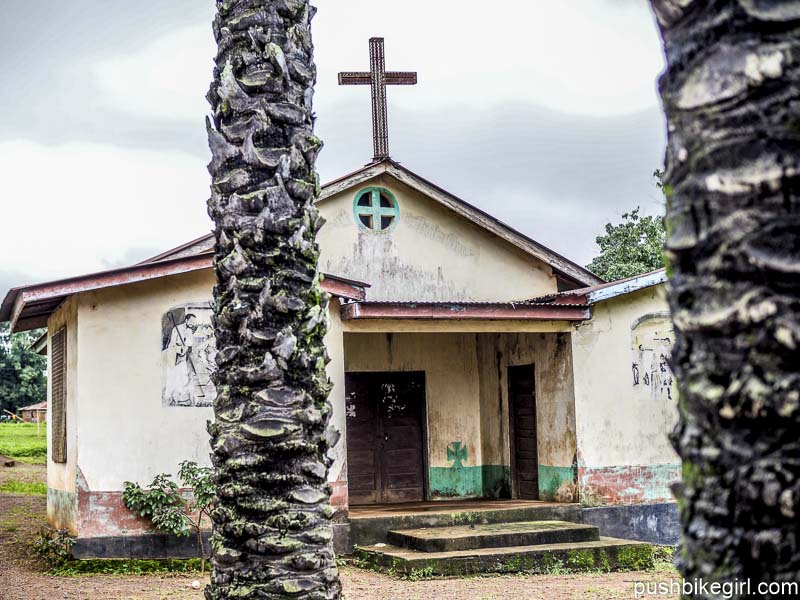
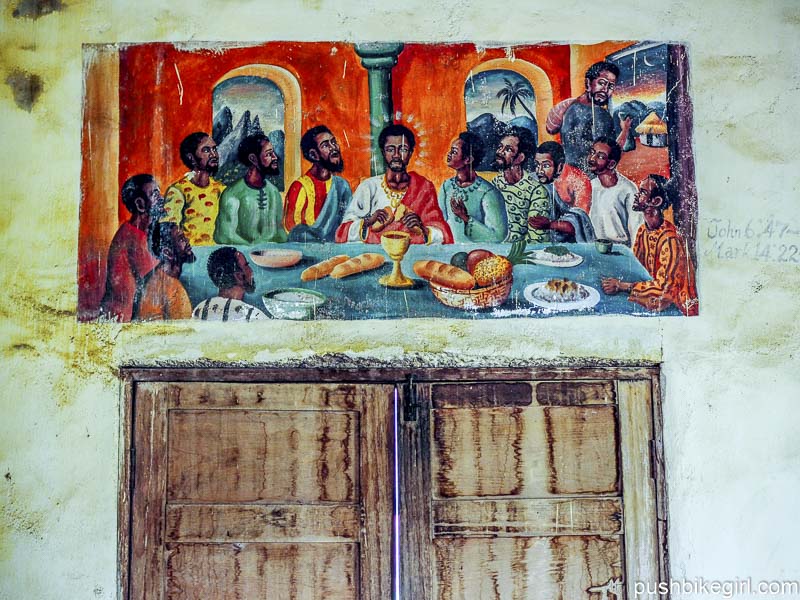
Sierra Leone had been really hard for me. I had several low points and was about to throw in the towel. But I was still hoping for things would improve, even though I started to realize that might not happen before Namibia and Namibia was still freaking far.
Other cyclists told me the food would be better in Ghana, so that was something to look forward to, I was tired of the rice with manioc leaf sauce I had been eating day after day. I only had to pedal through Liberia and Ivory Coast to get to this “better” food!
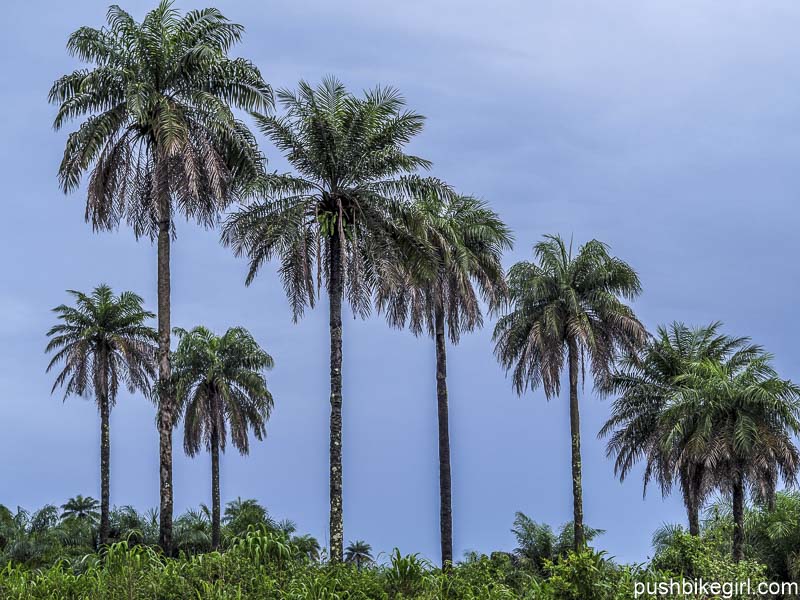
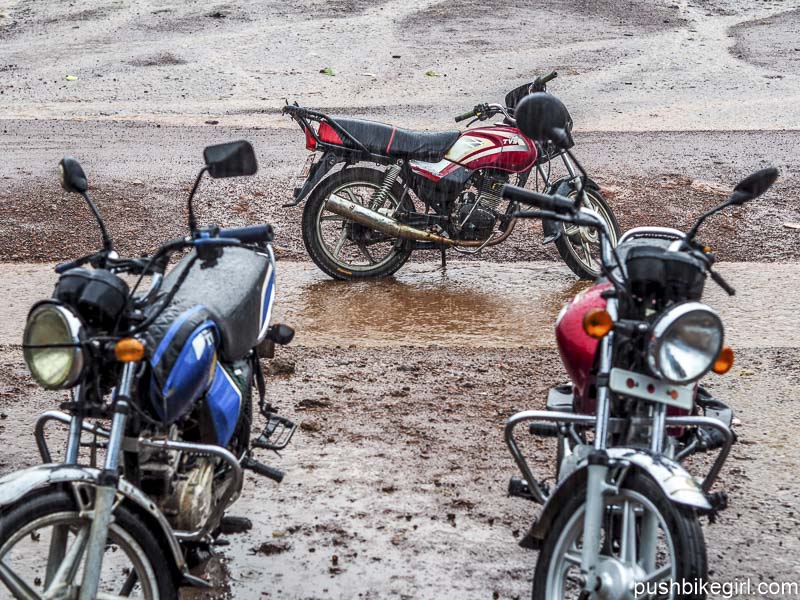
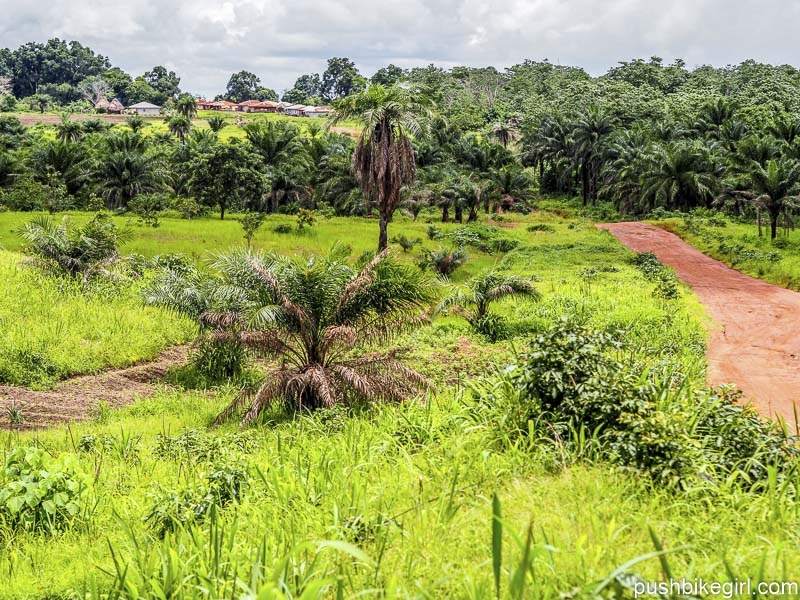
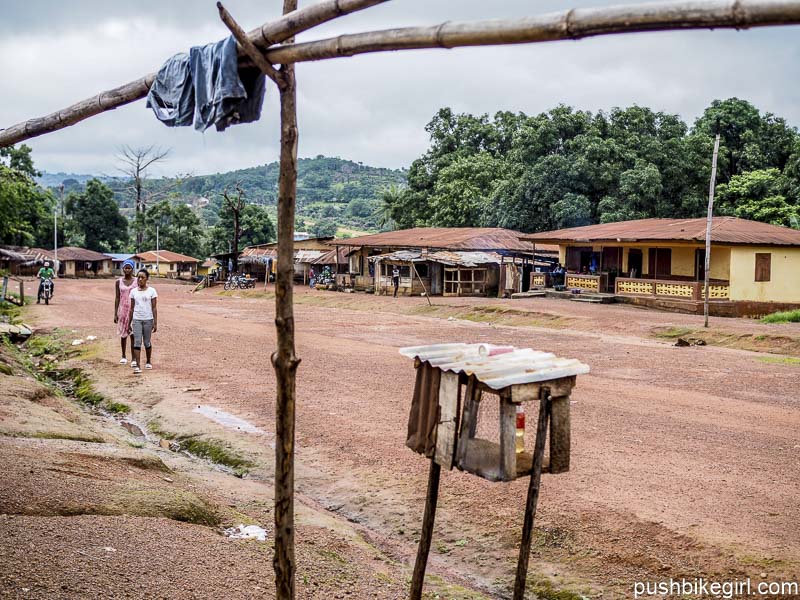
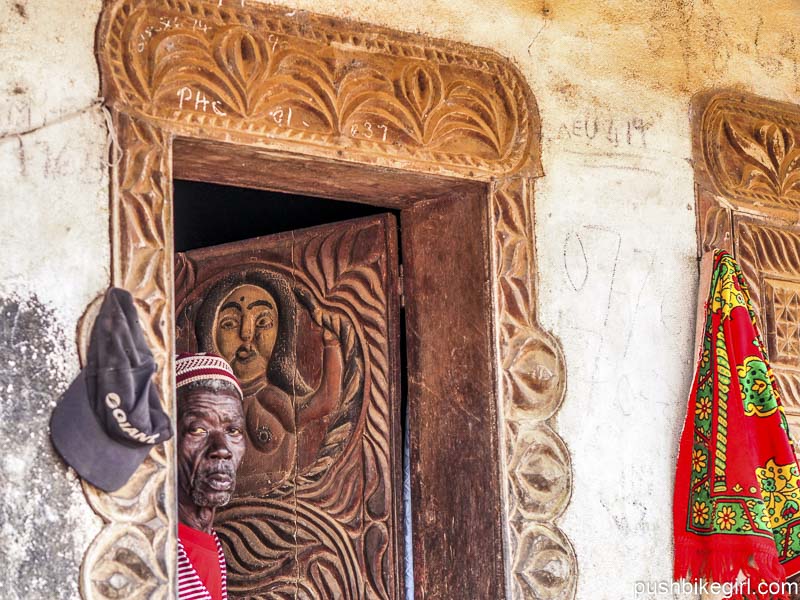
Shortly before the gates of Makeni, my chain broke and unfortunately, I didn’t have a spare with me, but I did have chain links, and so I got by for the moment. But I knew the chain had to be replaced soon, and wondered where I would find one.
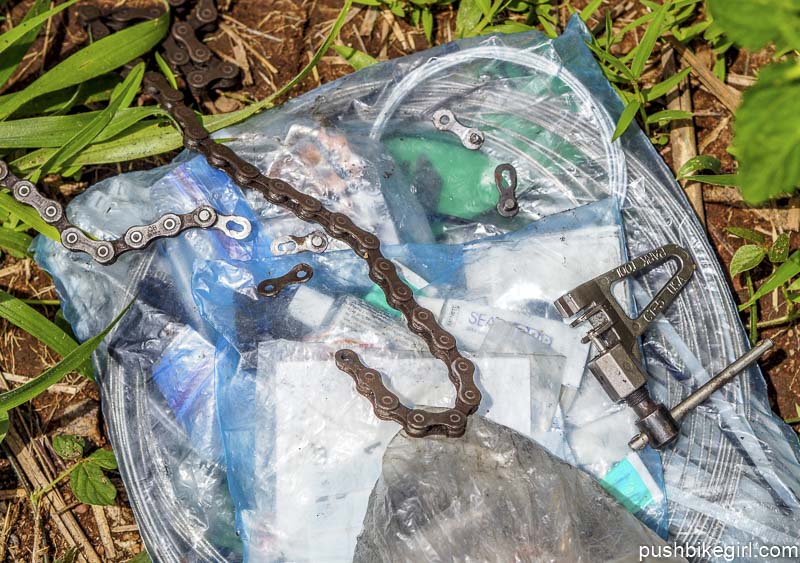
Rice comes from Pakistan and India, sugar, and milk from Germany. Almost nothing is cultivated here. I didn’t see any small vegetable gardens, nor did I see fields where anything other than cassava was growing.
Clothes from the Red Cross are sold in the markets. There is no industry.
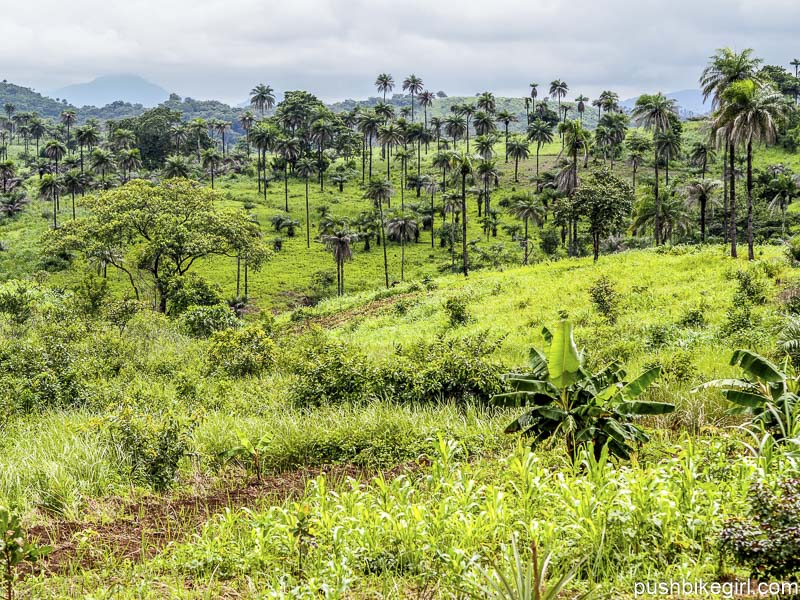
The landscape was repetitive, nothing special. Green, but boring.
The roads remained disastrous.
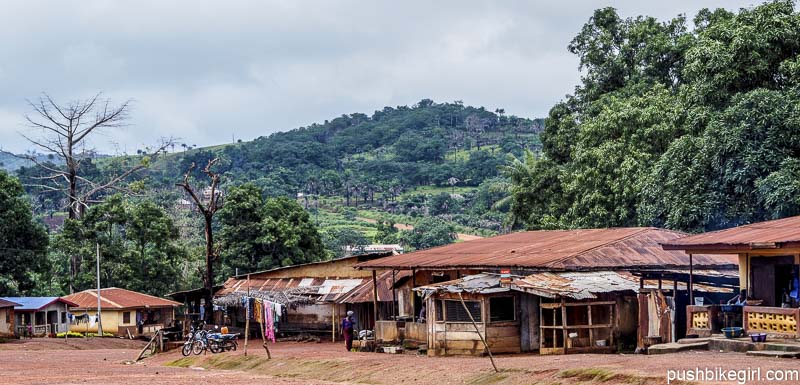
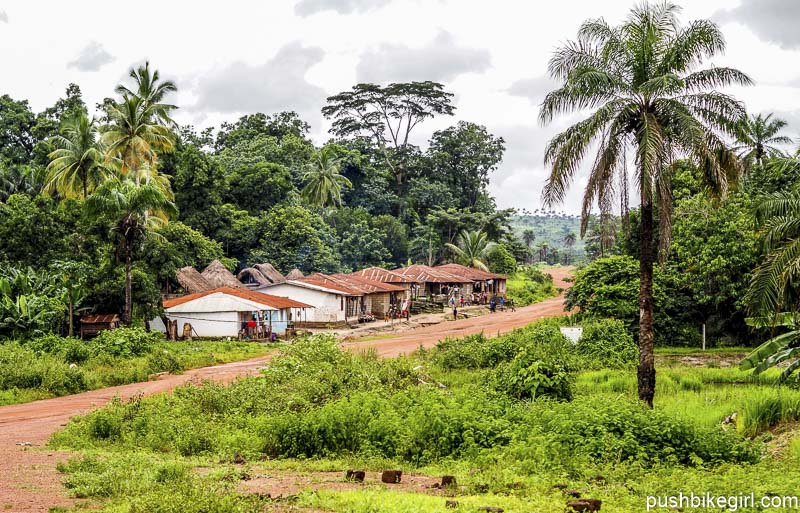
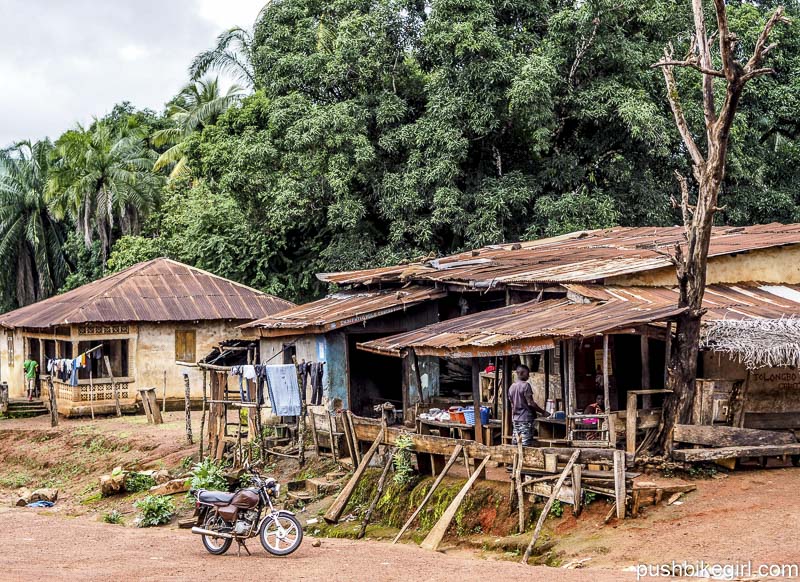
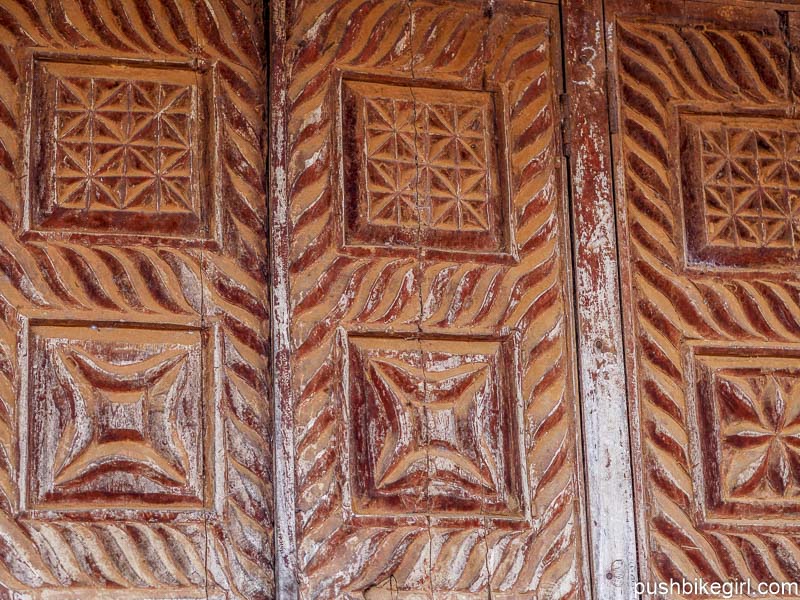
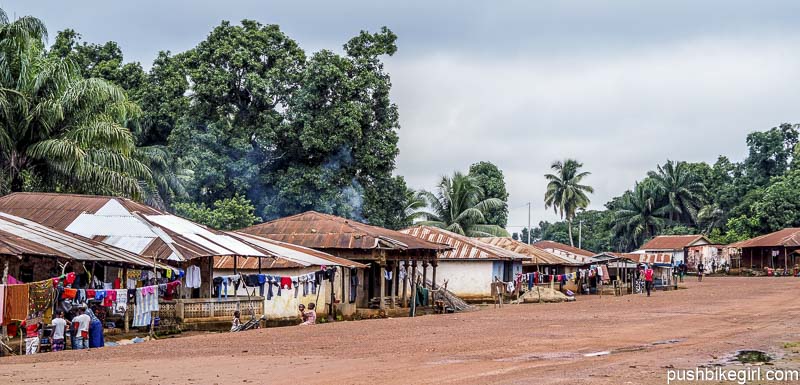
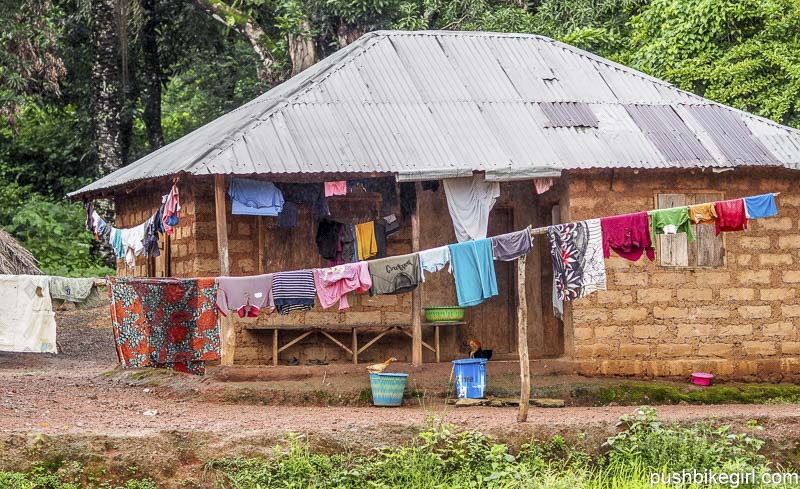
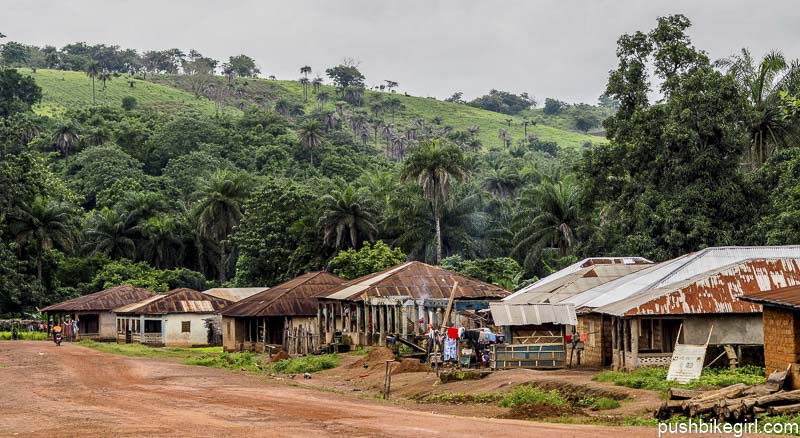
Just outside Makeni, I slept at the university. I was assigned a classroom. They said it was a private university where it was expensive to study. But even then, the classroom was in chaos.
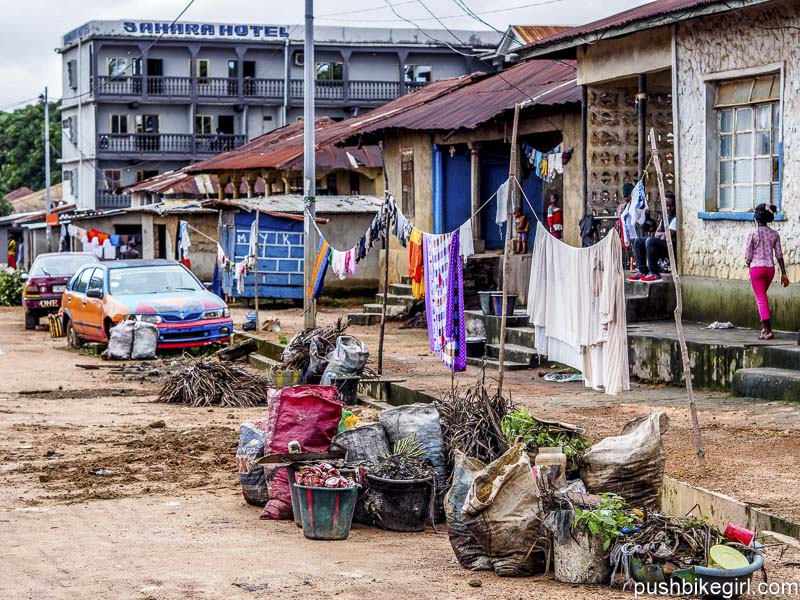
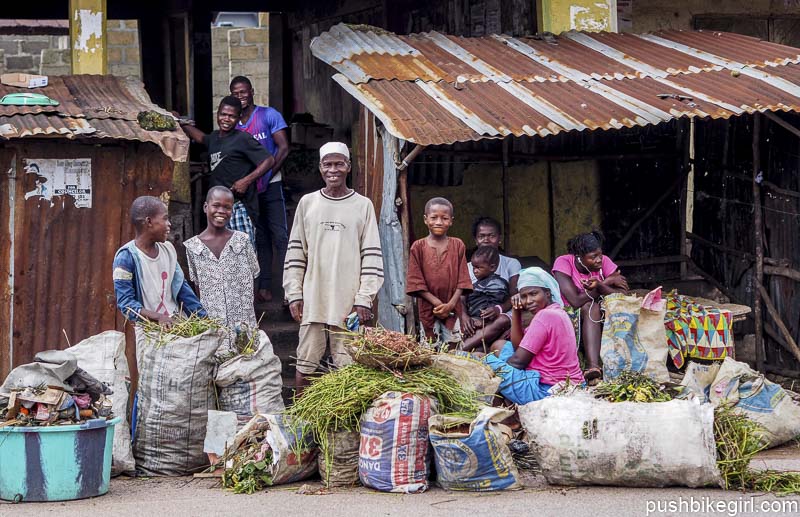
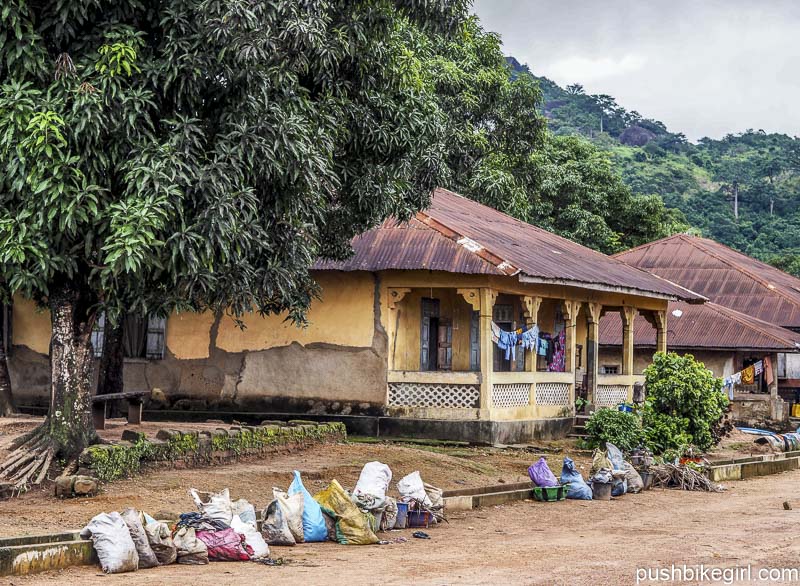
Much to Sierra Leone’s credit, it is far cleaner than neighboring countries, because on the first Saturday of every month there is “clean-up day” throughout the whole country. Everyone, men and women work collecting household trash as well as anything on the streets, and then it is all hauled away usually by two in the afternoon.
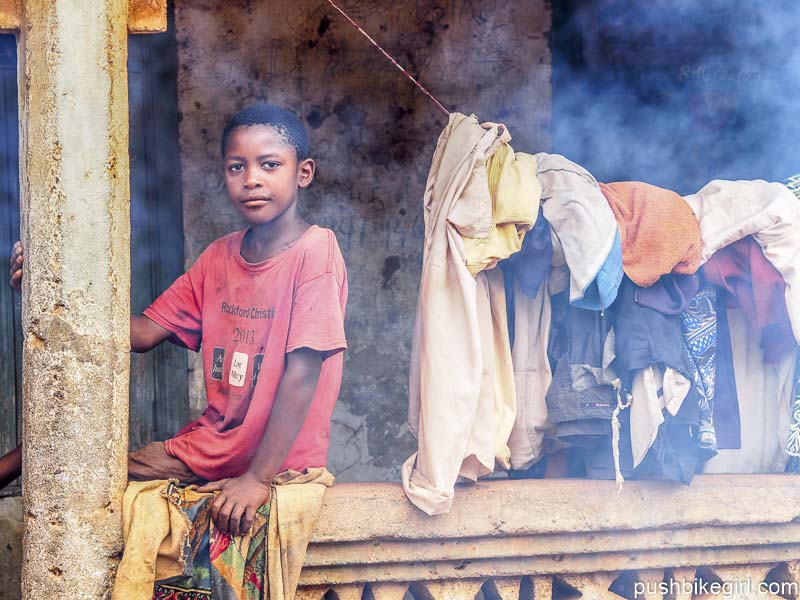
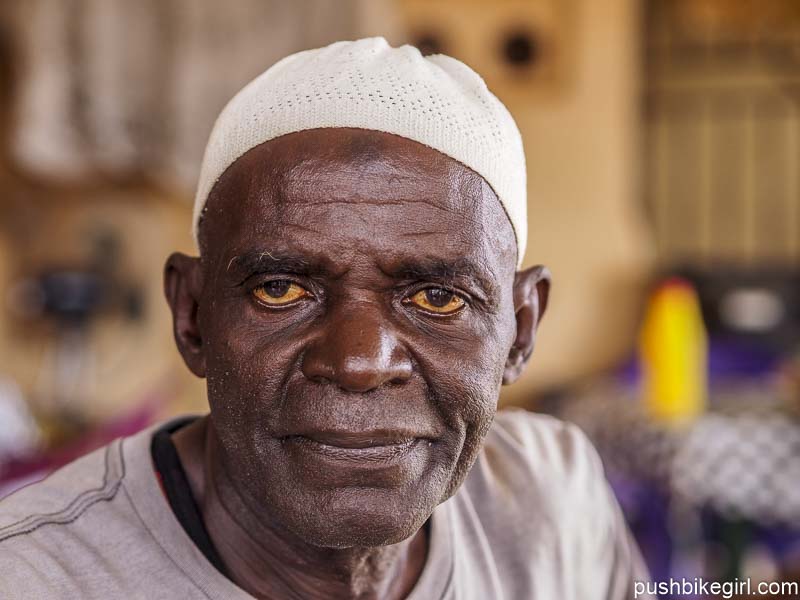
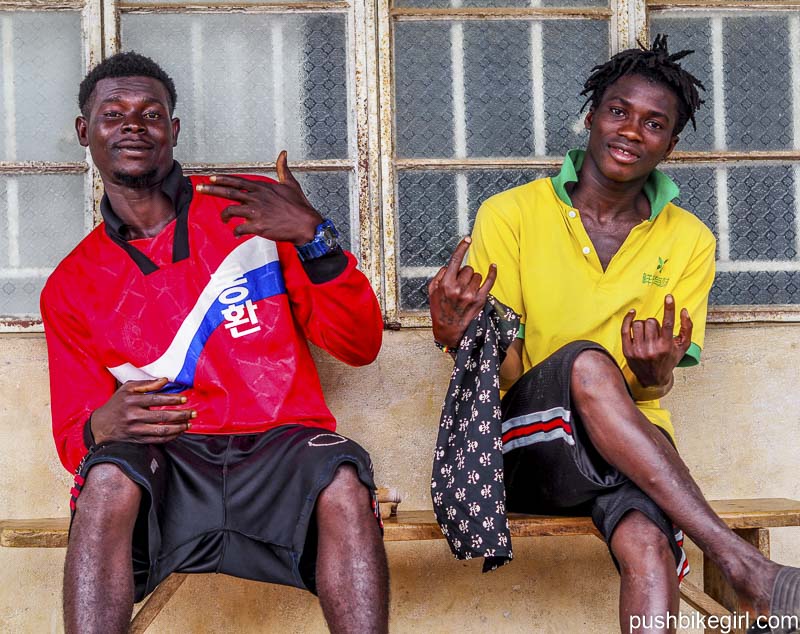
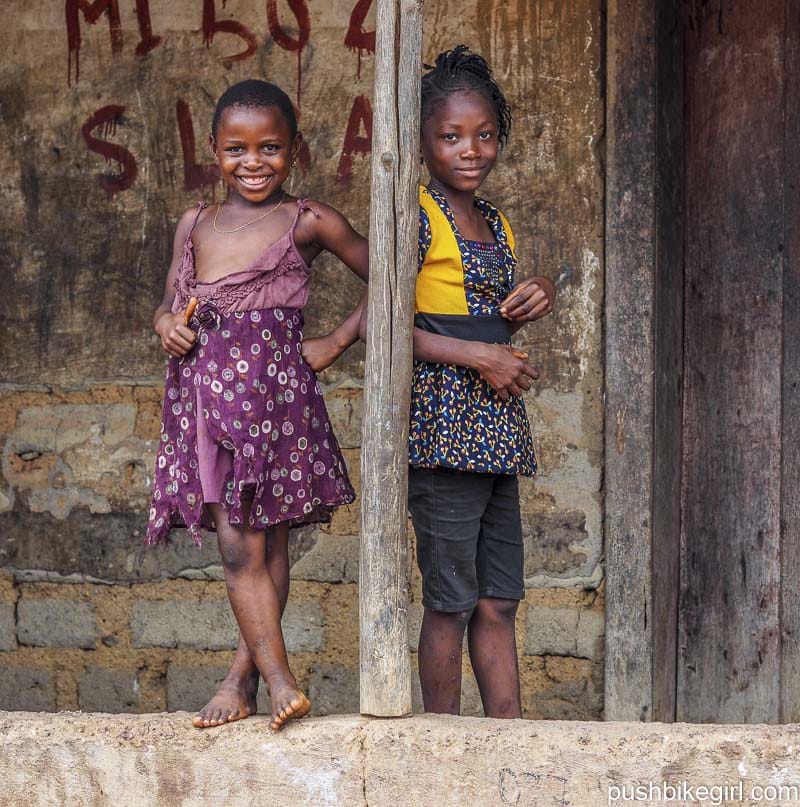
My natural tendency is to meet people on level ground as equals, preferring not to present myself as better or above them in any way. Now and then, I saw rich Africans in big cars, and often their manner was arrogant, but people seemed to admire and look up to them.
Out of curiosity, I decided to behave a bit differently and began inviting a few people for tea or a meal. I behaved as patronizingly as I knew how and was surprised to find how easily people accepted my manner as if it was the way it should be, even to the point of not thanking me for anything. The experiment didn’t last long, just not my way.
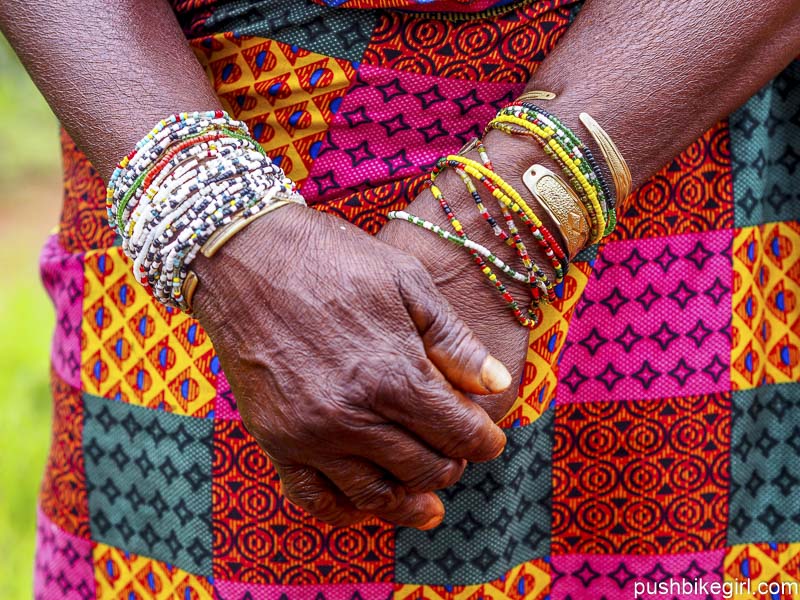
A priest facetiously told me: “Give them a dollar or two every day, and then you’ll keep them small. That way they have enough to live on and they’re dependent on you. They won’t get the idea of building something with it because they assume they’ll get enough money to be satisfied tomorrow.
But then he followed with “we need education, the children have to be sent to decent schools, only then can we solve our problems in the long run.”
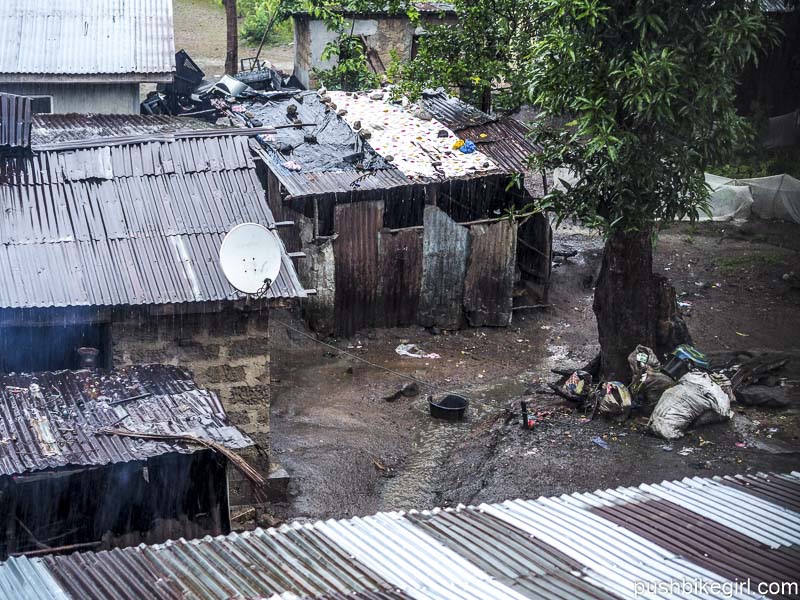
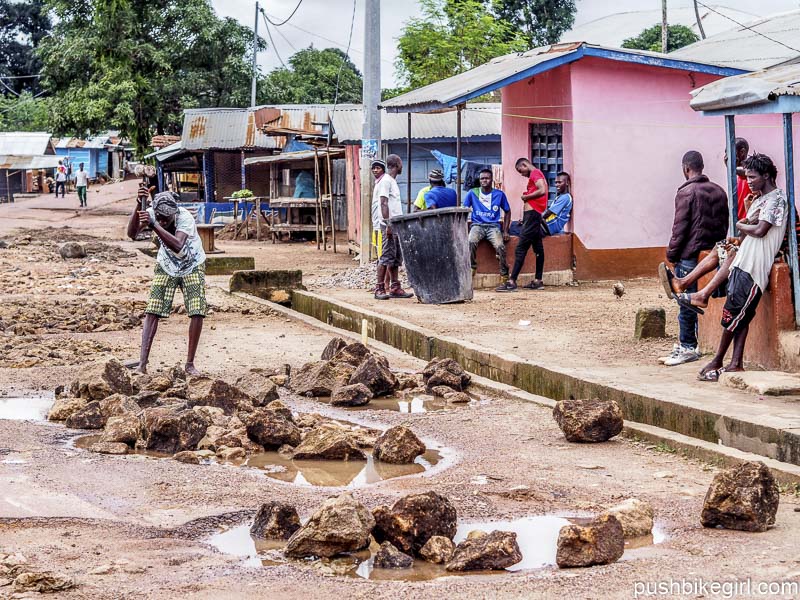
I didn’t feel well in Makeni. I had a slight fever and didn’t have any energy. I tested for malaria; fortunately, the results were negative. Otherwise, I had diarrhea, but nothing else tragic. I settled down in a room and wanted to recover and wait until I was fit again.
It poured and poured, and I asked myself every day anew how on earth it could rain so much.
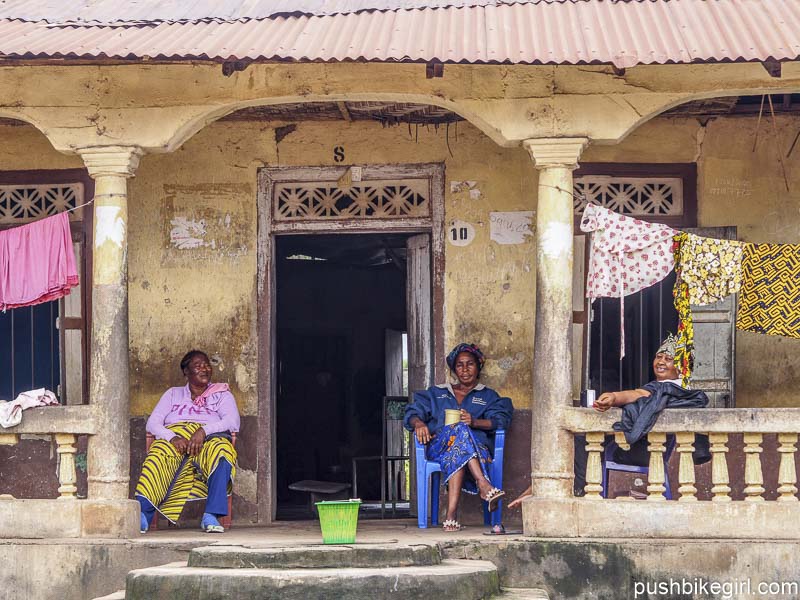
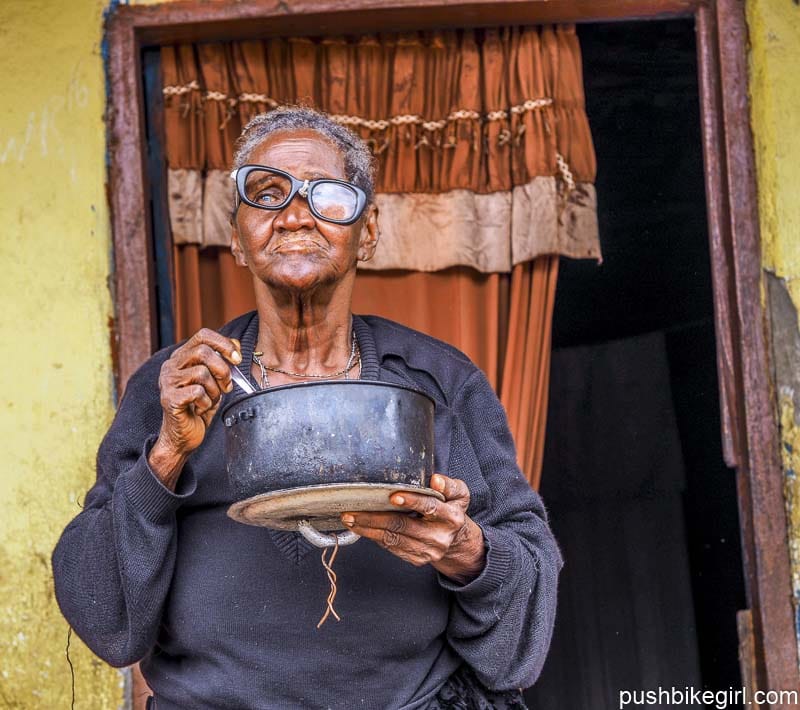
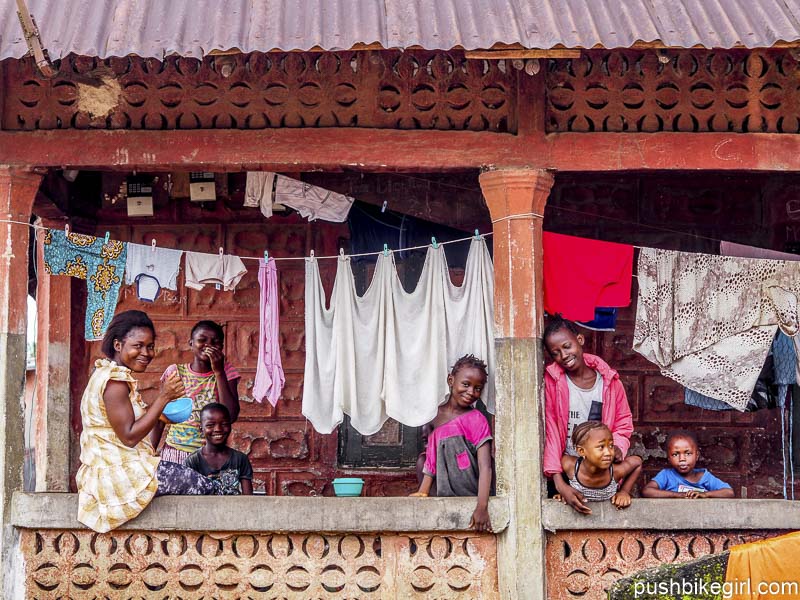
The place was pleasant. It did not take long, and the whole street knew my name and wanted to talk to me. As always, they were extremely friendly people.
If or when it happened to stop raining, the music in the neighborhood was turned on full volume, and I danced with the people on the street. The difference between country and city was, of course, immense, but even here, I couldn’t deny that West Africa is very special.
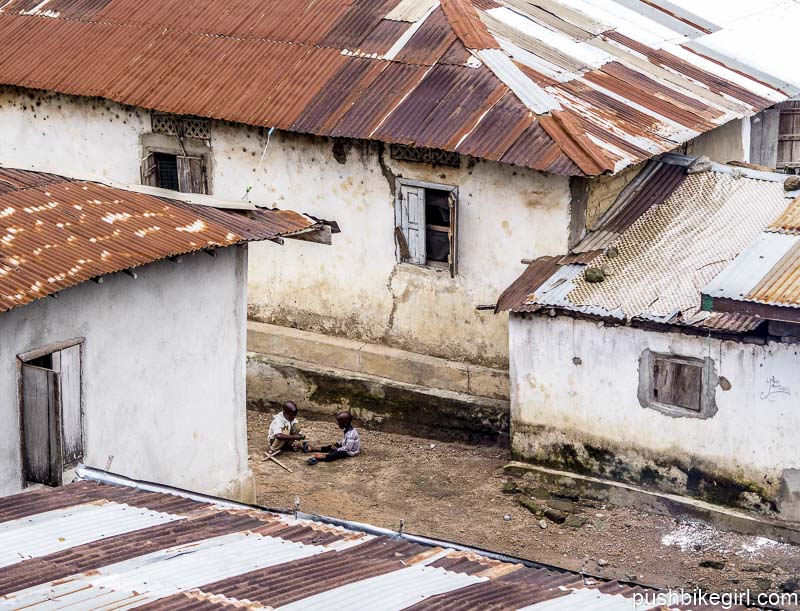
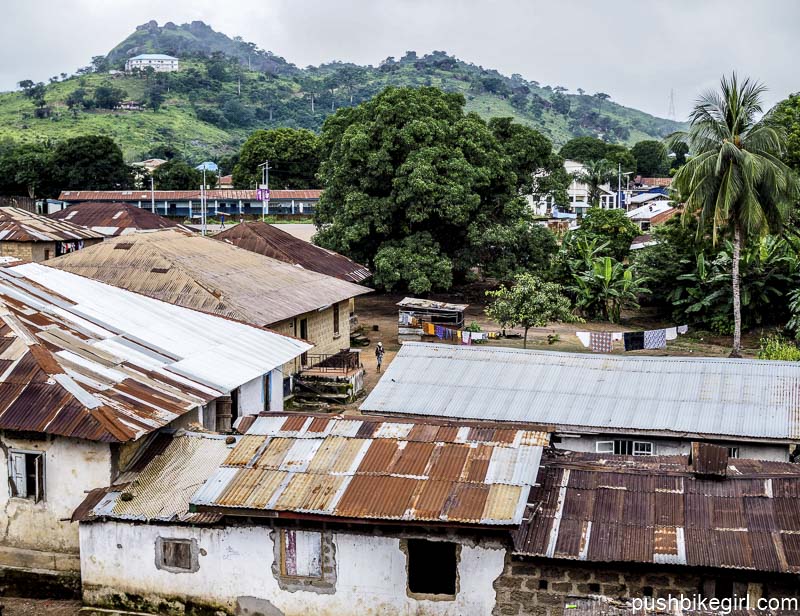
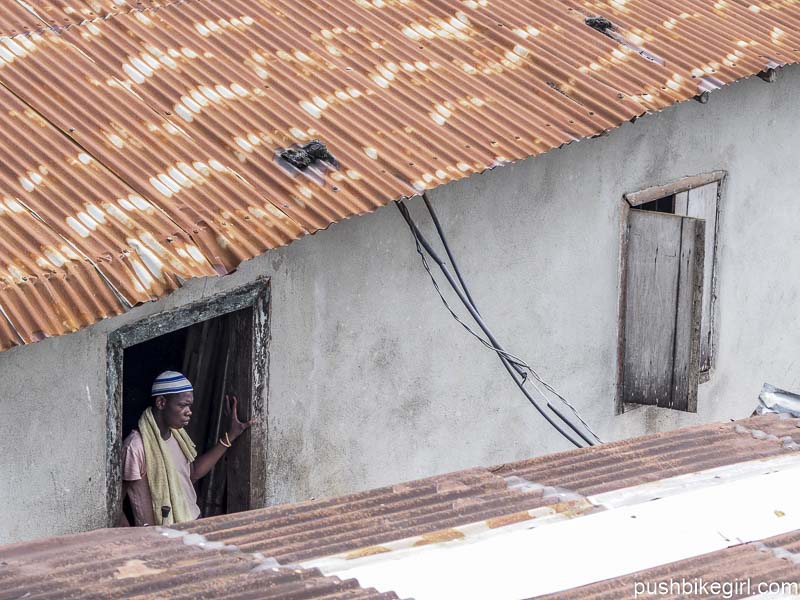
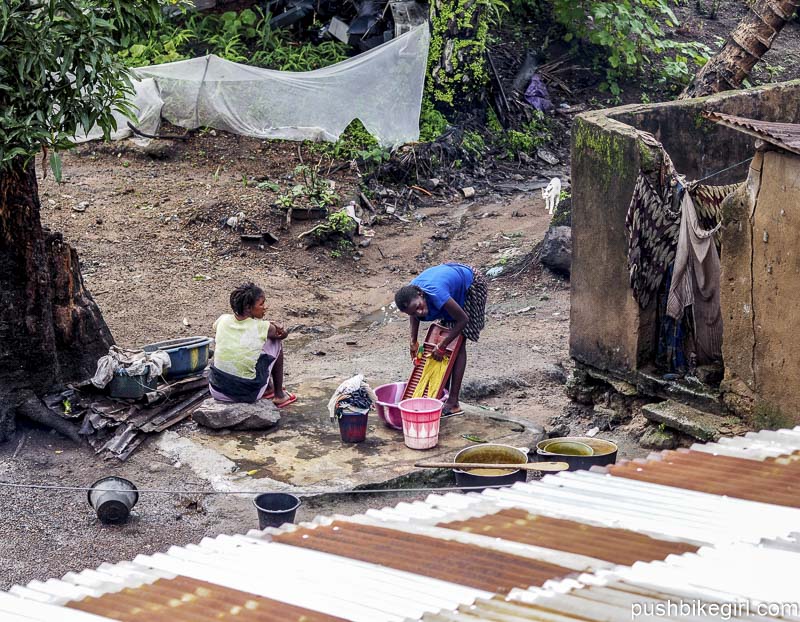
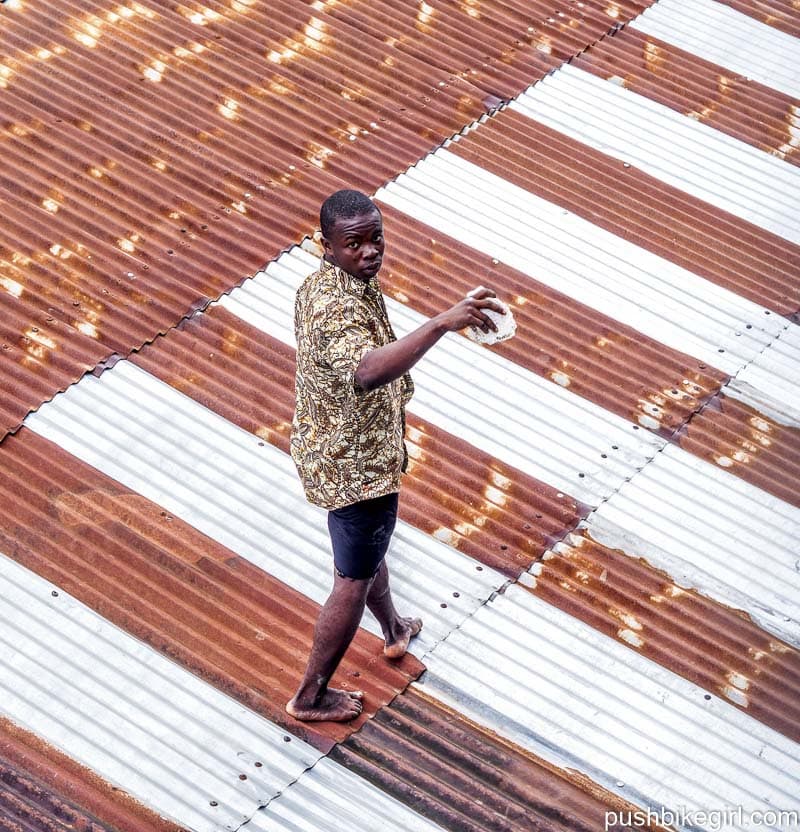
There were wells mostly behind or in front of the houses, running water was scarce even here in the city. But in my room, I had water from the tap, although not always. Also, electricity was more or less constant.
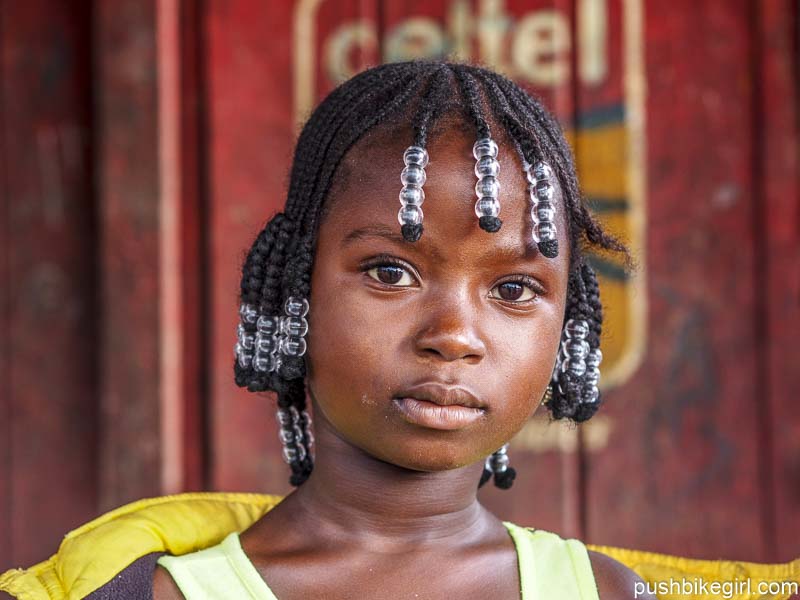
In the small hotel where I stayed there was a tiny restaurant. I had been there for seven days and had ordered a tea every morning and evening, so 14 times in total.
“I’d like a tea with milk and a little bit of sugar,” to which the same lady answered each time: “A coffee?”. “No, a tea, just like this morning.”
“Coffee?” “No, a tea. Like every day”. And I went with her into the kitchen and showed her the box with the bags, the milk powder, and the sugar, and she wondered every time anew what a strange order I was placing.
Even on the last evening, it was still “coffee?”. “No, tea.”
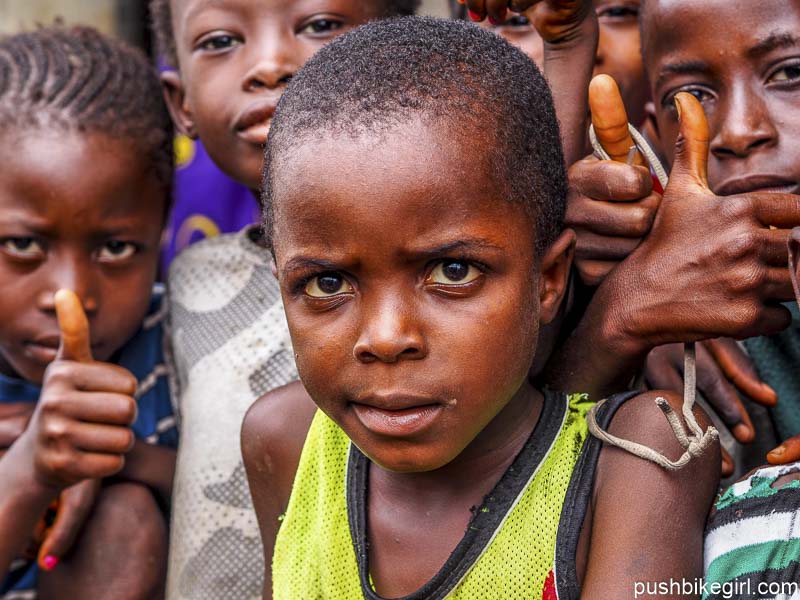
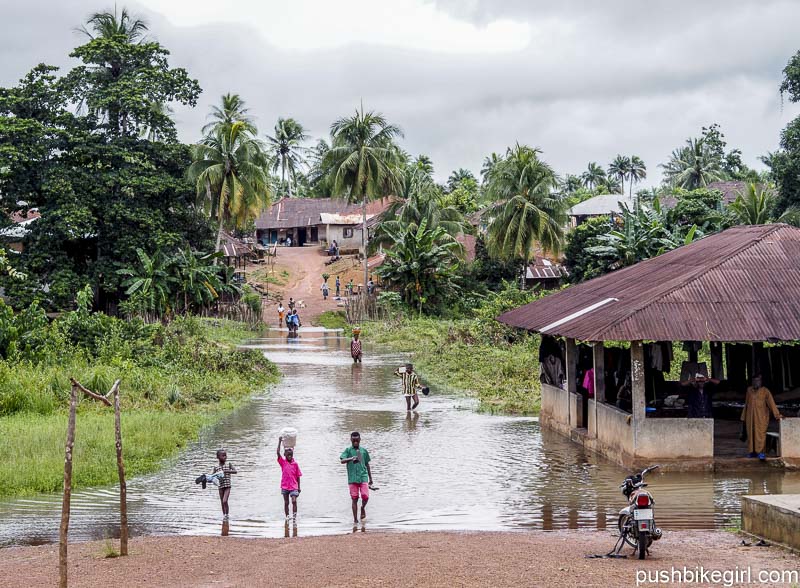
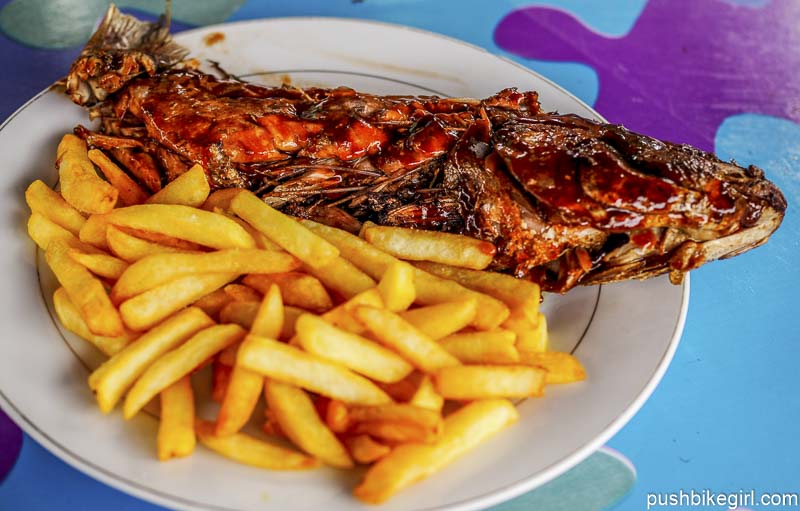
Nearby, two Indian fellas who had just opened a shop. Clean as a whistle. Everything neatly arranged on the shelves, super friendly and helpful. From the outside, the shop didn’t look African in any way.
“What can I do for you?” and we started talking. They were not happy. “We can’t talk to these people. The culture is very different. Most people aren’t educated either, and it’s really difficult to make friends here. We’re homesick.”
Not far away was a Lebanese man who had a hardware store. It was tidy there, too. He was friendly, and it was obvious we both enjoyed our conversations.
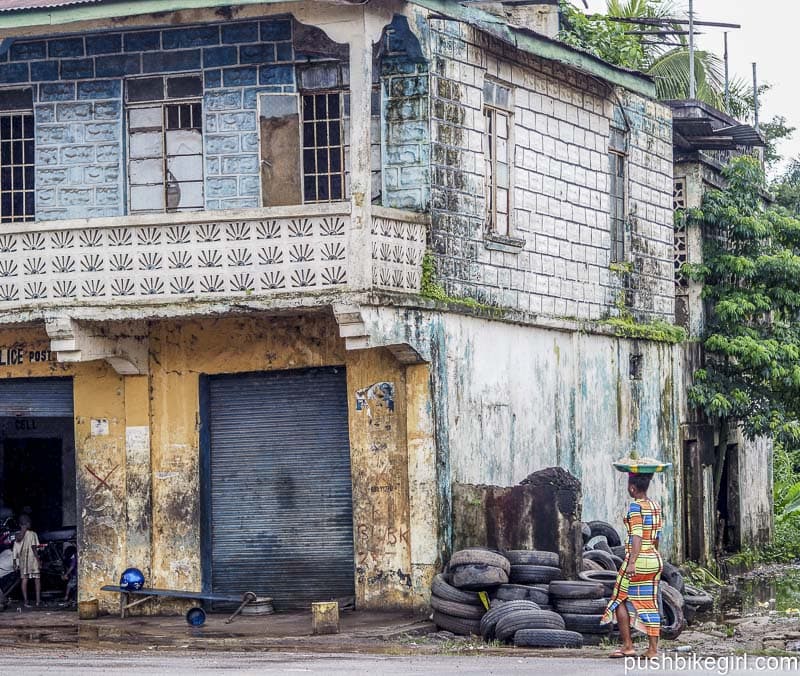
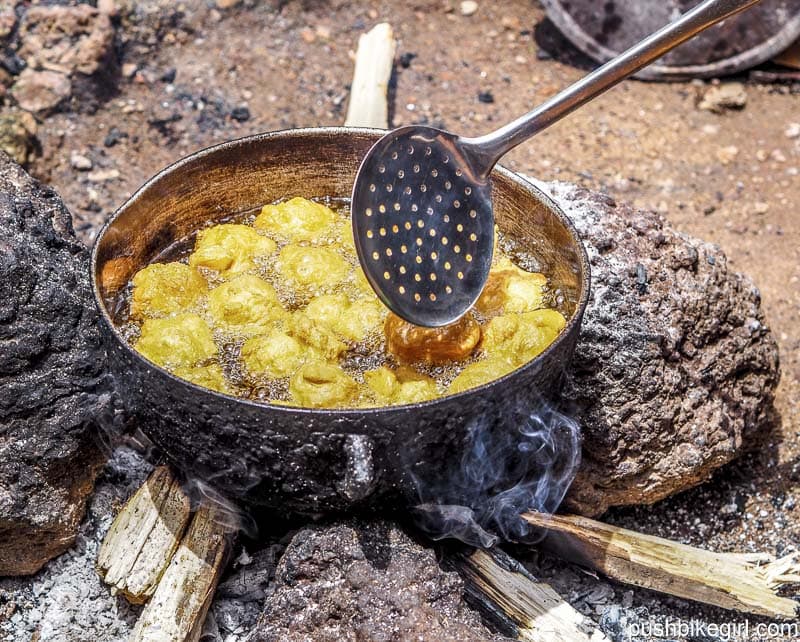
What works great is the exchange with other cyclists who are also on the road in West Africa.
Two Swiss guys Adrian & Fabian who were farther East and were always willing to share helpful info. There was Jörg, who I was always happy to talk to, and especially Laurent and the Portuguese couple Rita & Fernando.
Interestingly enough, Laurent was the only one besides myself who hadn’t suffered from malaria; some of the others had even had it more than once.
The Swiss fellas told me in Lunsar, about 80 KM away, Brits and Americans had started up a bike shop project, where I might be able to replace my chain.
I contacted the owner, and he promised to send a 10-speed chain to Makeni by bus. It would arrive that afternoon, and I was supposed to pick it up at his buddy’s, whom he had trained. The chain came, but it was an 8-speed chain. So, he sent another one, and three hours later, another 8-speed chain arrived.
“Tell me, do you have a 10-speed and only accidentally sent an 8-speed twice?”, I asked him on the phone. “Yes, yes, I am sorry about that, but I have a 10-speed, for sure”.
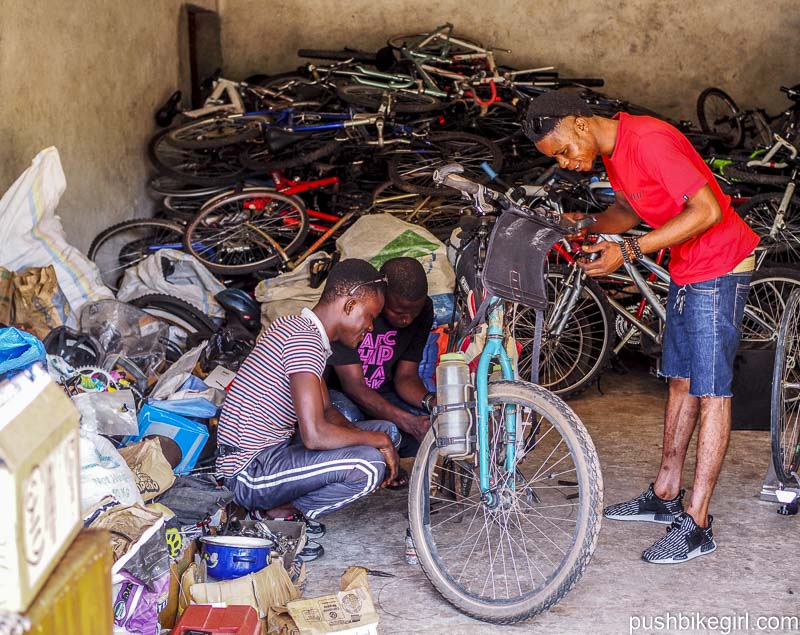
On the sixth day of my stay, I developed a bad rash on my arms. I could hardly sleep that night, but 24 hours later, magically, it had vanished, so I continued cycling, having decided to go to the bike shop, even though it was not on my route.
Searching through the many boxes and bags in the bike shop, we found everything but a 10-speed chain. But he was able to fix my gearshift and did a great job.
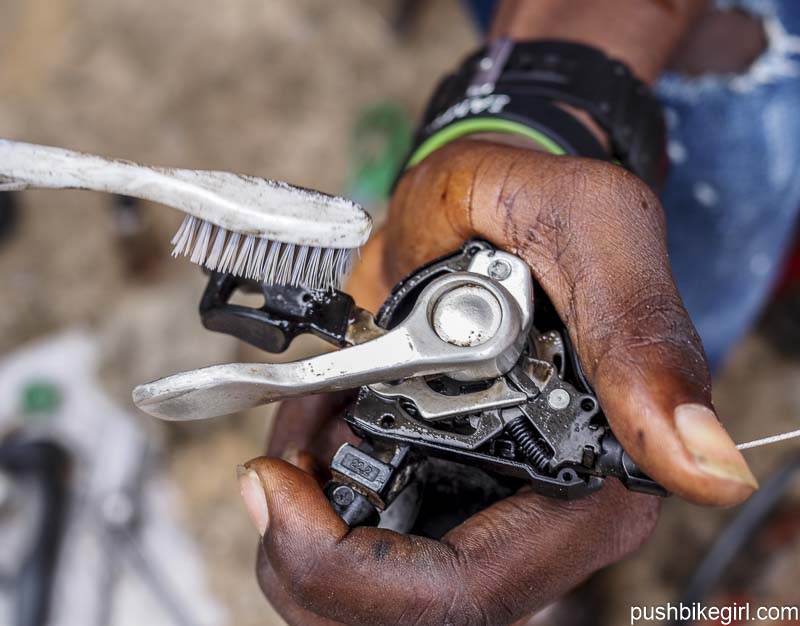
Pedaling on, I received a not very friendly reception in a village with people shouting, “money, money,” and I wasn’t surprised when I came upon the Plan International sign.
Soon I found myself standing at the edge of a raging river where I was asked, “Can you swim?”.
“Of course, I can swim, but I have no intention of doing so. Will one of you, take me to the other side?”.
“We have no life jackets on board, and you have to paddle yourself,” they replied. I knew they would try to rip me off, and also wondered that in this out of the way place they mentioned life jackets.
“Give the children sweets,” shouted one of them to me.
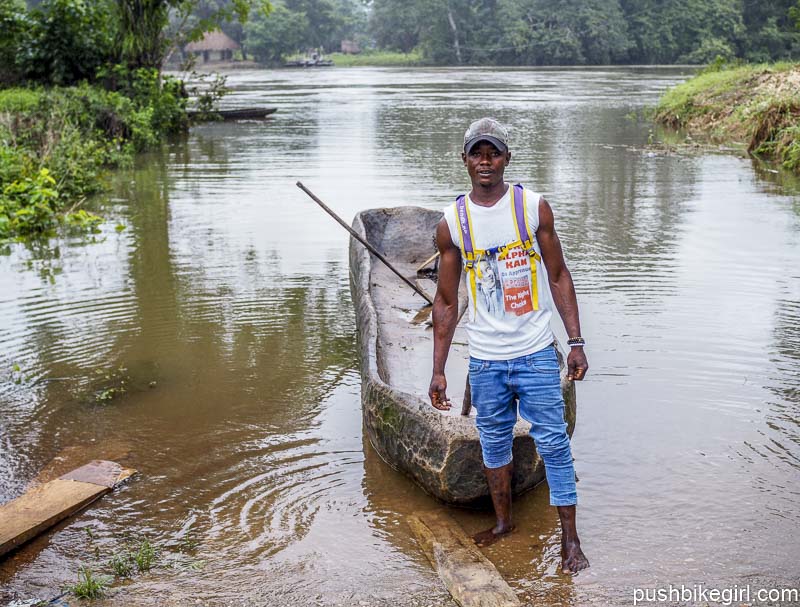
I saw a farm: greenhouses machinery. Wow, what’s going on here, I bet a foreigner lives here. I asked the security guy, “Who lives here?” “Francis,” the guy said.
“Well, where is he from? Maybe France or England?” “Yes, he’s from England,” and he opened the gate for me.
Francis was from Uganda and was a nice guy. We had a great time sharing our stories, and these easy hours of conversing were food for my soul. By the way, Francis can’t swim and had innocently asked the fellas at the river if they had life jackets, now they tease him every time he has to cross the river.
With fresh Dutch cheese in my pocket, which Francis had brought back from Freetown, I cycled on in the pouring rain towards the main road.
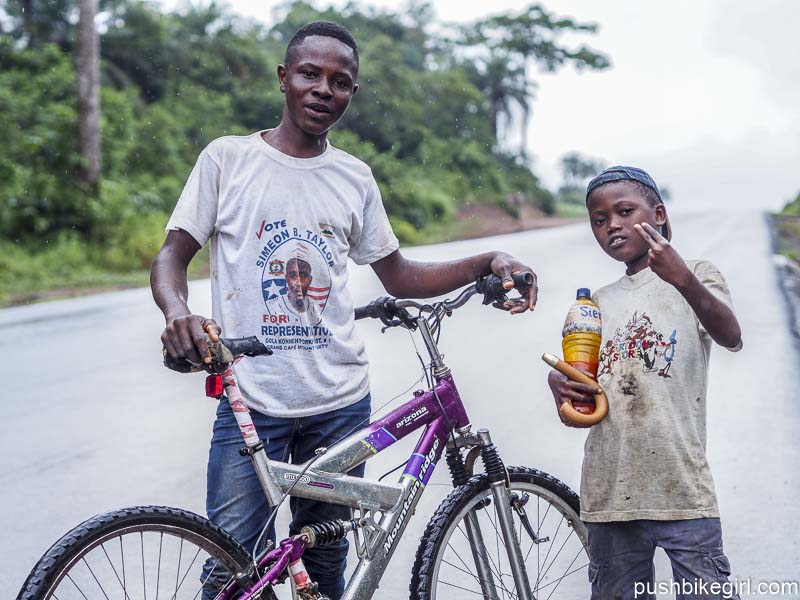
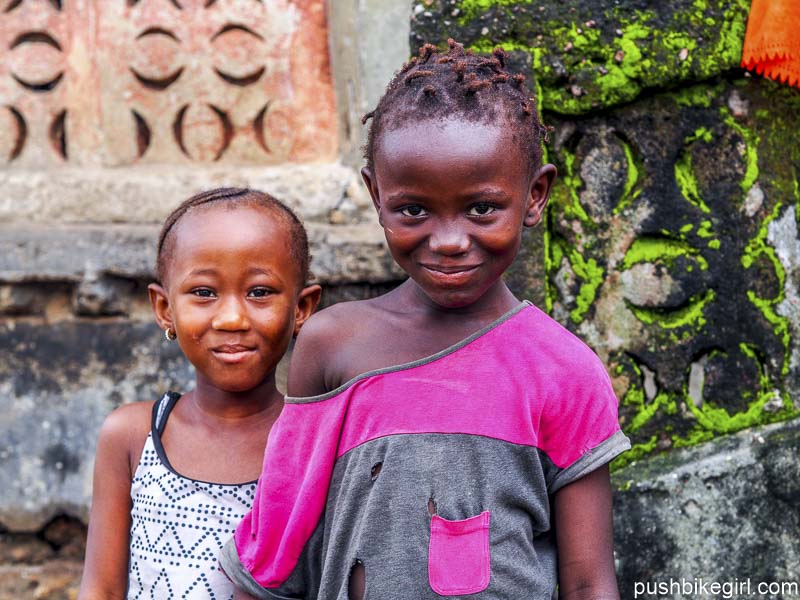
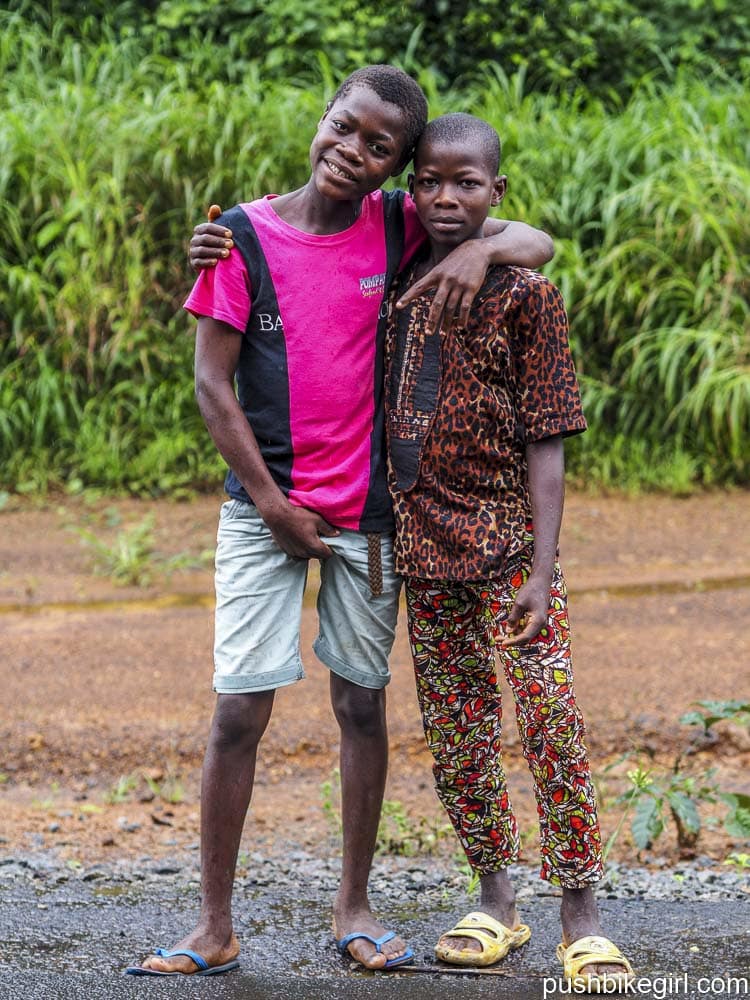
A brand-new blacktop road awaited me. Funded by the EU, it felt almost like Christmas and Birthday together. I was so sick of the mud and just wanted to get out of there.
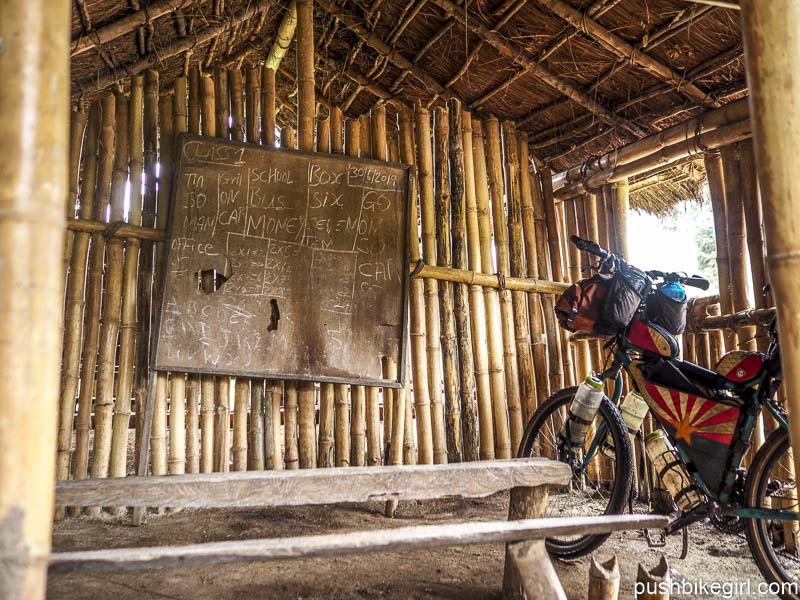
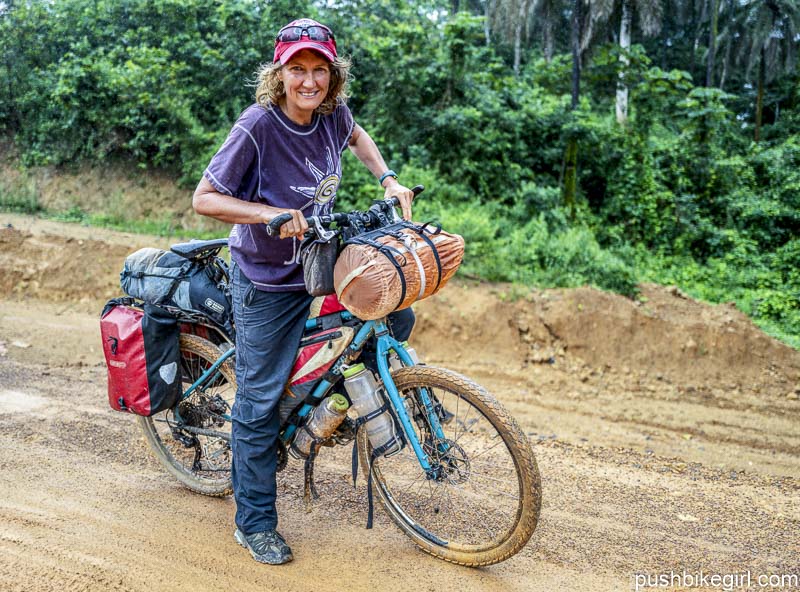
Main roads most often have much more to offer in the way of supplies. I treated myself to a Coke and sat down next to the shop to have a break.
It didn’t take three minutes before the local mooches surrounded me.
“I’d like a Coke too,” said one. “Then go to the store and buy one,” I answered him.
“I don’t have money, you buy me one, you’ve got money,” he said to me.
Without a word, I packed up, cycled about 300 meters further, and sat down again. Three minutes later, the same song started again from the beginning.
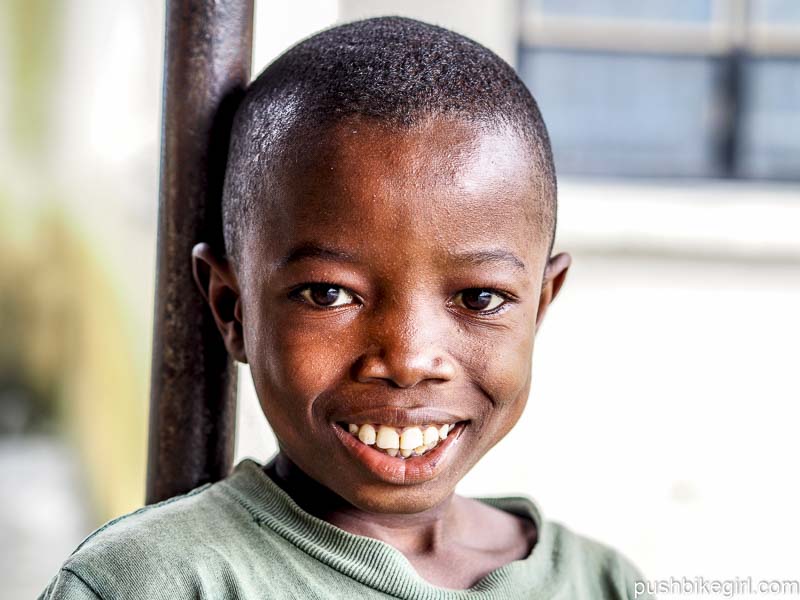
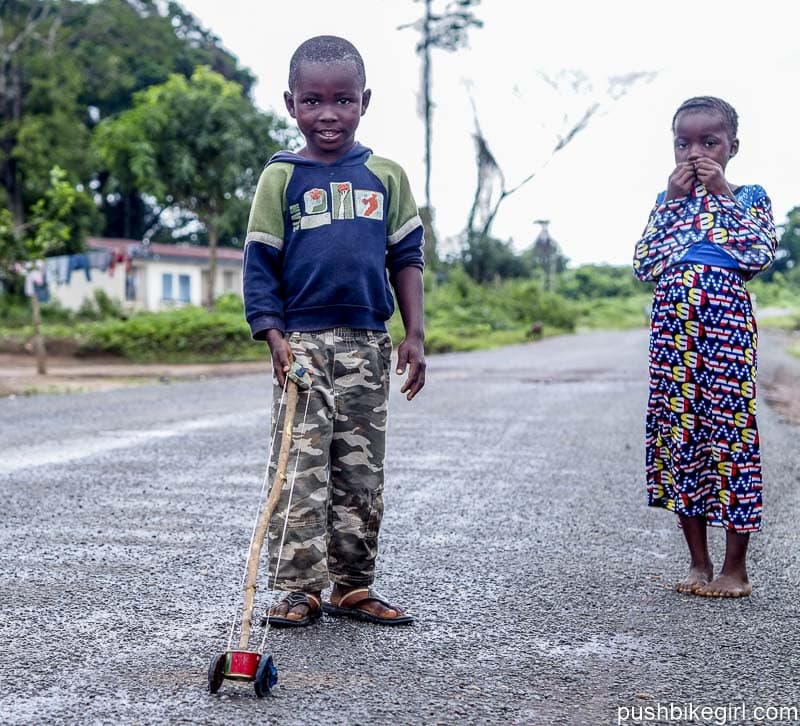
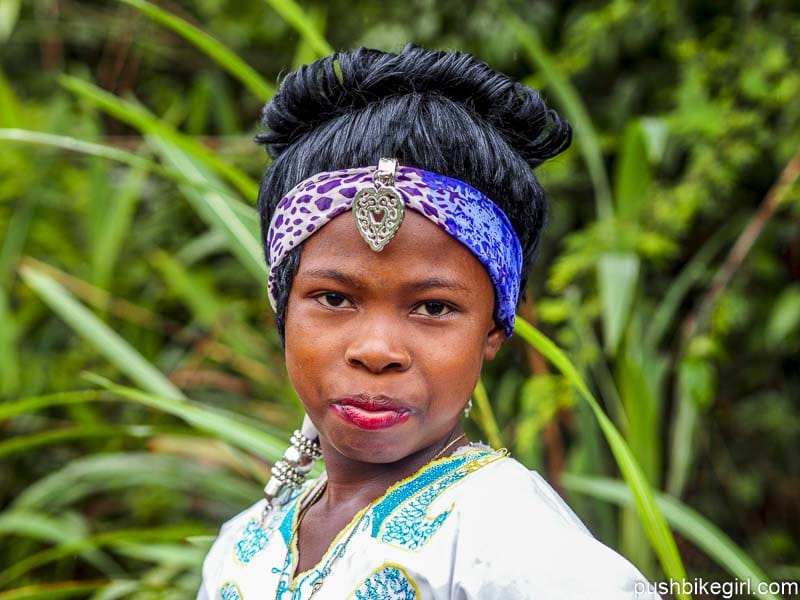
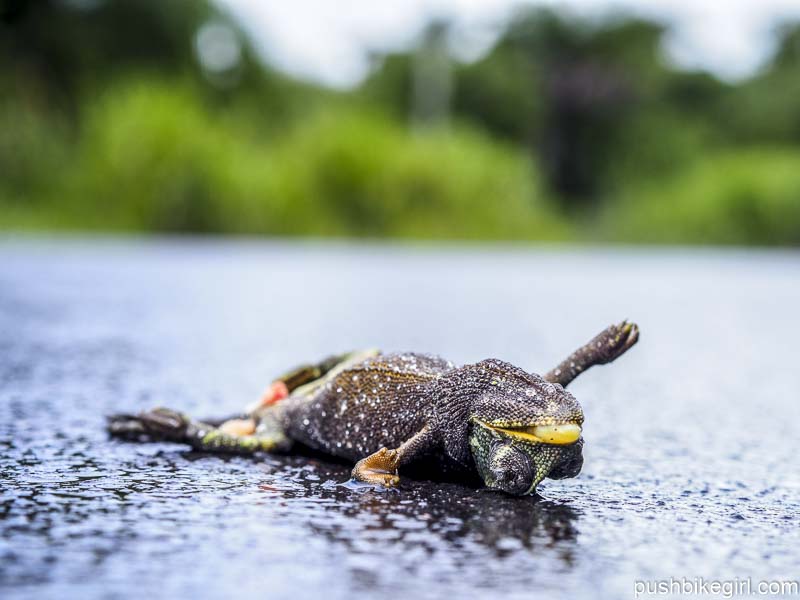
In Bo, I stayed with another priest. Priests are often not only educated, but most of them are also wealthy compared to most of the population, the church makes this possible.
There is always plenty of food and almost always servants.
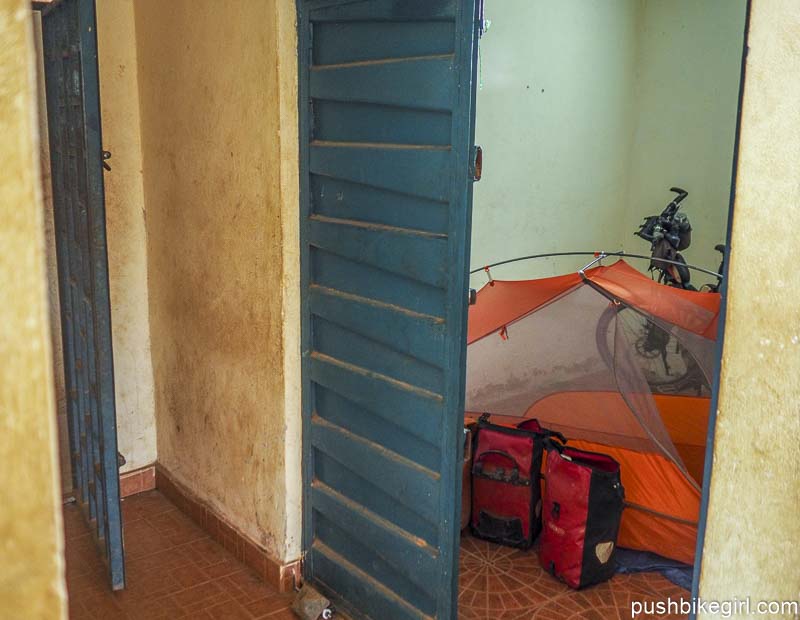
Another night I spent sleeping in a jail, right next to the cells, a prisoner watch as I pitched my tent.
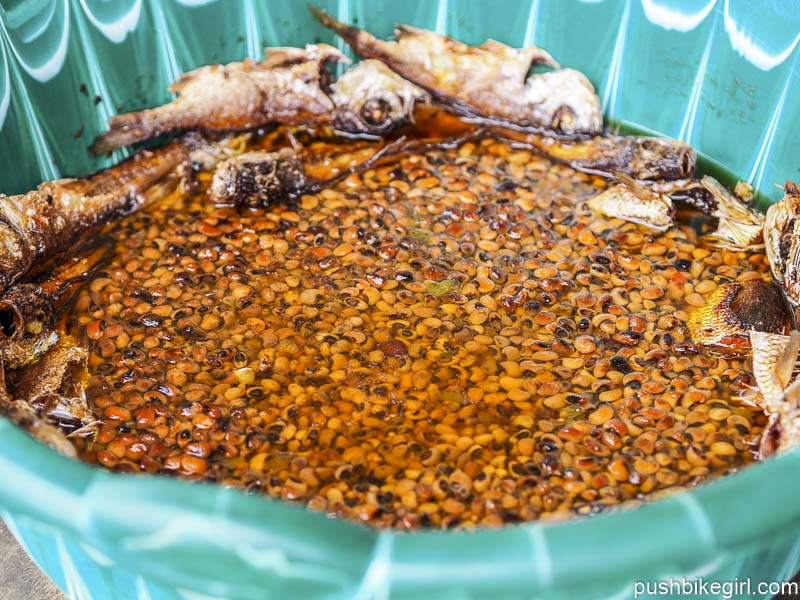
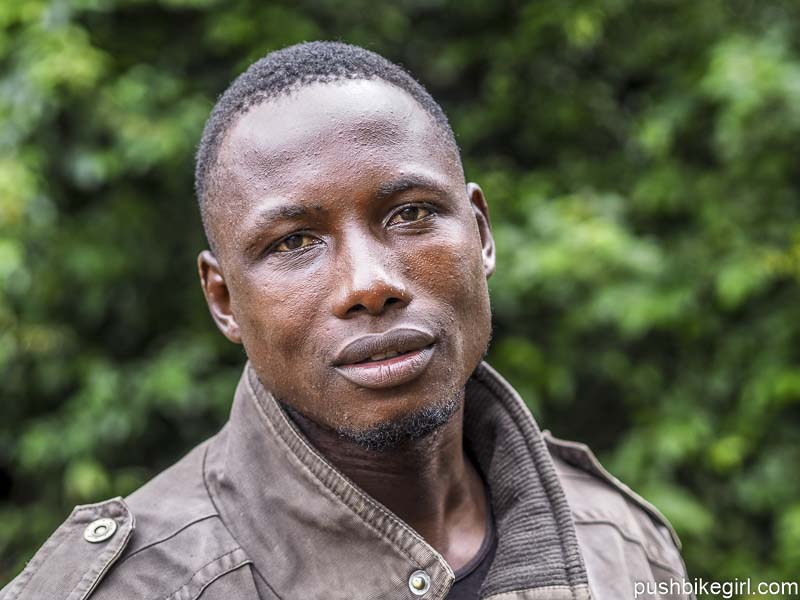
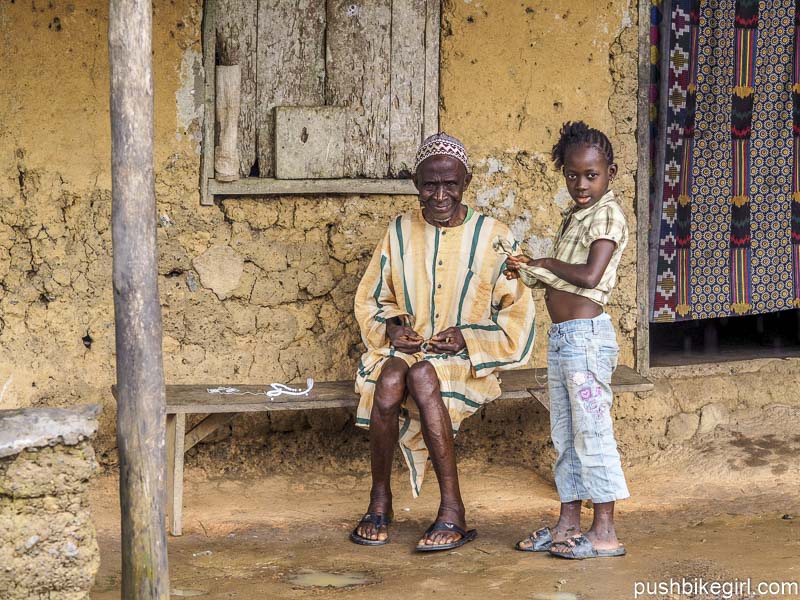
The beautiful blacktop ended, and about 80 KM before the Liberian border, the mud resumed. There in the mud, I met Frank from Hamburg, the site manager, responsible for constructing the road.
The first white man in about five weeks, and again mutually enjoyed conversation, as he let me stay overnight on the company premises. I also enjoyed an interesting conversation with an engineer from Ethiopia.
Additionally, I enjoyed a hot shower, my second since Morocco.
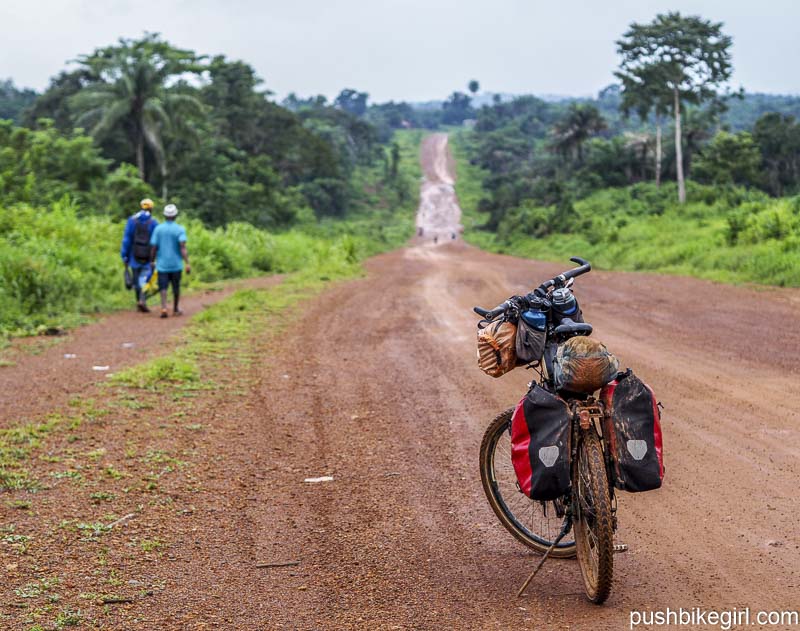
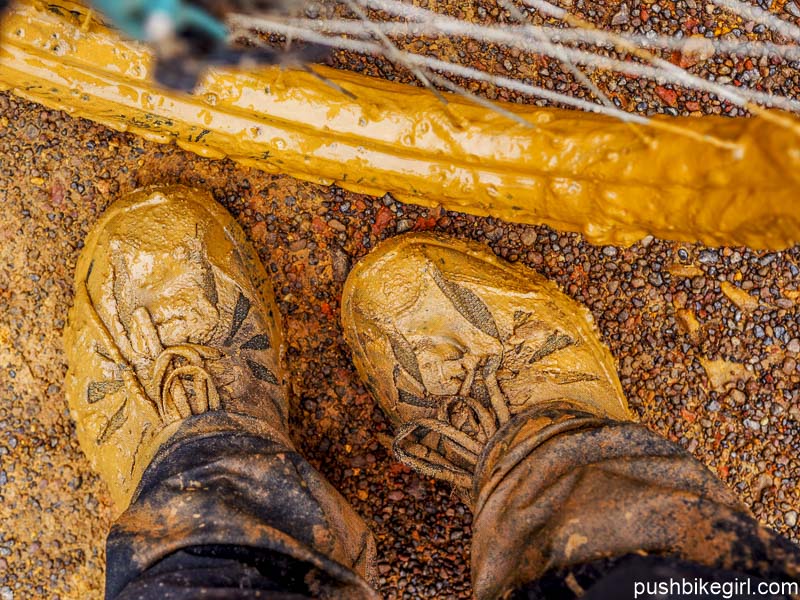
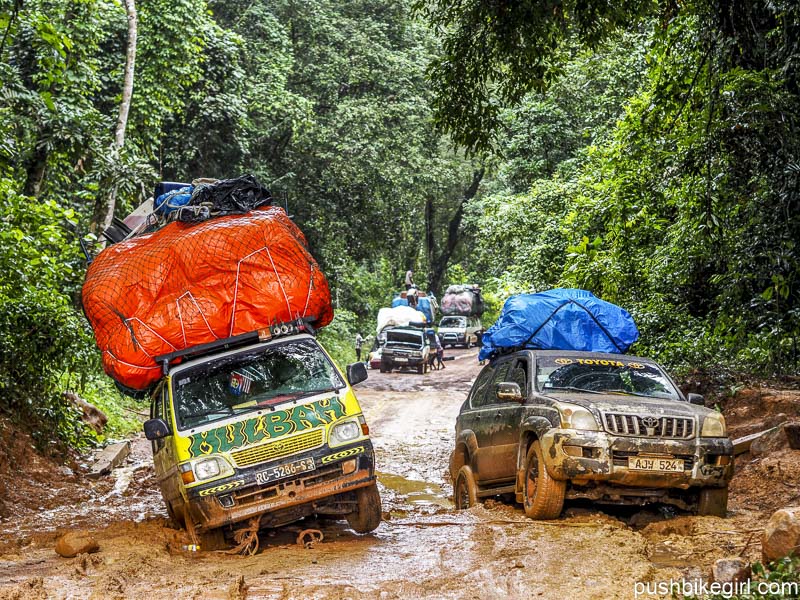
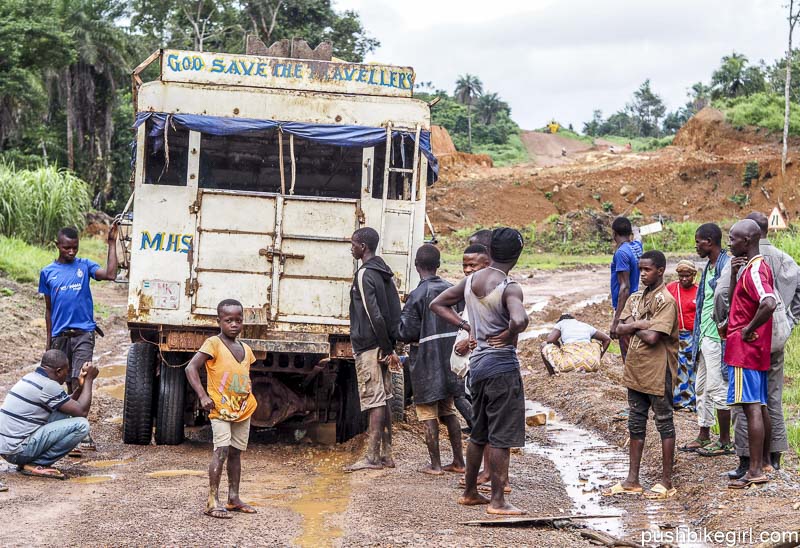
Rain forest surrounded me; vehicles were stuck in the mud; people clustered, waiting at the roadside for solutions.
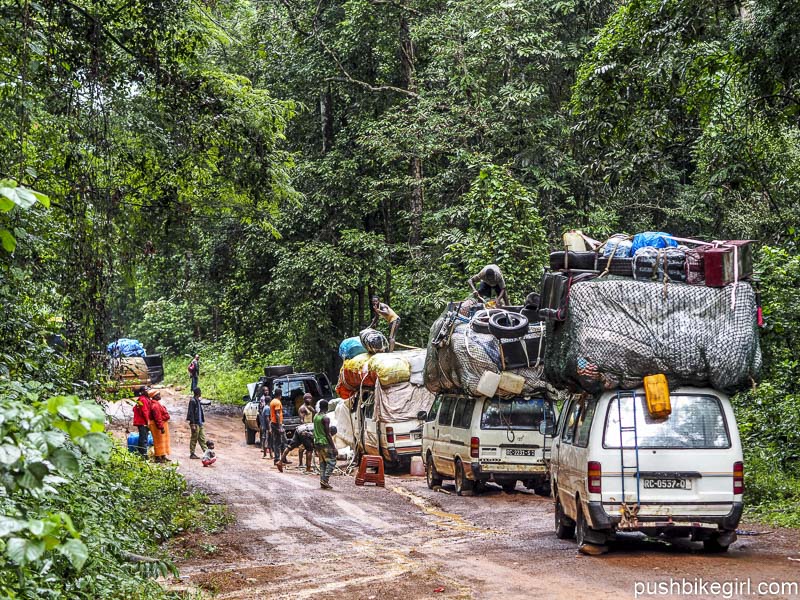
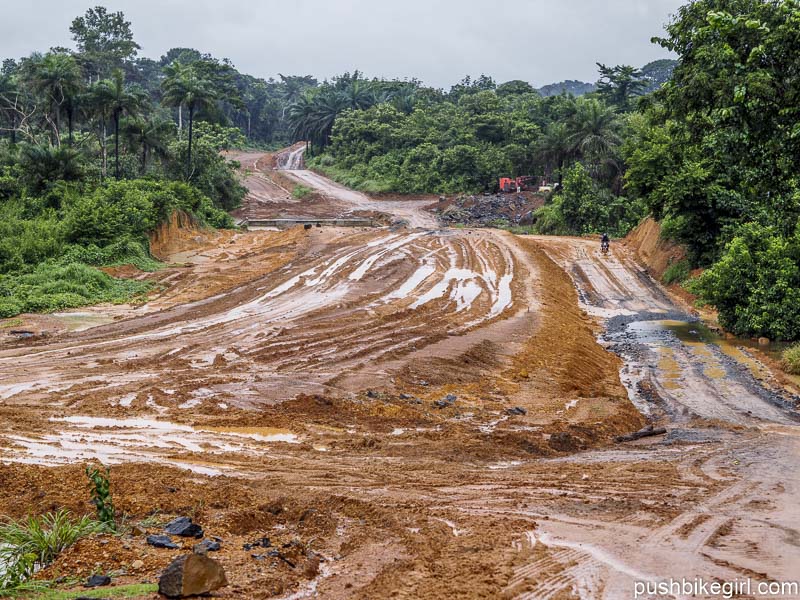
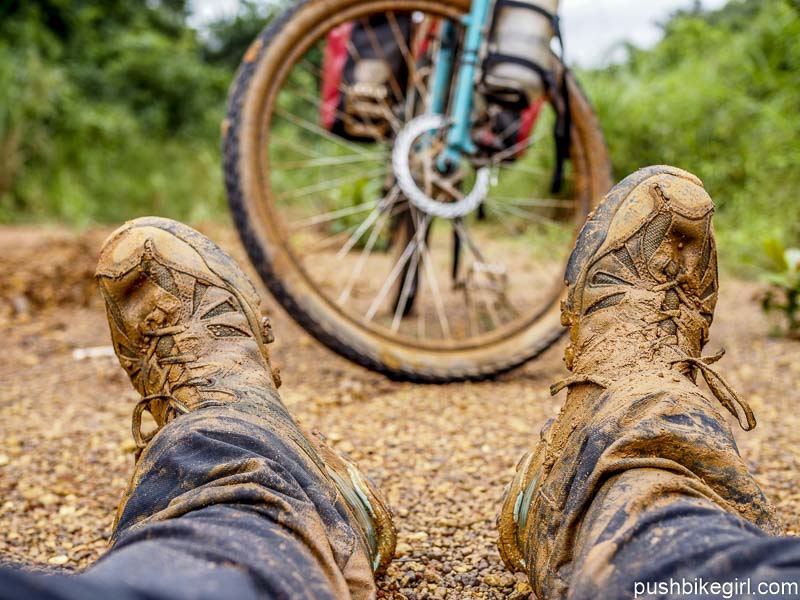
Here I met two very young doctors from Holland on their way back from a trip to Ghana. They told me they run a whole hospital, and do their best to help, but sometimes they are just overwhelmed.
“Yes, we are far too young and inexperienced, but if we weren’t here, more people would die, and older, more experienced doctors don’t want to do the job.”
Sometime later, my mother sent me an article about two Dutch doctors who had contracted Lassa fever in Sierra Leone and had been flown back to Holland, where one of them died. Whether it was the two boys, I do not know.
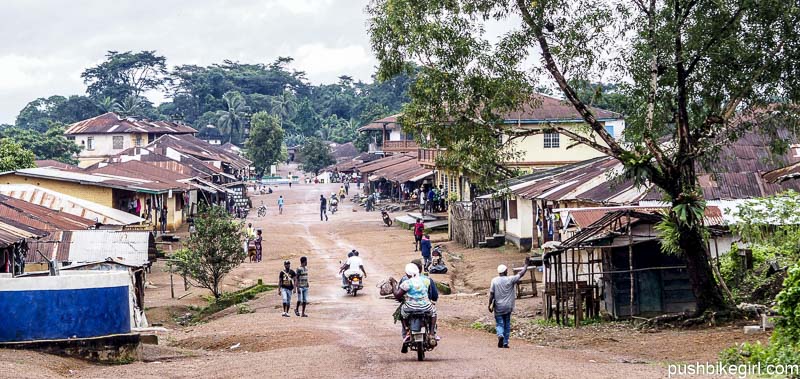
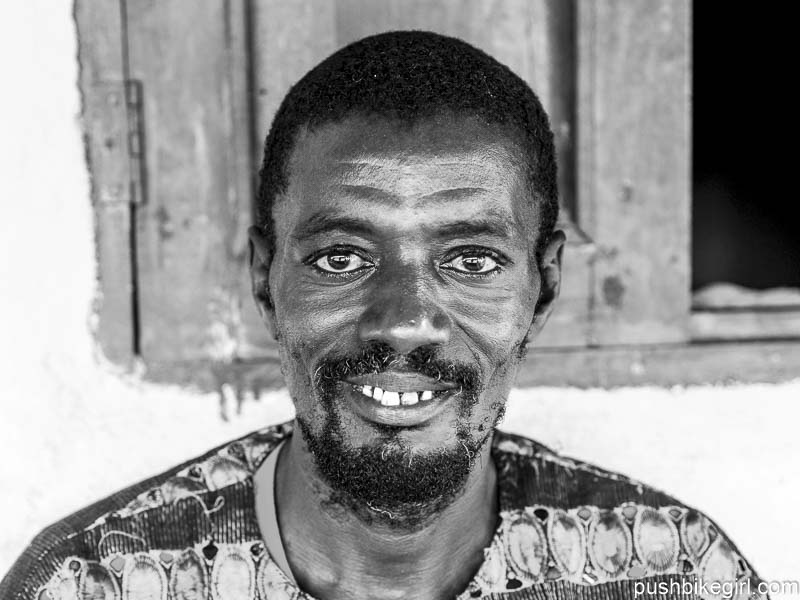
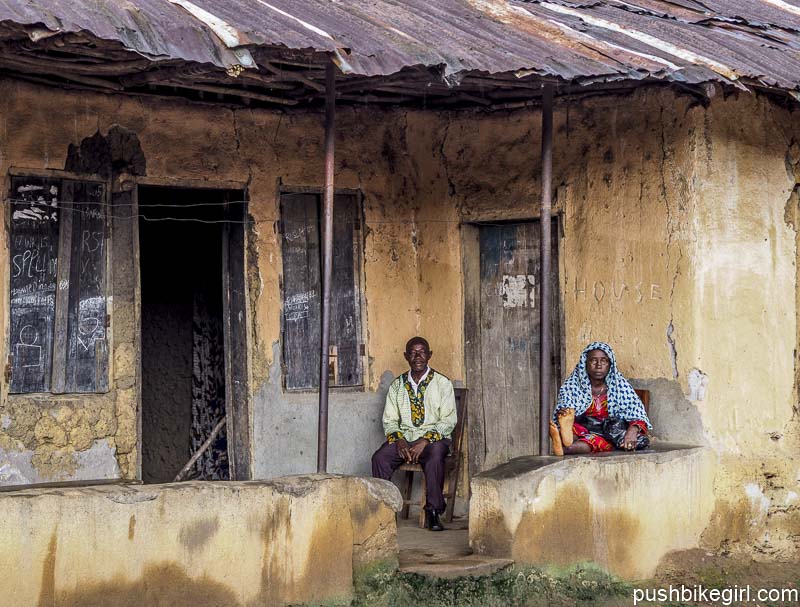
Frank, the engineer, also sent me an article about a mysterious case where a German was found dead in his Overland truck. Not a mile from where I had enjoyed my second hot shower.
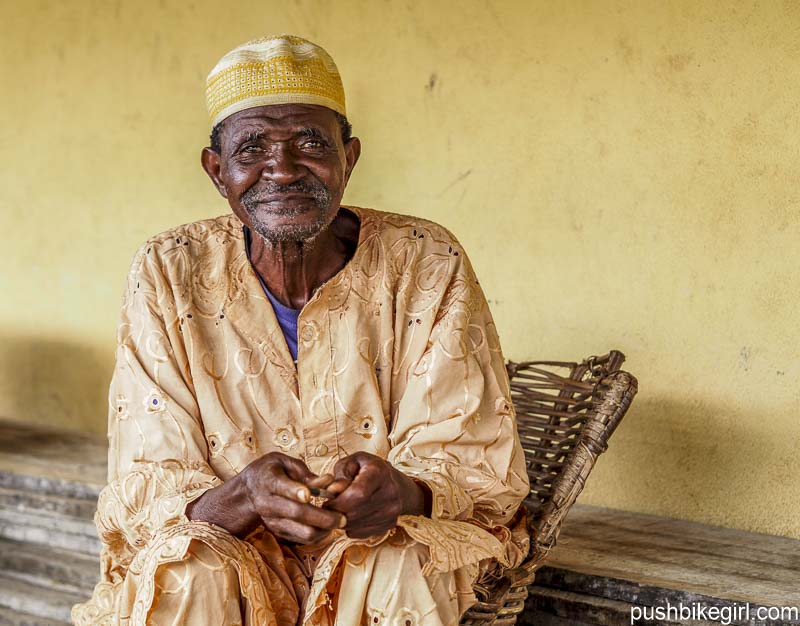
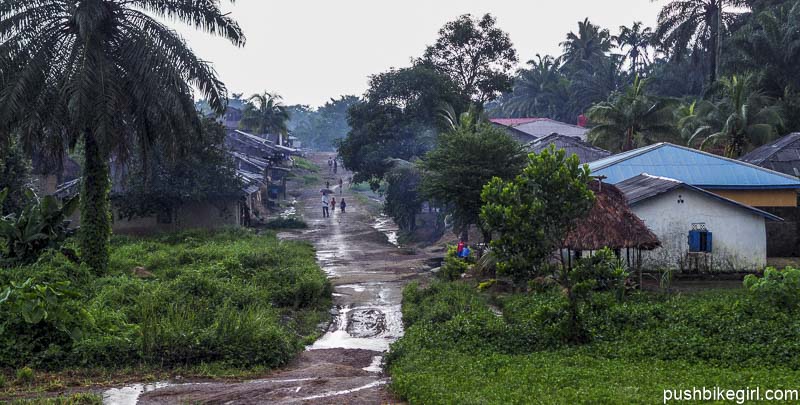
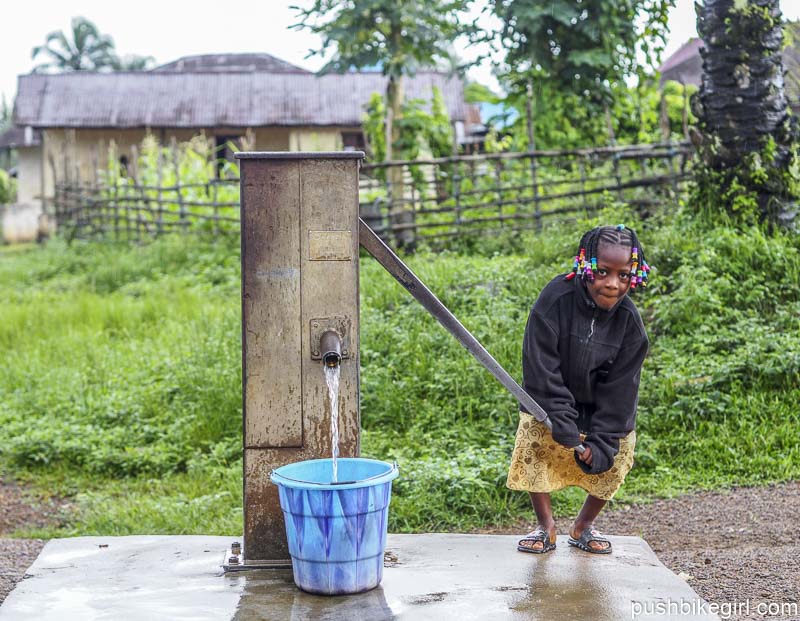
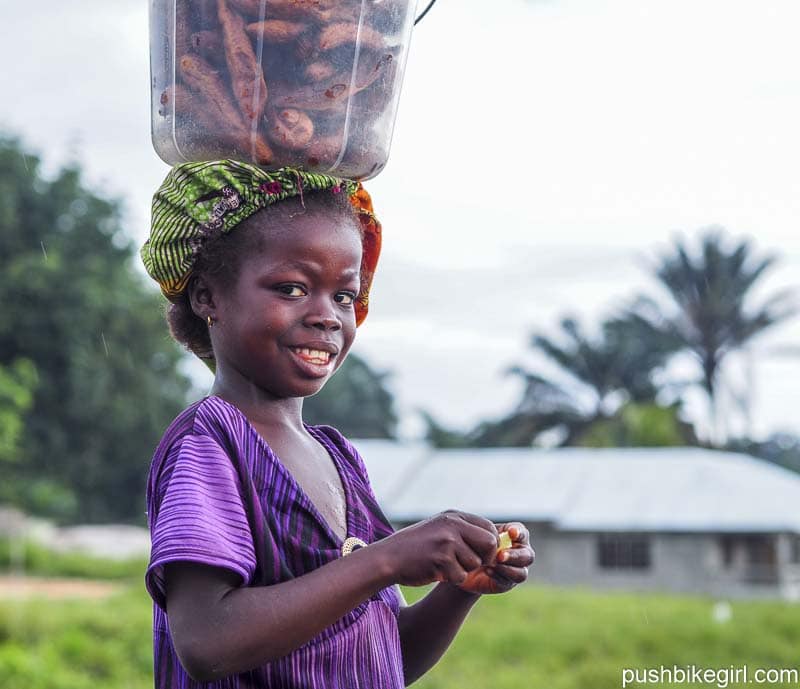
It was almost dark when I reached the border. I had spent one month in Sierra Leone and as always, I had learned and experienced a lot.
You are very welcome to share the article among your friends – thank you 🙂
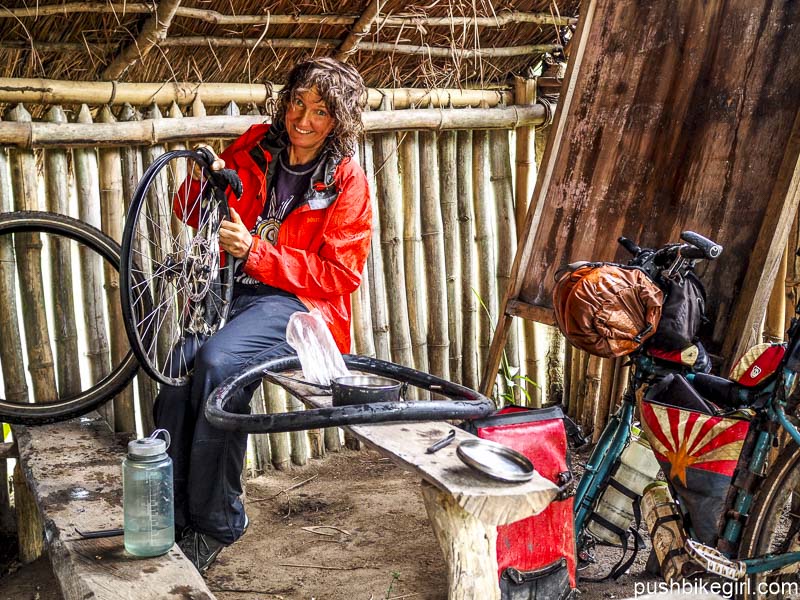
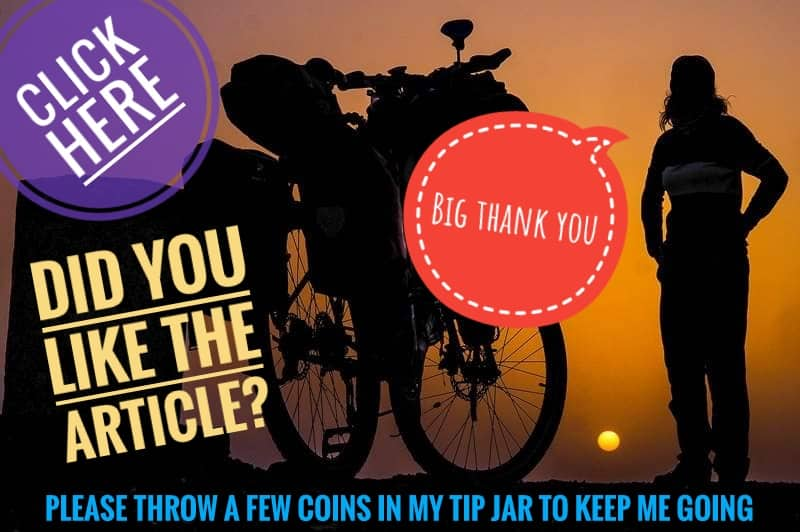
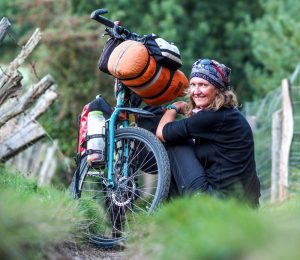


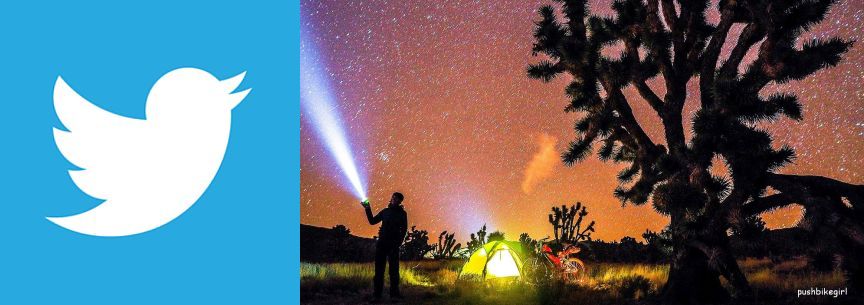

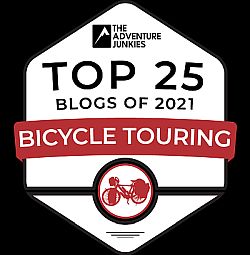
“I decided to stay true to myself and to portray the countries as I experienced them.”
Hi Heike,
Please do “stay true to myself” and do the best you can to ignore the critics. Your insights and photographs are greatly appreciated. You provide great insights into the countries you travel through.
I can’t image how you keep going in those extremely difficult conditions – but know that there are people wishing you the best and hoping you can continue on in good health.
You are the only travel writer I’ve read since Dervla Murphy – Full Tilt: Ireland to India with a Bicycle – you two are very special persons!
Big thank you David! What a superb compliment!
Sending best wishes….Heike
Great! You gave me totally new insights and I am learning a lot from you. Just gave it to my son to read. He’s preparing for a year in maybe Tansania or Uganda. I Know it’s totally different there, but your way to think and to look is very precious. Thank you. I wish you all the best. You are a very special woman!
Hi Heike,
fantastic Photos! Seems like a tough place to cycle in the rainy season.
I appreciate your honest description and can relate to many of your observations. Travelling or living in West Africa as a white person, dealing with the requests for money is always an issue. I think it’s important to keep in mind that a big reason for this is that many white travellers actually hand out money and stuff all the time. I have seen this a lot, people giving tips for nothing, people carrying pens or sweets to give to children and especially if there isn’t many tourists, a few can build up this kind of expectation. I have experienced it on my current South America trip as well and I think it would happen in Germany if travellers turned up and handed out sweets.
In terms of development it’s important to remember that colonialism in Africa was different from other parts of the world and that the African countries became independent quite recently, Ghana was the first and that was just 1957, much later than in South America e.g. The effects of centuries of brutal oppression, the kidnapping of hundreds of thousands for slaves, the restructuring of geographies
and societies don’t disappear so fast. Then the Cold War, the strucutural adjustment programmes of the 1990s – these are external factors that hindered or even turned back progress in many African countries. I’d be very careful with interpretations that result in the assumption of an “African culture” that impedes progress – as you write it’s a huge and diverse continent.
Well, I feel what you mean and you are right not to go too easily for interpretations that there is something in African cultures that impedes ‘progress’. But we just cannot throw it over board neither. Asian countries do not have a radical different colonial past but look there they are now. Was recently in Madagascar, the Highlands inhabited by people with Asian origins and the coastal areas from people with African origins and of course very different mentality and ways to look at life. One interpretation I heard is that people in the coastal areas don’t invest their revenue for a more affluent living and pretty quickly spend their money, after for instance the harvest, because is impossible to keep the money as their communities will find ways to make them release and share those resources. So better spend it immediately…. Certainly not the only reason but I believe there are reasons to find in their culture.
Hi Heike,
Just stumbled onto your blog the other day – being busy at times to prepare for a year’s bike ride in OZ in the foreseeable future. And really like the way you put your thoughts on paper.
Even though not having been to Sierra Leone I have worked in Malawi for 2 years. with VSO, and can relate to quite a few things you say. Since then African countries always have had a special place in my heart even though I have not been back since. Though I do not know if I would dare do that on my own on a bike – though would love to. You are one brave woman!
Love your photos, they are really good at catching the feel and lay-out of the land. Keep up the good photo work 🙂 – maybe you should publish them in a book or so…
Looking forward to hearing more about your adventures and enjoying your photos. Stay stafe and healthy.
Regards,
Inge
Wow Inge,
big thank you!
All the best for own trip to Australia….still one of my favourite countries!
Cheers Heike
Fascinating as ever! Thank you for sharing your honest thoughts and observations.
Glad you liked it!
Your positive feedback is much appreciated.
Best greetings Heike
Hi Heike,
Truth is in such short supply in these days of political correctness. Please be courageous and continue to speak truth. I was once told the earth is a self correcting organism, take Chernobyl for example. Our world and lives are cyclical so don’t despair after disaster there is renewal, although we may not live long enough to see it.
Stay strong,
Michael
Hi Michael,
thanks for your thoughts and support!
Best greetings Heike
Hello Heike,
What an insightful blog that you’ve shared, thank you!
I greatly admire your grit and determination, for reporting on your first-hand experiences with honesty and without prejudice, whether they be positive or negative.
Please don’t change, not for anybody or anything, and remain true to yourself. You have a gift for story-telling, for photography and bringing across your message. Your are an inspitation!,
I will be taking the plunge later this year on my very own bicycle travels, kicking off in South Africa where I live, and venturing forth into the rest of Africa and beyond.
God bless, and safe travels!
Regards,
Louie.
Dear Louie!
I am happy to read your very supportive comment!
All the best for your own trip….
Take care and enjoy….
Best greetings Heike
Yep, travelling in Salone in the wet season is certainly ‘interesting’ and challenging. A very interesting piece of reading.
( I’ve now a real urge to get back to Salone.)
What a great read!! Perfect English as well!!
I understand your frustrations in part, but enough to empathise with you.
I admire your courage and persistence. You remind me a little of Robyn Davidson in “Tracks”.
I think what would be frustrating for me is the lack of hope and motivation with the people you have encountered.
To me it is learned hopelessness and helplessness- and that can’t be cured overnight.
Check out a book by the same name by Martin Seligman when you get home ?.
It will give you great insight.
As always great photos!!!!
Thanks for taking us on your journey.
I wish I could’ve flown in on some magic carpet just to reassure you and to have a long conversation about anything and everything.
All the best Paul
Big thank you Paul!
Luckily I have an American friend who is proofreading my articles – I will let him know he is doing a great job in correcting my mistakes! I am very thankful he is helping me!
I’ve read Tracks, and loved it. Will check out your recommendation – thanks.
One day we might be able to have a chat somewhere – and I will tell you some of my tales of Africa.
Best greetings and thanks for the very positive comment!
Heike
Thank you Heike for your forthright insights and the evocative photographs. Your curiosity and grit are to be admired.
It has been my experience as well that those who arrive to help often seem to leave a place more impoverished than it would be otherwise. It’s a complex world,without easy answers…
Fascinating story! I appreciate that you share it the way you experienced it and I’m very impressed by your character, to stay strong and humble throughout.
I lived in Tanzania for two months and recognize the culture that you are describing, in parts of my experience. But I only scratched the surface and never gained a better understanding of how they view the world. Did you form any idea about what core beliefs people held, that form the culture we experience?
Superb post, pushbikegirl. Cheers
Thanks Ron! 🙂
Hallo Heike and thank you for sharing your experiences with us.
You are one very brave person.
If you ever cycle further south in Africa,that is South Africa,you are more than welcome to visit and stay with us in Jeffrey’s Bay,which is on the East Coast on rout to Cape Town.
Thanks for the invitation Deon – I appreciate your offer!
And of course big thank you for the great compliment!
Best greetings Heike
A moving post: thank you again.
I tried to make a donation without using a paypal account but the site wouldn’t let me. I followed the instructions for using a credit card but the site then insisted on a paypal password, etc. 🙁
Dear Dave, thank you very much!
I am not sure if there is any other way – I guess there isn’t.
Too bad, I wish you would know someone who can transfer your donation for you. I am assuming you are a US citizen and won’t be able to transfer money to my bank account.
Enjoy life, Heike
Hi Heiki,
Thanks again for another thought provoking post and for the great photos. I have been following you since Iran and I think your writing and photos just get better with each post! Here in Australia we are experiencing a terrible drought and devastating bushfires so I find it hard to image the amount of rain that you are describing. I also could not help drawing a parallel between your observation of the logging of rain forest and the destruction of our forest from bushfires related to climate change. It seems that a lot of environmental damage is being done all over the world. I hope we wake up to ourselves sometime soon. Please keep on writing your observations as it is a great insight for those of us who are unable to travel to the places you are travelling. Best wishes, Allison
Heike,
I loved reading your account of your trip through Sierra Leone. It was bittersweet for me because I was a Peace Corps volunteer in the Pujehun district from 1979-1982. I rode a motorcycle on some of the roads you biked on. I admire your stamina to continue pushing through during the rainy season!
I loved the pictures. It is so sad to see that the conditions seem to be worse than they were 40 years ago. The country has had its share of problems between the civil war, HIV and Ebola. I recently read “Africa’s Development in Historical Perspective” which is a collection of academic papers that explore the topic in depth. Chapters examine the long-term impact of the slave trade, malaria, lack of infrastructure, etc. It left me with more questions than answers though,
I will now go to your website and blog and continue reading about your adventures. In closing, you are awesome. I hope you keep riding and writing,
Best wishes for the future.
Janet
Greetings Heiki,
Thank you for sharing your pictures and heartfelt impressions. Know you are being true to yourself and also educating others about SL and it’s people. As you have implied through your wonderfully written words, all people have dignity and worth. I almost feel that the Lone Ranger at the national park was depressed and thus had to sleep. Your writing is creating memories not only for yourself but also awakening new thoughts and insights for me. Having visited Kibera a few times and meeting with families- I feel the areas you have visited are even more poor and seemingly hopeless for some.
Thank you for your openness in sharing your thoughts while traveling and do take good care. Your writing is unbiased and so very informative: safe travels. Am looking forward to learning more from your travels.
As always, the photos are fantastic, and the text is moving and honest. Grateful.
Thank you Ian! 🙂
Heike, from 1980-82 I lived in Njala a town close to Bo and worked with the Americans establishing Outamba-Kilimi NP. Sierra Leone has changed little from that time based on your pictures and impressions. Nice to know it s as safe once again to travel and the spirit of the people remains strong. It is very difficult to understand why positive development changes do not accrue over time, the civil war? Ebola?… will things ever change? Keep smiling, enjoy beauty where you find it, hugs, Brent
Thanks Brent for getting in touch.
Very true, it is not easy to understand why the situation is like it is.
Will it ever improve? I wish it does.
Best greetings Heike
Great photos and narration as usual. Thanks to you, we understood the country and its people very well. You should know that my feelings are the same. I hope one day they can become a healthier and more educated society. good luck.
Dear Cemal,
glad you understood and appreciated my article,
it means a lot to me!
Best greetings Heike
`Many thanks for the excellent write-up and incredible photos. ~Just love the creative approach to making toys! such ingenuity.
Thanks Geoff for the big compliment, and I like those great toys too.
Best greetings Heike
Congrats! I think your writing-sharing skills are much improved as you keep it at your personal subjectif level and don’t just slash out as eg when you wrote about Nicaragua or Vipassana meditation. You frequently mention that you lack opportunities of meaningful ‘discussions’ with local population in West Africa. Can you elaborate a bit? What makes an exchange to you meaningful? I believe it will help you be more aware of yourself, what is your cultural habits, and maybe accept that things are elsewhere differently and maybe as meaningful, actually refreshing for people without the same cultural background. You might even really enjoy them, so made a huge step into becoming a bit ‘native’…Enjoy!
Heike… What an inspiration you are!
What an adventure, and something which is no easy task!
Thank you for sharing such an amazing trip and your story!
Wow.. speechless!
Big thank you Bea 😉
Much appreciated…
Best greetings Heike